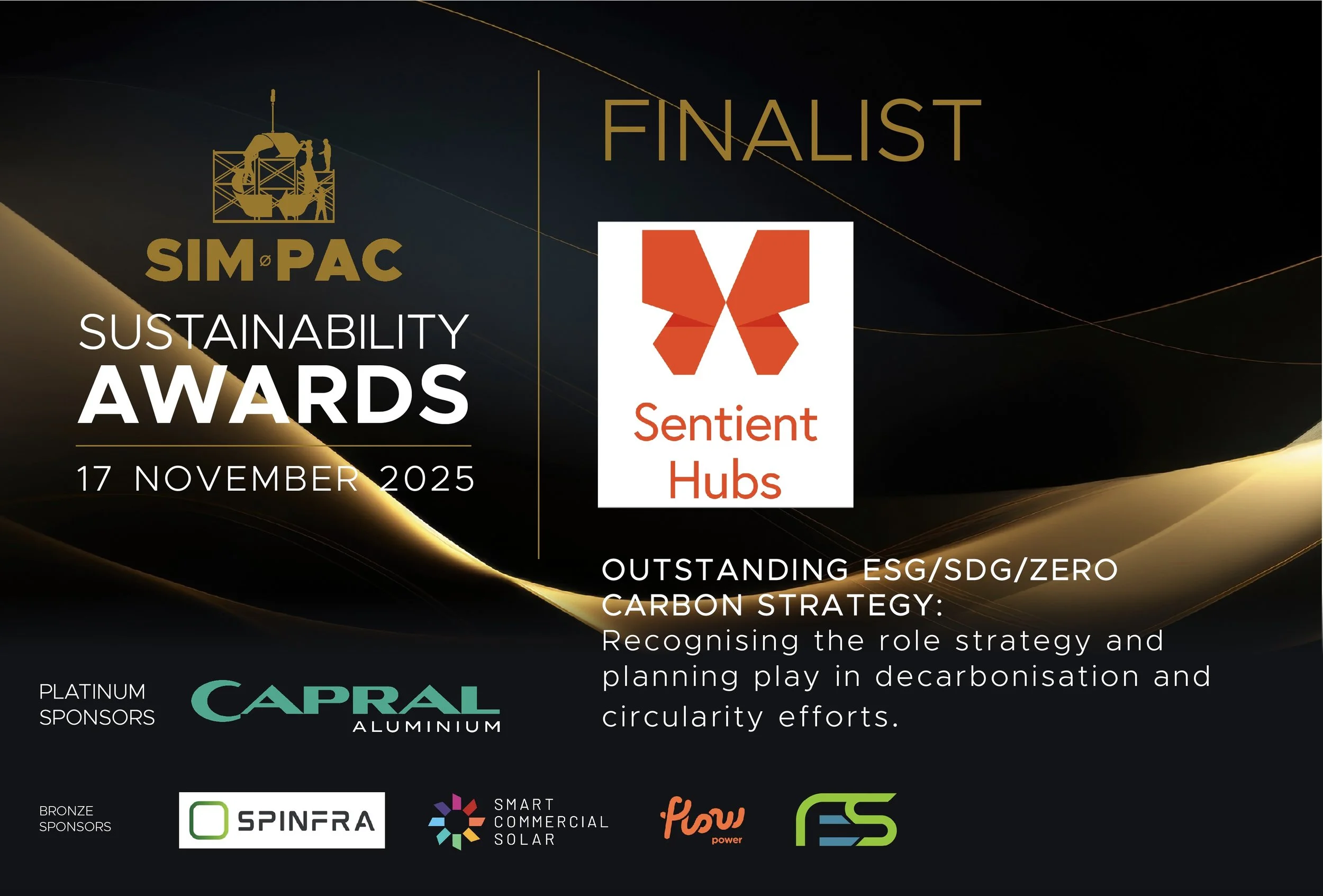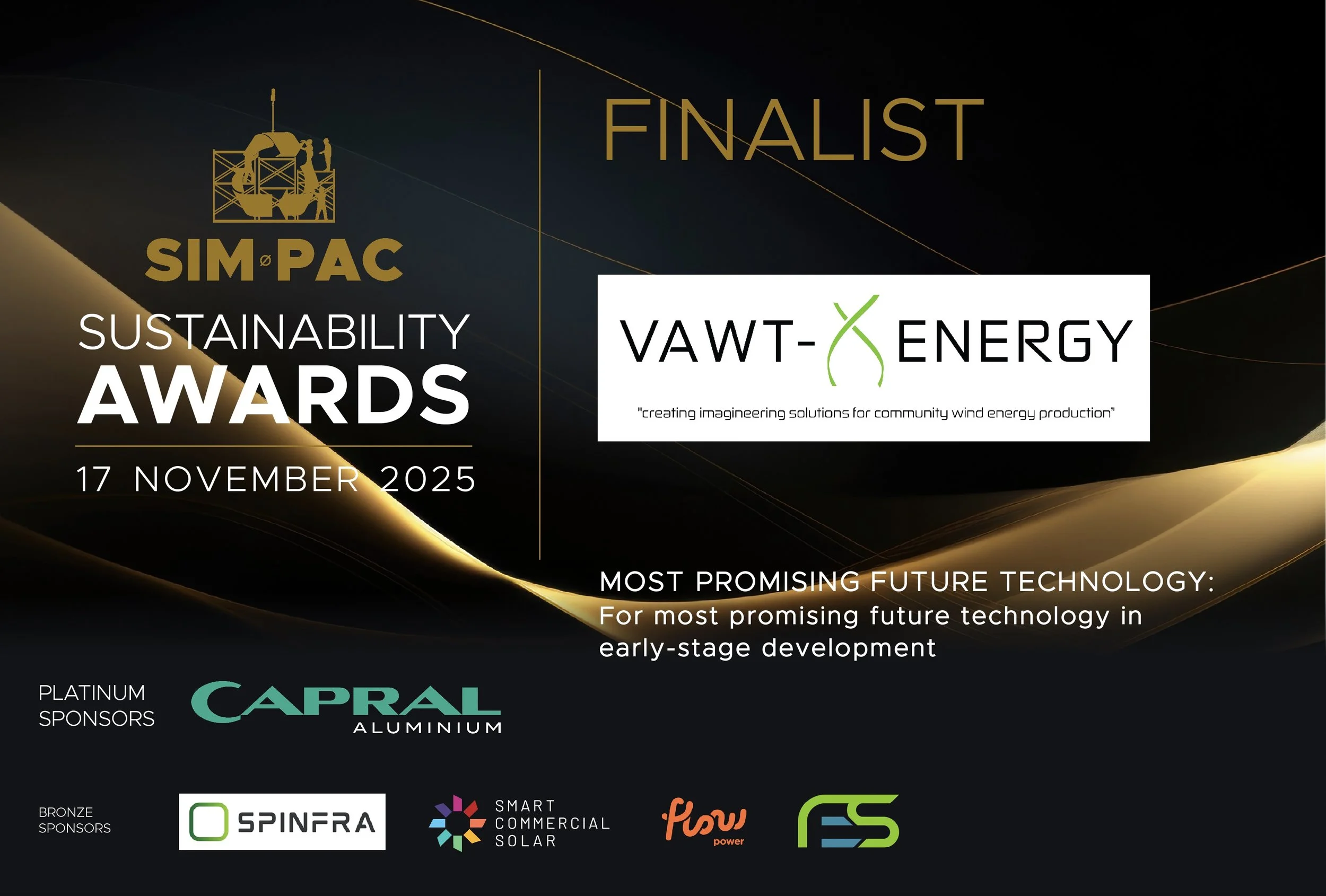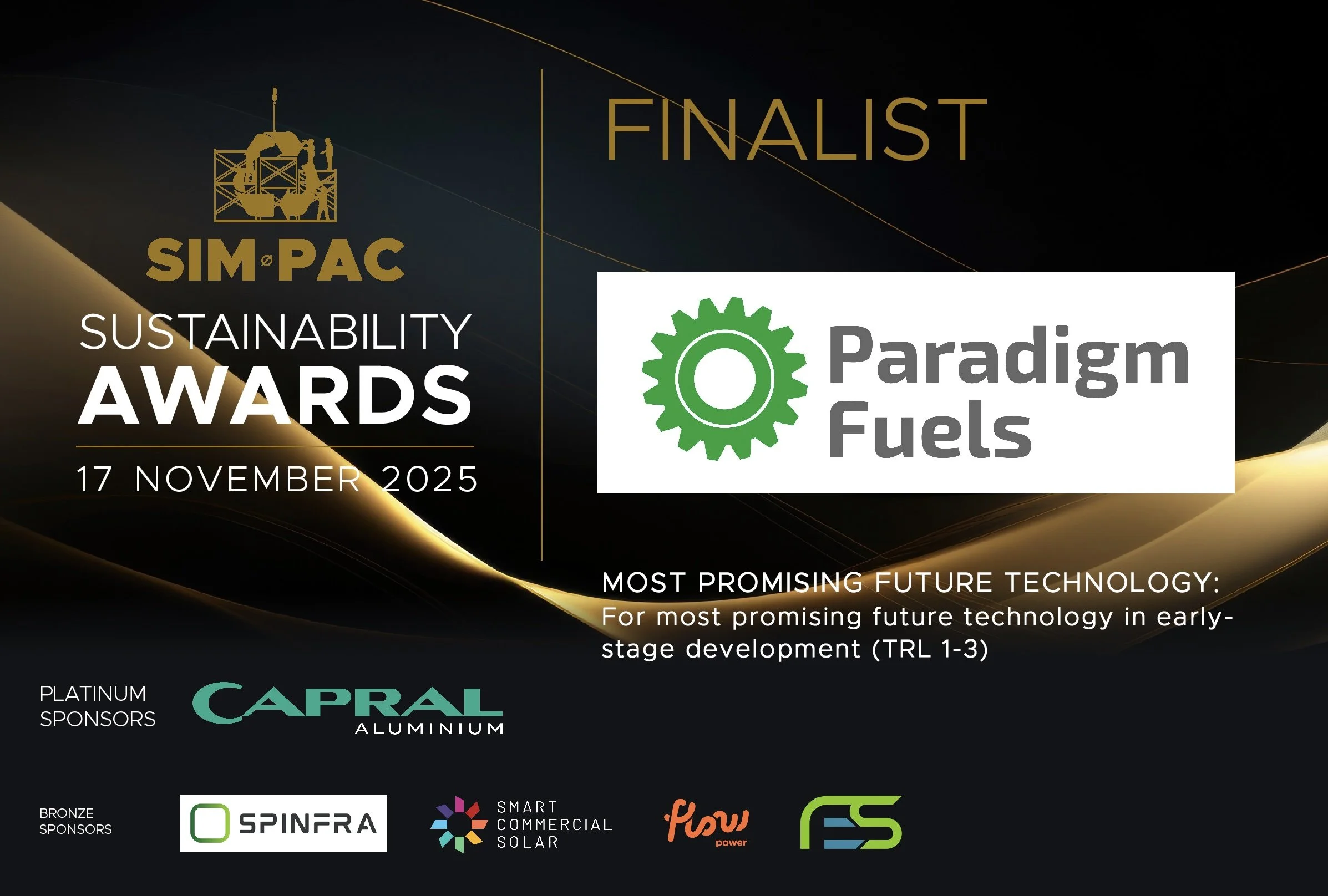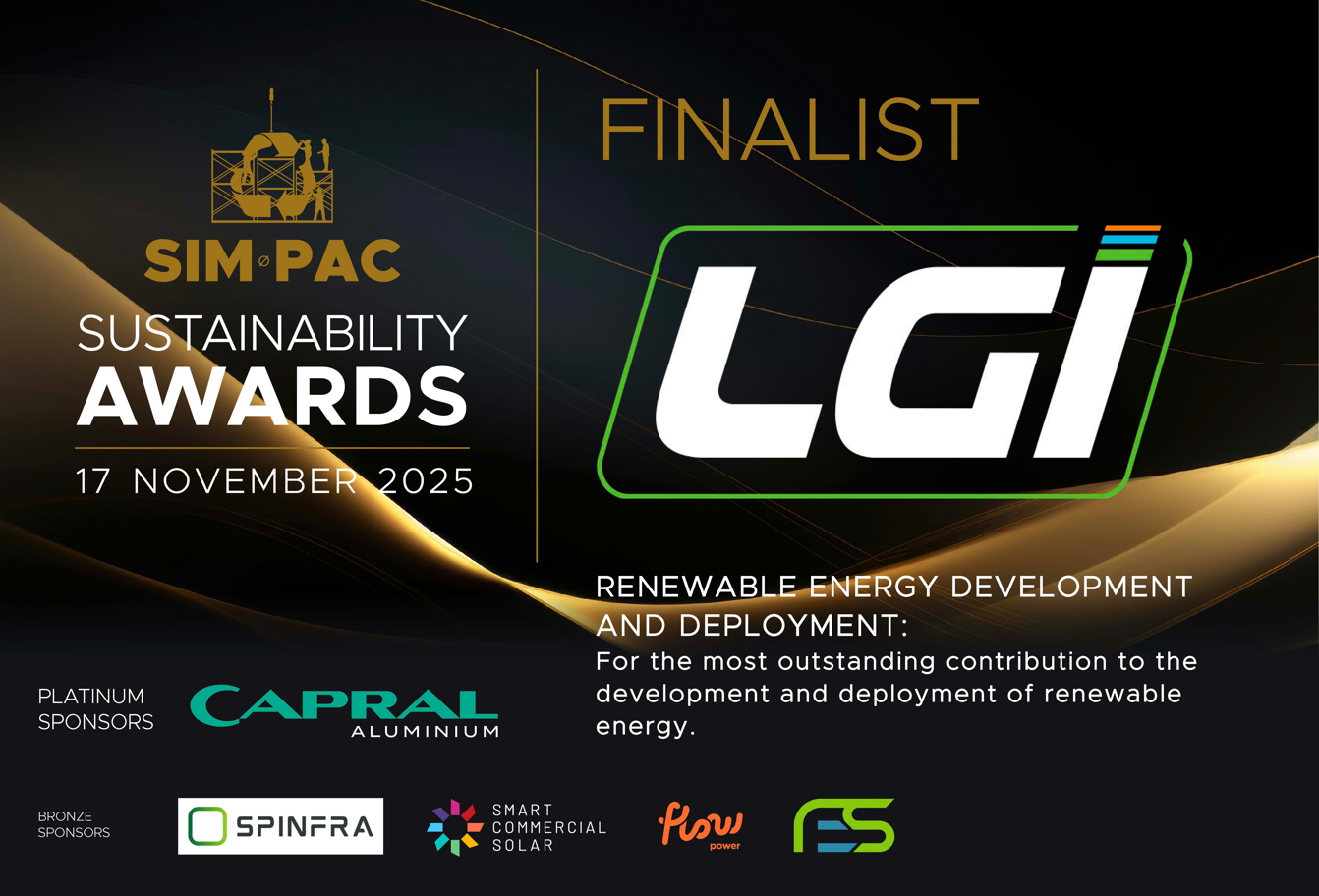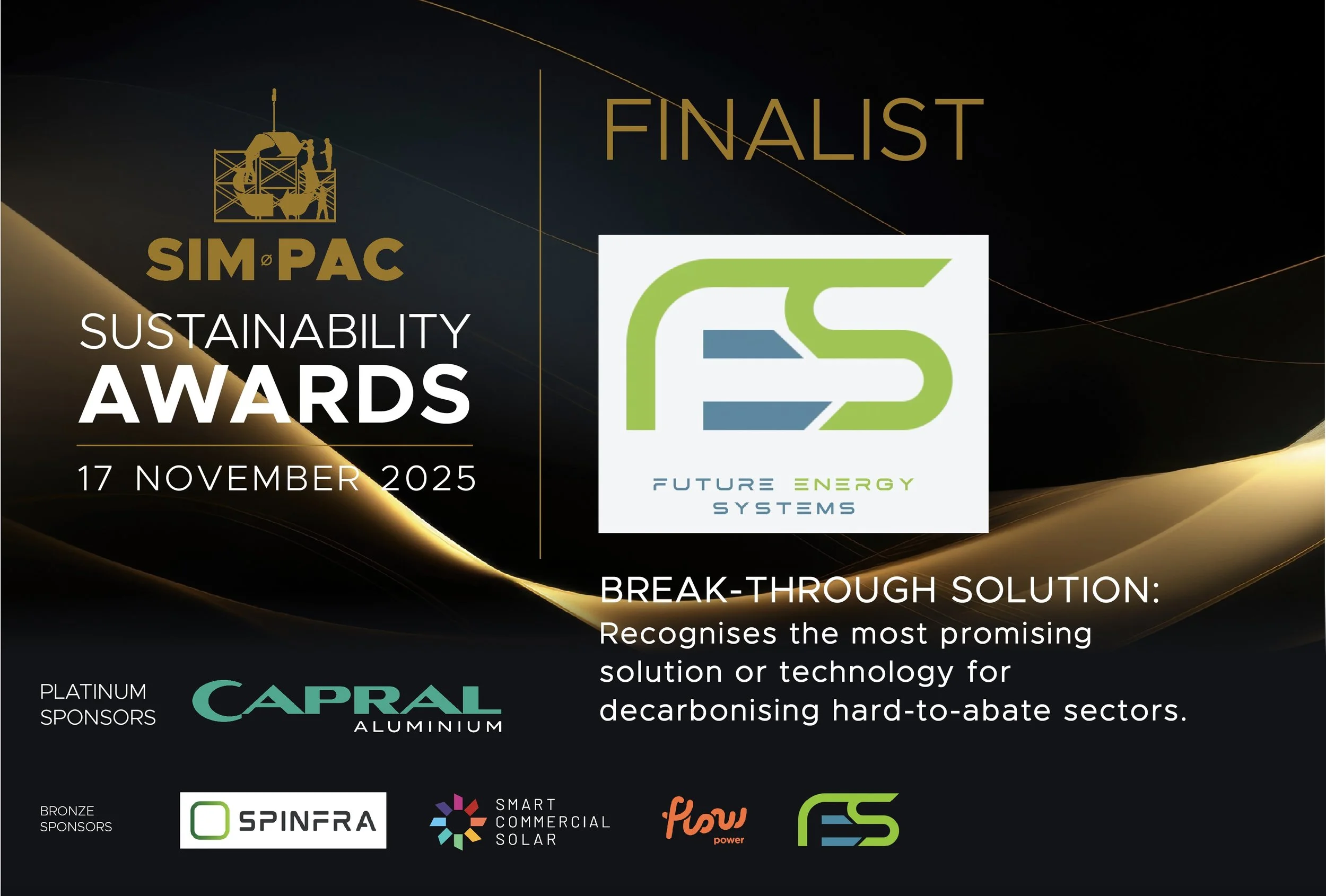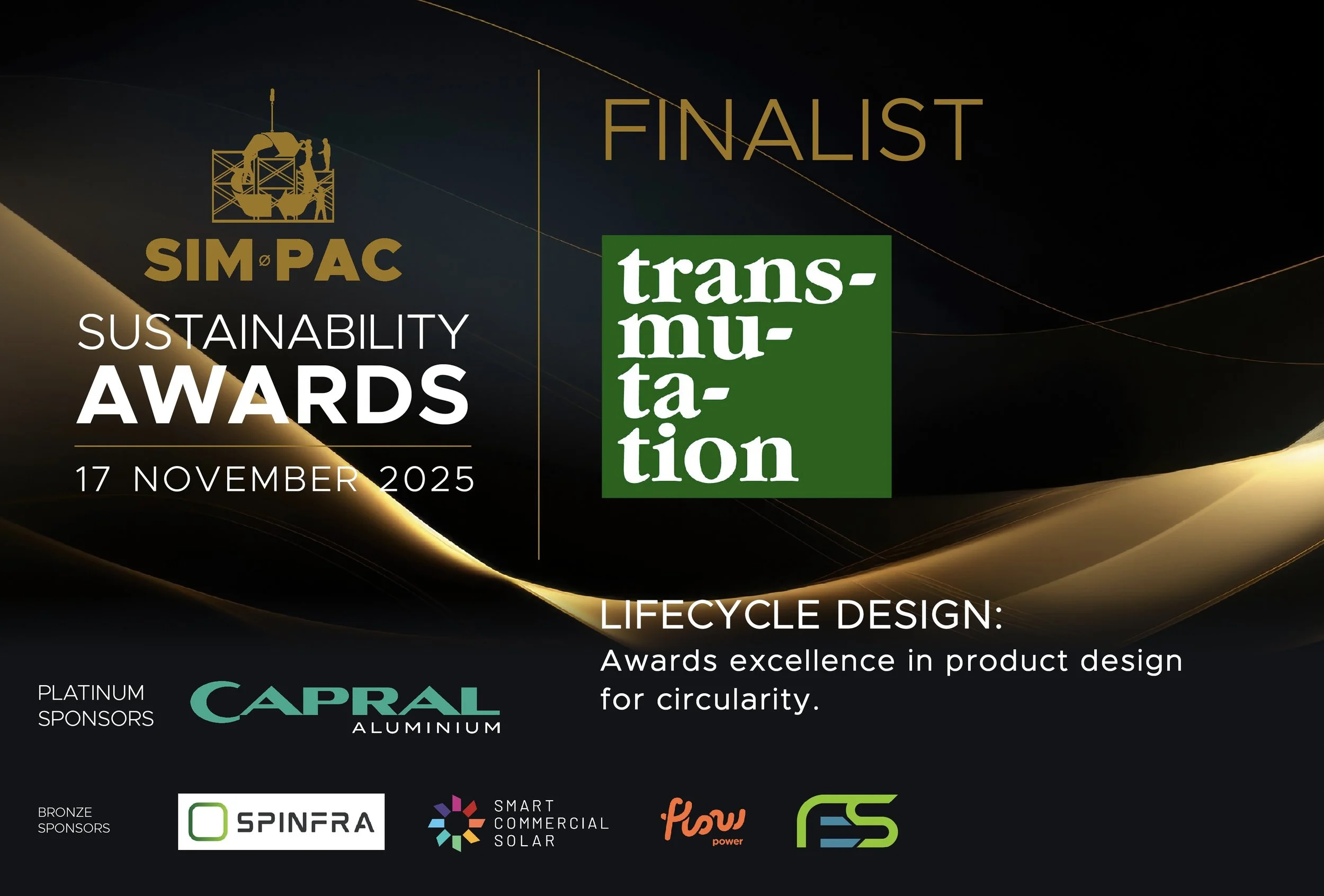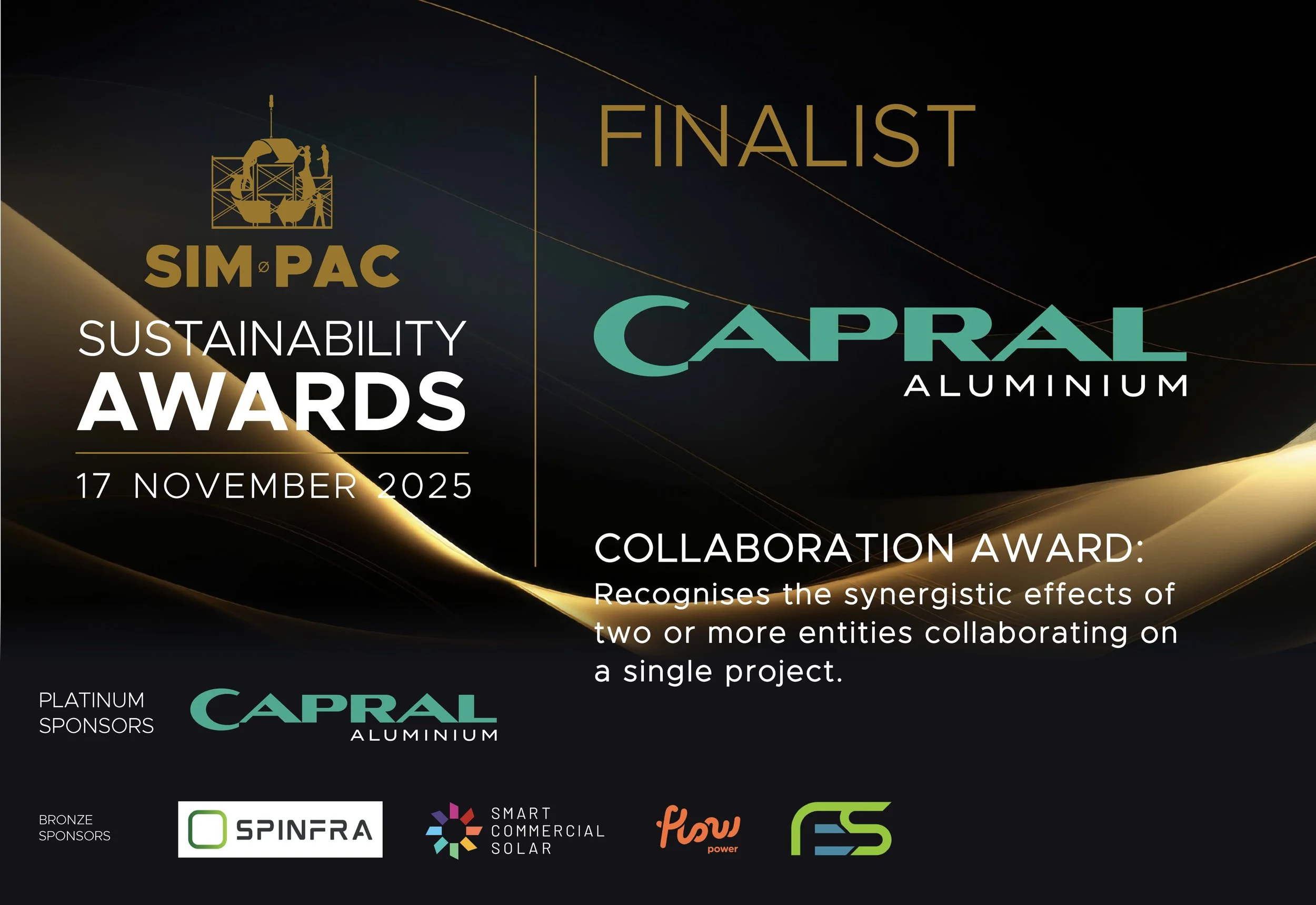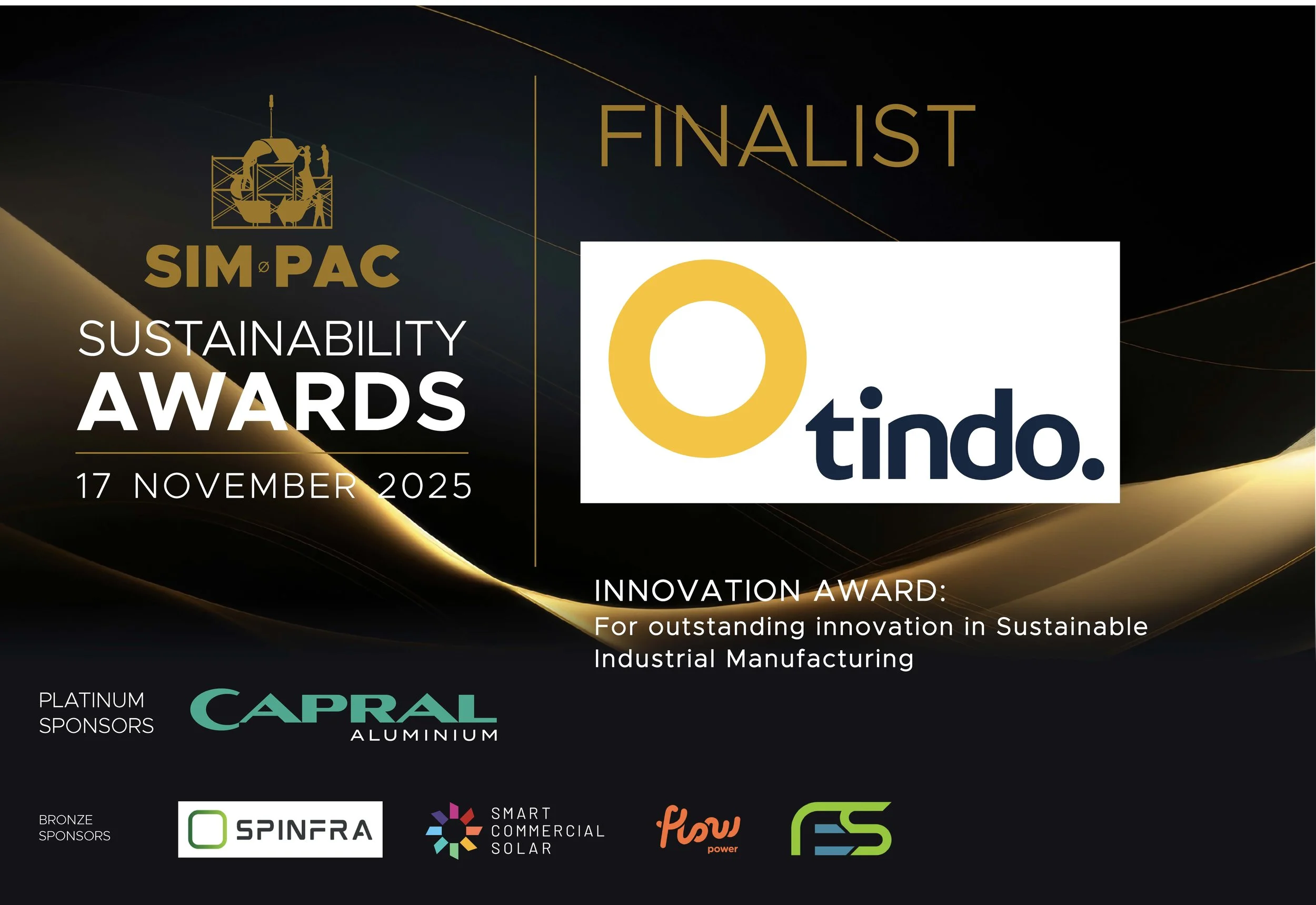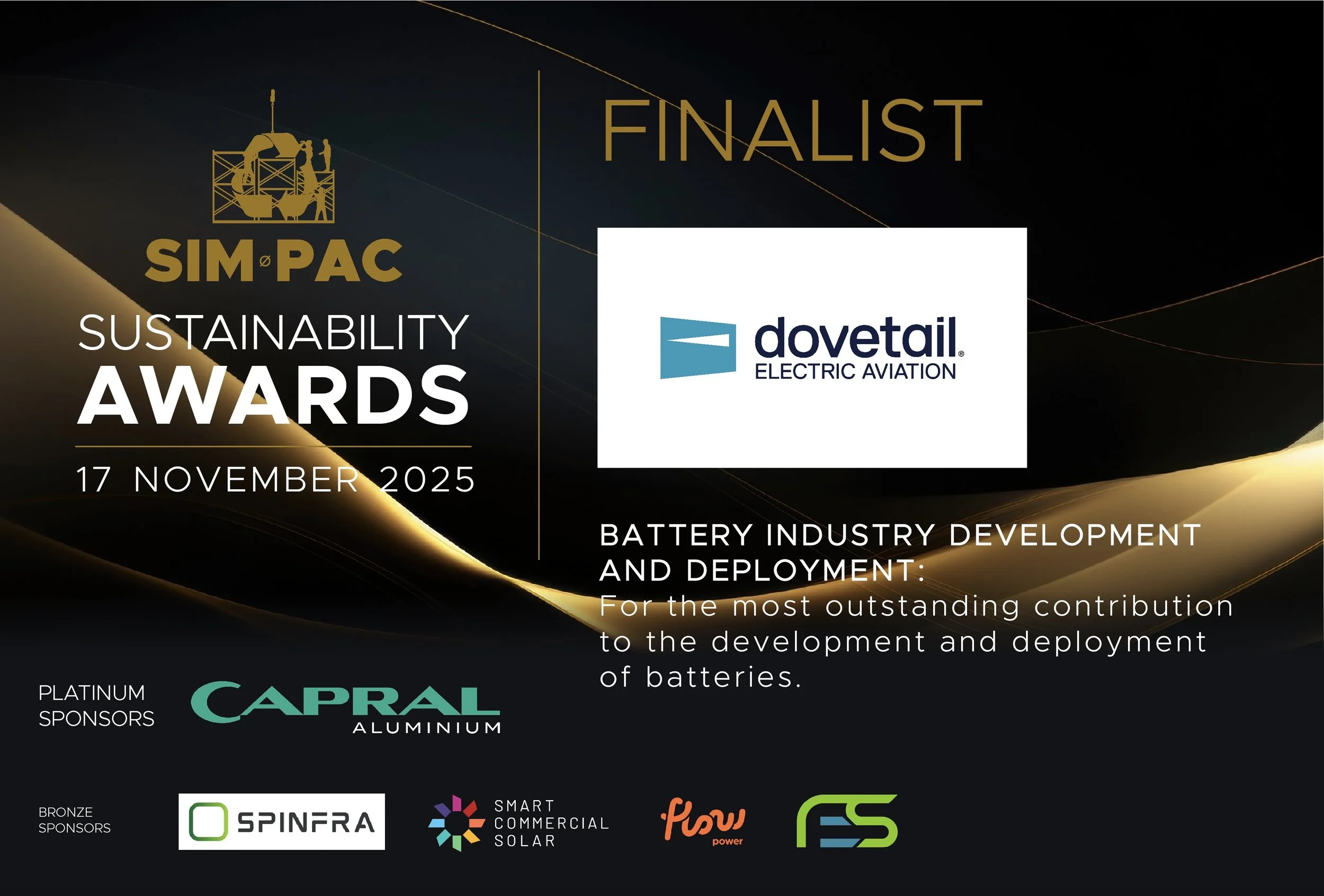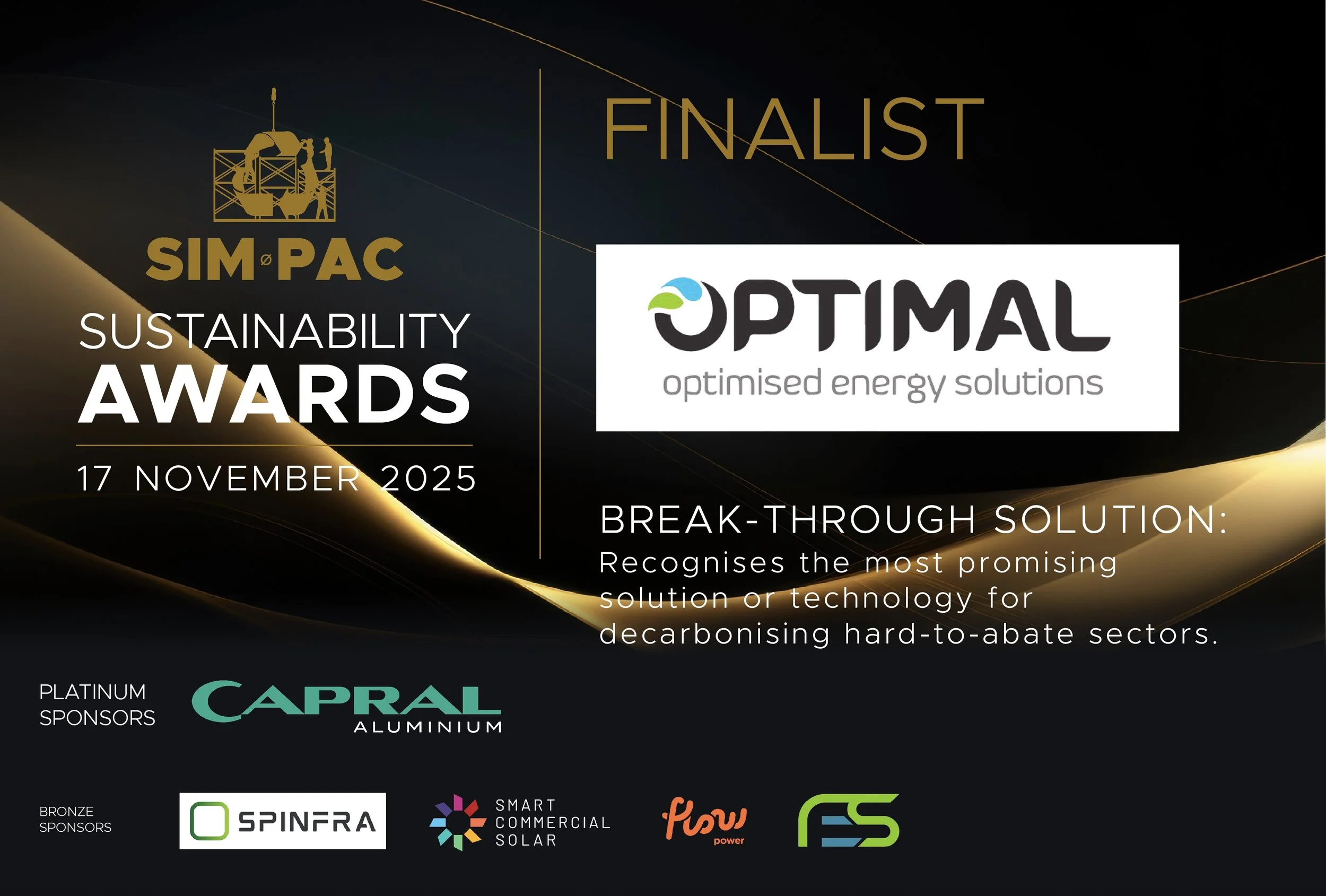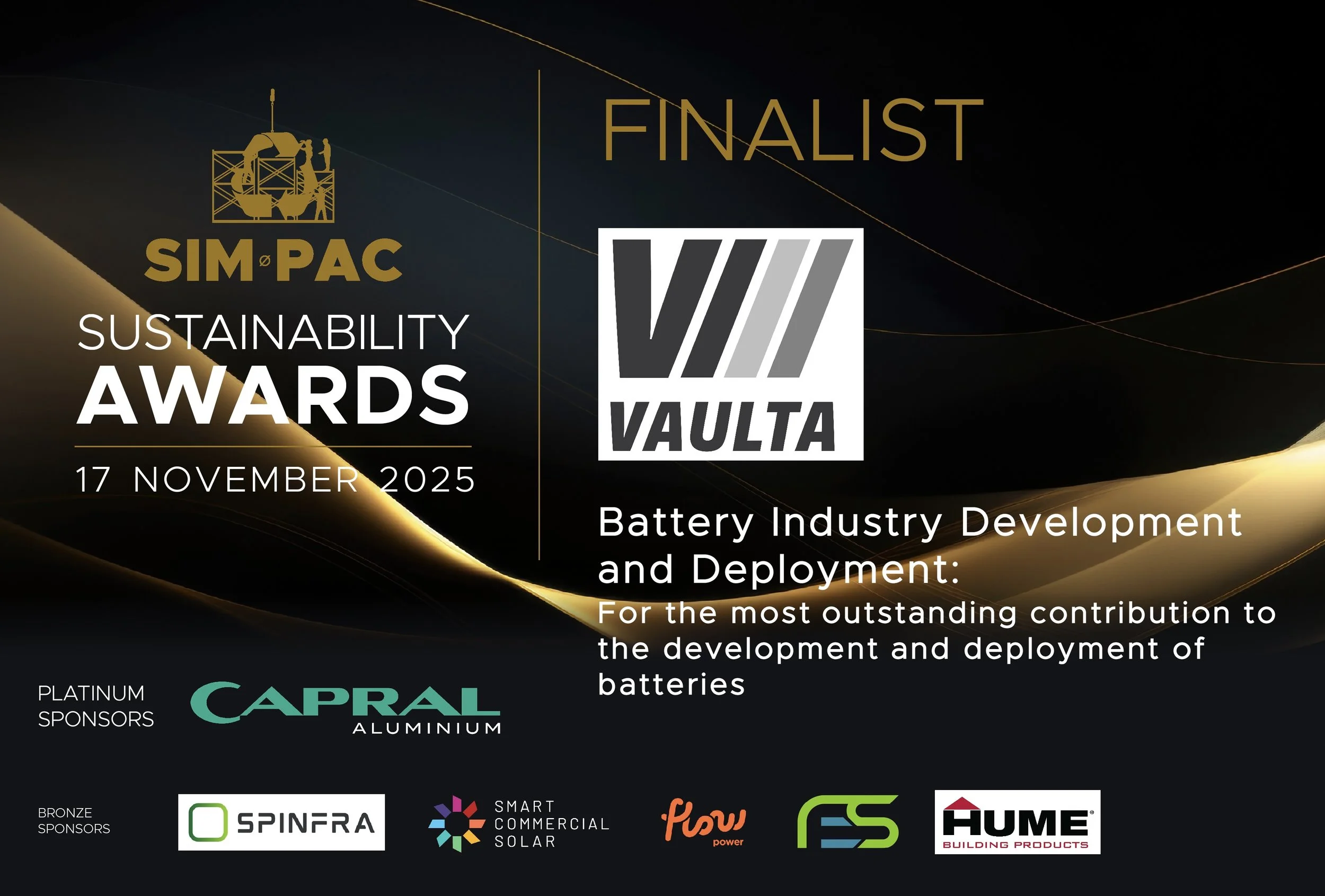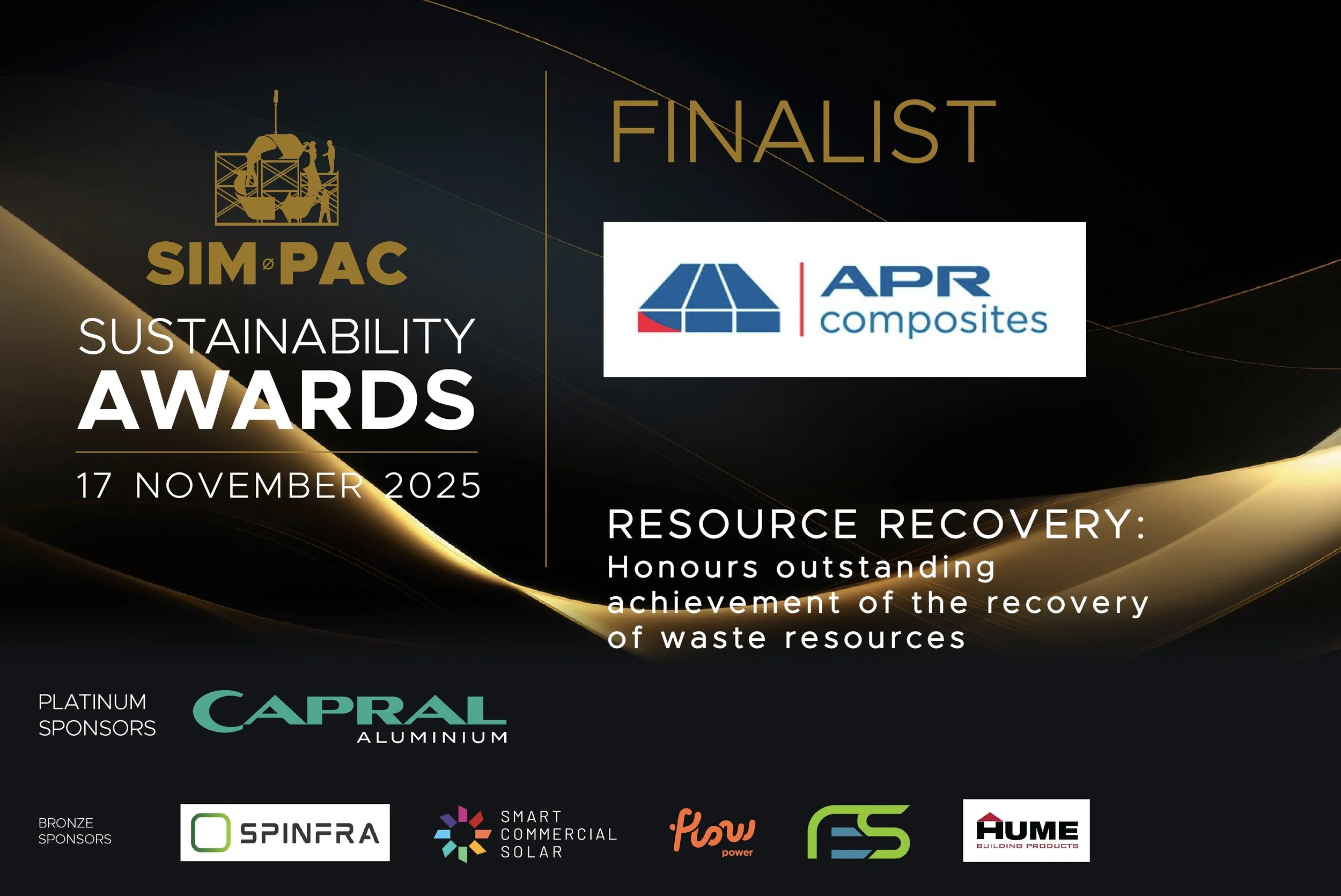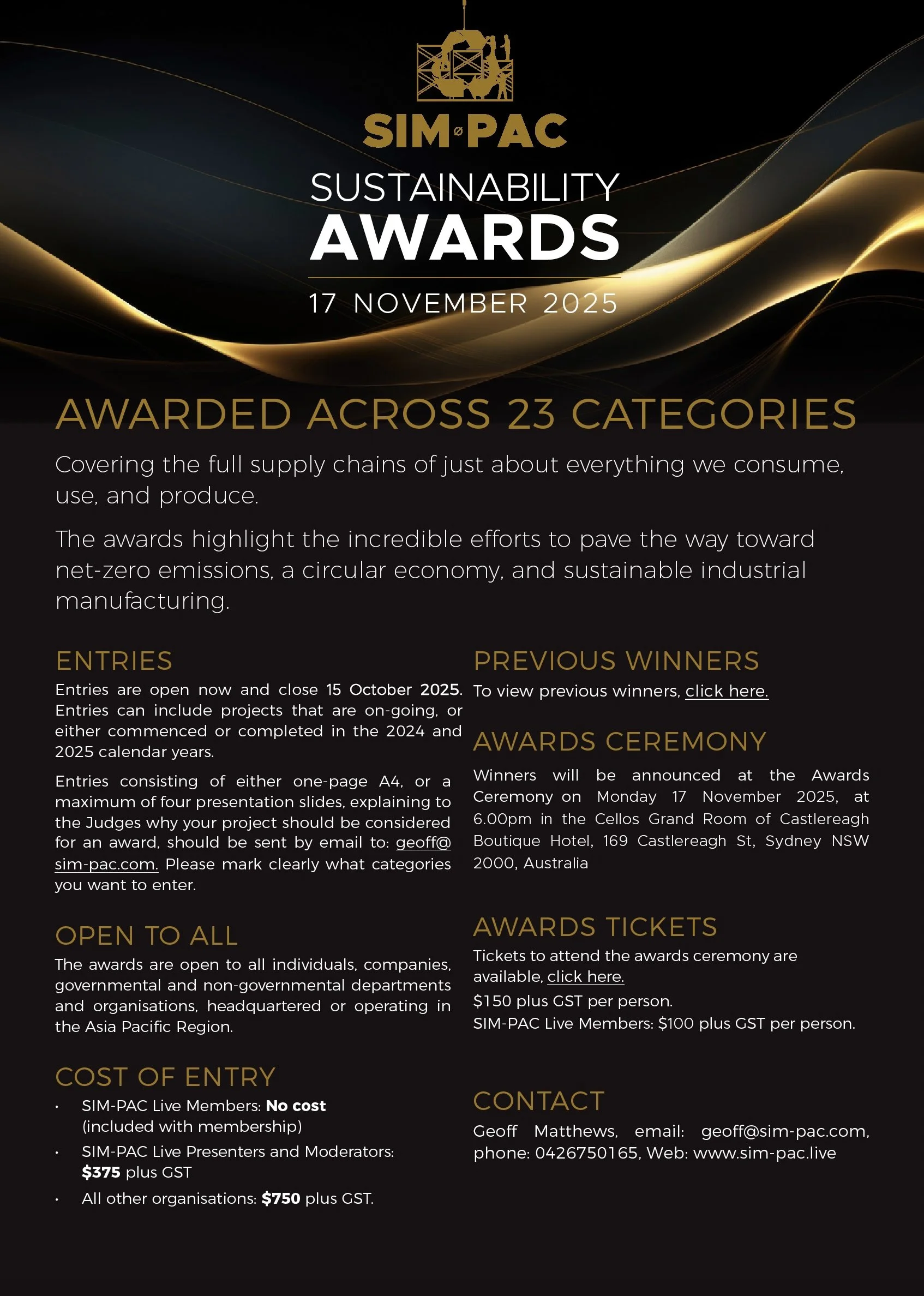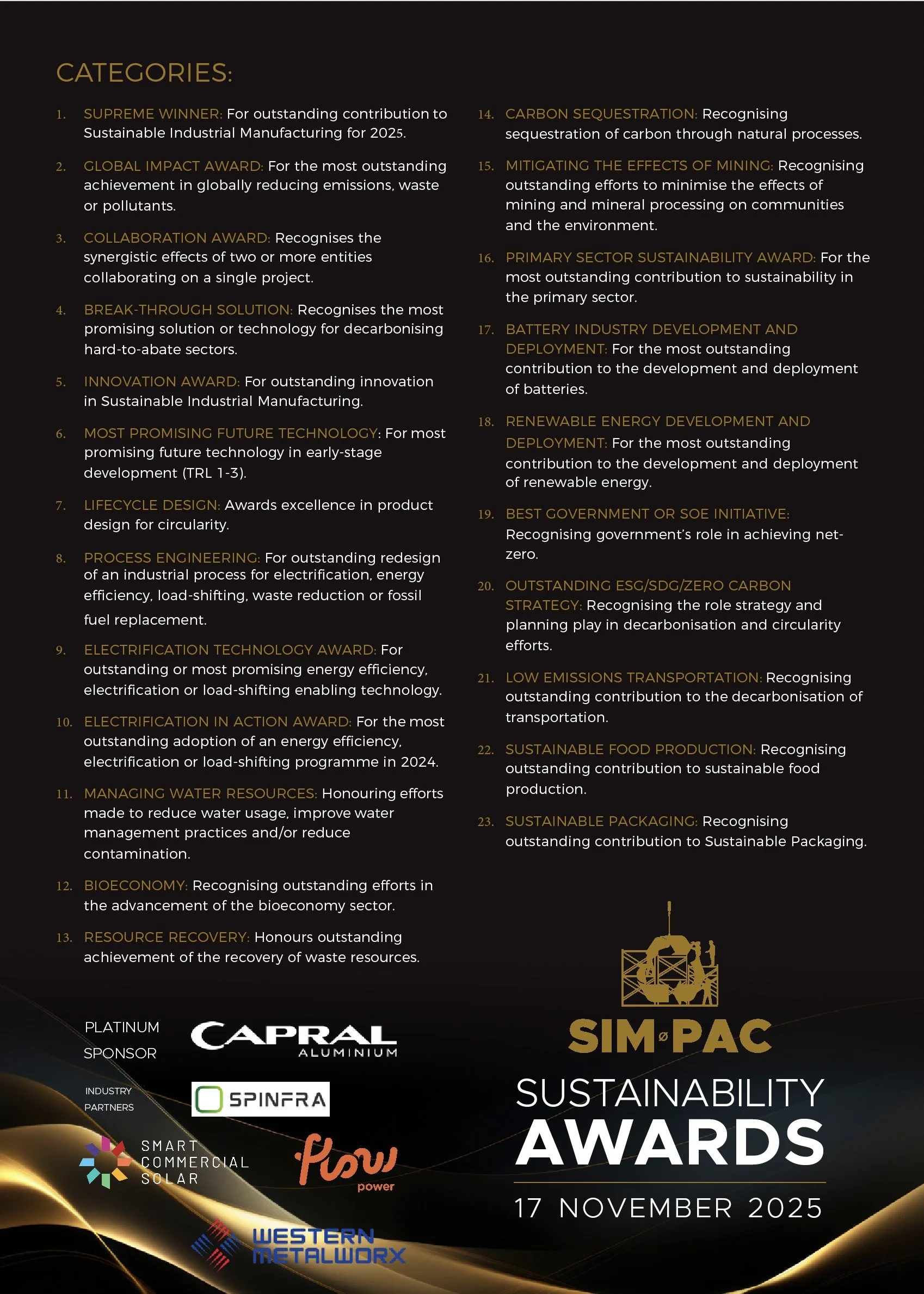SIM-PAC LIVE SUSTAINABILITY AWARDS 2025
The SIM-PAC Live Sustainability Awards honor the groundbreaking efforts of individuals, organizations, and governments across the Asia Pacific region who are leading the charge toward net-zero emissions, circular economies, and sustainable industrial practices. These awards recognize innovation, collaboration, and impactful solutions that address the pressing challenges of our time—from decarbonization and resource recovery to sustainable food production and beyond. As we unveil this year’s finalists, we celebrate the visionaries and changemakers whose work is shaping a more sustainable future for all.
2025 Winners







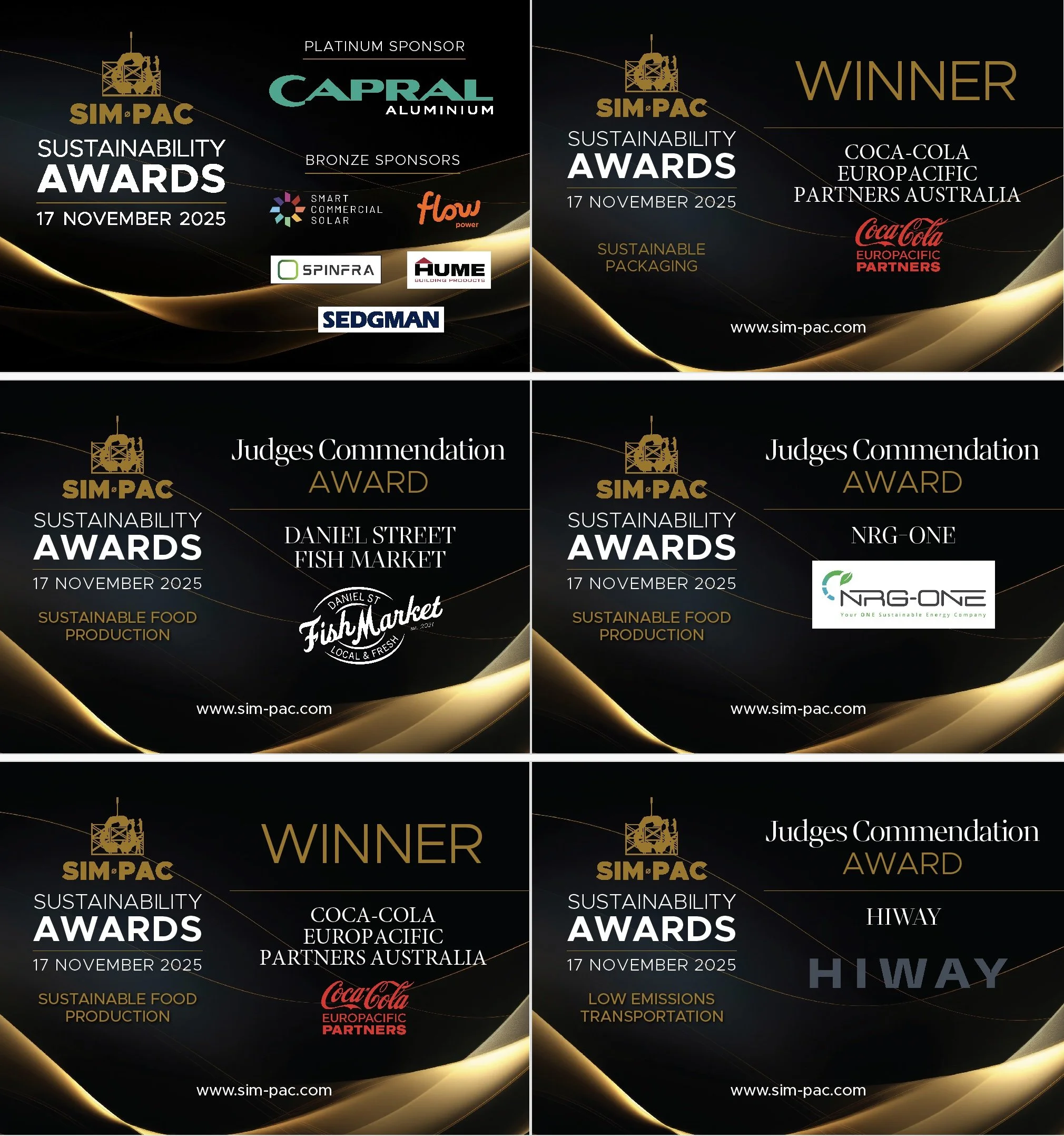


2025 Finalists
Sentient Hub’s unique platform enables strategic decision-making through real-time, cross-domain simulation. It supports organisations in understanding the interconnected impacts of environmental, infrastructure, and supply chain systems, offering clarity in an increasingly complex operating environment. Sentient Hubs’ selection as a finalist highlights the essential role of data-driven, scenario-based planning in achieving sustainable and resilient outcomes. Visit Sentient Hubs: https://www.sentient-hubs.com
VAWT-X is reimagining wind energy with vertical axis turbine systems designed for community-scale deployment. Their elegant and innovative design delivers reliable, decentralised renewable energy — even in low-wind environments — and empowers local communities to reduce emissions, lower energy costs, and build energy resilience. This promising technology is currently in early-stage development and demonstrates exciting potential for distributed wind generation in Australia and beyond.
Paradigm Fuels is a ground‑breaking engineering enterprise based in Western Australia, offering a novel, scalable bio-renewable fuel model tailored for Northern Australia. Their unique process enables ethanol and biodiesel production at approximately A$0.22/L, while being commercially viable, low‑infrastructure, and designed to exceed Australia’s 2030 emissions reduction targets. This model delivers strong economic returns for farms, creates regional employment opportunities, and paves a potential path to transform national transport and manufacturing sectors for a sustainable future.
Smart Commercial Solar has delivered a landmark hybrid solar and battery installation at IKEA’s Marsden Park Distribution Centre, setting a new benchmark for renewable energy integration in retail logistics. The project features a 951 kW rooftop solar system paired with a 1,165 kWh battery energy storage system, covering over 9,000 m² with more than 4,000 panels. With its seamless integration into a high-demand operational environment, this project demonstrates what’s possible when large-scale commercial facilities fully commit to clean energy leadership.
SIM-PAC Live is proud to announce Flow Power as a finalist for their Riverina Oils Bio-Energy Solar Farm project. Riverina Oils, one of Australia’s leading oilseed processors, partnered with Flow Power to implement a 3.3 MW onsite solar farm complemented by bioenergy generation. This hybrid renewable system significantly reduces the facility’s reliance on grid electricity, lowers operational emissions, and provides a cost-effective, reliable energy source to support continuous production. By integrating solar and bioenergy into an industrial-scale process, Flow Power has created a model for regional manufacturing sites to decarbonise while maintaining energy security. The project demonstrates the potential for tailored renewable solutions to transform energy-intensive sectors, combining environmental benefits with strong commercial outcomes.
LGI is a leader in landfill biogas-to-energy innovation, LGI partners with local councils and waste facility operators to turn harmful methane emissions into dispatchable renewable power — strengthening the grid and cutting greenhouse gas emissions. Their portfolio includes more than 26 operational sites across Australia, with standout projects such as: Eastern Creek, NSW – A 4 MW facility producing ~34 GWh of renewable electricity annually. Mugga Lane, ACT – An integrated landfill gas and battery storage system providing 24/7 clean energy. Toowoomba, QLD – Capturing 12.6 million m³ of biogas annually, generating electricity and creating 33,000 ACCUs. By transforming waste emissions into clean power and verified carbon credits, LGI delivers measurable environmental, economic, and community benefits.
FES is recognised for its community-centred renewable microgrid projects planned across five remote Fijian villages – Nanuca and Loa (Vanua Levu), Wairiki (Taveuni Island), and Dakuiloa and Waigori (Oneata Island). These projects represent a pioneering model for decentralised, scalable, and resilient clean energy solutions in the Pacific. By combining solar PV, battery storage, and localised grid infrastructure, FES enables communities to transition from diesel dependency to reliable renewable energy. This approach not only reduces emissions but also strengthens economic opportunity, health, and climate resilience for some of the region’s most vulnerable communities. This recognition highlights FES’s role in delivering innovative, inclusive, and replicable energy solutions for hard-to-reach geographies.
We are proud to announce Transmutation as a Finalist for their innovative products – PostPrime® Plastic Pellets and 50–65mm Concrete Bar Chairs – exemplify lifecycle design in action, with sustainability integrated from raw material sourcing through to end-of-life recyclability. Key achievements include: Publication of third-party verified EPDs with EPD Australasia 50–52% lower carbon emissions per unit compared to virgin plastic GECA certification and compliance with AS/NZS 2425:2015 standards Full recyclability, enabling reintegration into manufacturing cycles This recognition highlights Transmutation’s leadership in delivering tangible climate impact, advancing circular economy principles, and setting new standards for sustainable manufacturing in Australia.
Capral Aluminium, in partnership with Rio Tinto and Sims Metal, has been selected as a Finalist in the Collaboration Award category of the 2025 SIM-PAC Live Sustainability Awards. This partnership has established a closed-loop aluminium recycling system that remelts recovered post-production scrap into new extrusion billet (minimum 20% recycled content). The result is a significant reduction in energy use and carbon emissions, reduced reliance on virgin material, and a stronger, sovereign Australian supply chain. By aligning capabilities across collection and processing (Sims Metal), remelting and low-carbon metal supply (Rio Tinto), and extrusion and manufacturing (Capral), this collaboration demonstrates how industry partnerships can deliver circular economy outcomes at scale.
Tindo is Australia’s only manufacturer of solar panels, operating from its facility in Mawson Lakes, South Australia. Over the past year, the company has made significant strides in scaling up its operations and expanding into new markets, while maintaining a strong focus on quality and sustainability. Key publicly reported achievements include: Scaling up local manufacturing capacity – Tindo secured $34.5 million in funding through the Australian Government’s Solar Sunshot Program to expand its manufacturing output from 20 MW to 180 MW annually, introduce advanced automation, and prepare for potential gigawatt-scale production. International market expansion – The company signed a five-year, A$8.4 million export agreement to supply 15 MW of Australian-made solar panels to Vietnam’s renewable energy sector.
Dovetail is pioneering the electrification of regional aviation with its retrofit approach—converting existing aircraft into zero-emission battery-electric and hydrogen-electric planes. A key part of this innovation is the DovePack battery system, which uses immersion cooling to keep every cell at a stable temperature. This is a major breakthrough for aviation: unlike conventional cooling, immersion cooling dramatically reduces fire risk, increases energy density, and improves overall safety. It enables batteries to deliver the power and reliability required for flight, while also extending battery life and lowering maintenance costs.
Optimal Group has been recognised for its outstanding achievements in pioneering renewable gas, pyrolysis (ECHO2), and negative emissions technologies, integrating energy storage, microgrids, and sustainable EPC project delivery. With more than 60 installations across Australia, New Zealand, and the Pacific, Optimal Group is advancing industrial decarbonisation through renewable gas, energy storage, and negative emission technologies. Optimal Group is delivering a suite of pioneering renewable energy solutions that are transforming industrial energy systems across Australia, New Zealand, and the Pacific.
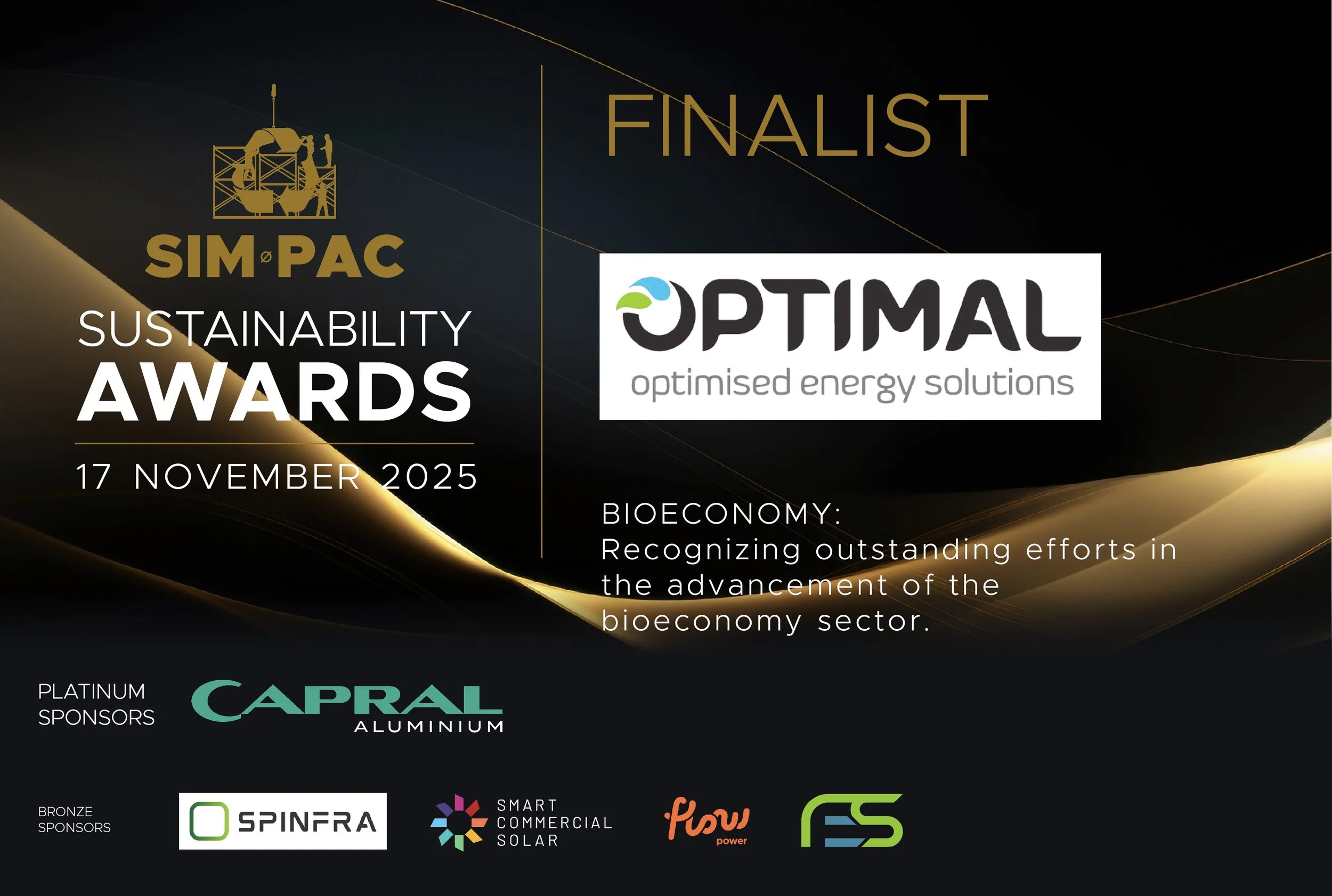
Optimal Group is pioneering Australia’s transition to a circular, carbon-negative bioeconomy through the integration of renewable gas, bioenergy, and carbon-capture technologies. By transforming agricultural residues, biosolids, and organic waste into renewable biogas, biochar, and clean heat, Optimal is closing the loop between energy, waste, and agriculture — creating regional energy security and long-term carbon storage. Their modular ECHO2 pyrolysis systems and biogenic energy platforms demonstrate how industrial innovation can align with natural systems to deliver measurable decarbonisation, soil restoration, and economic resilience. This work represents one of Australia’s most advanced examples of the bioeconomy in action — turning waste into value and proving that sustainability and profitability can coexist. Learn more about Optimal Group’s work: https://optimalgroup.com.au/ See the full list of 2025 Finalists: https://www.sim-pac.live/2025-awards Congratulations to the team at Optimal Group Australia — a leader in renewable gas and the circular bioeconomy.
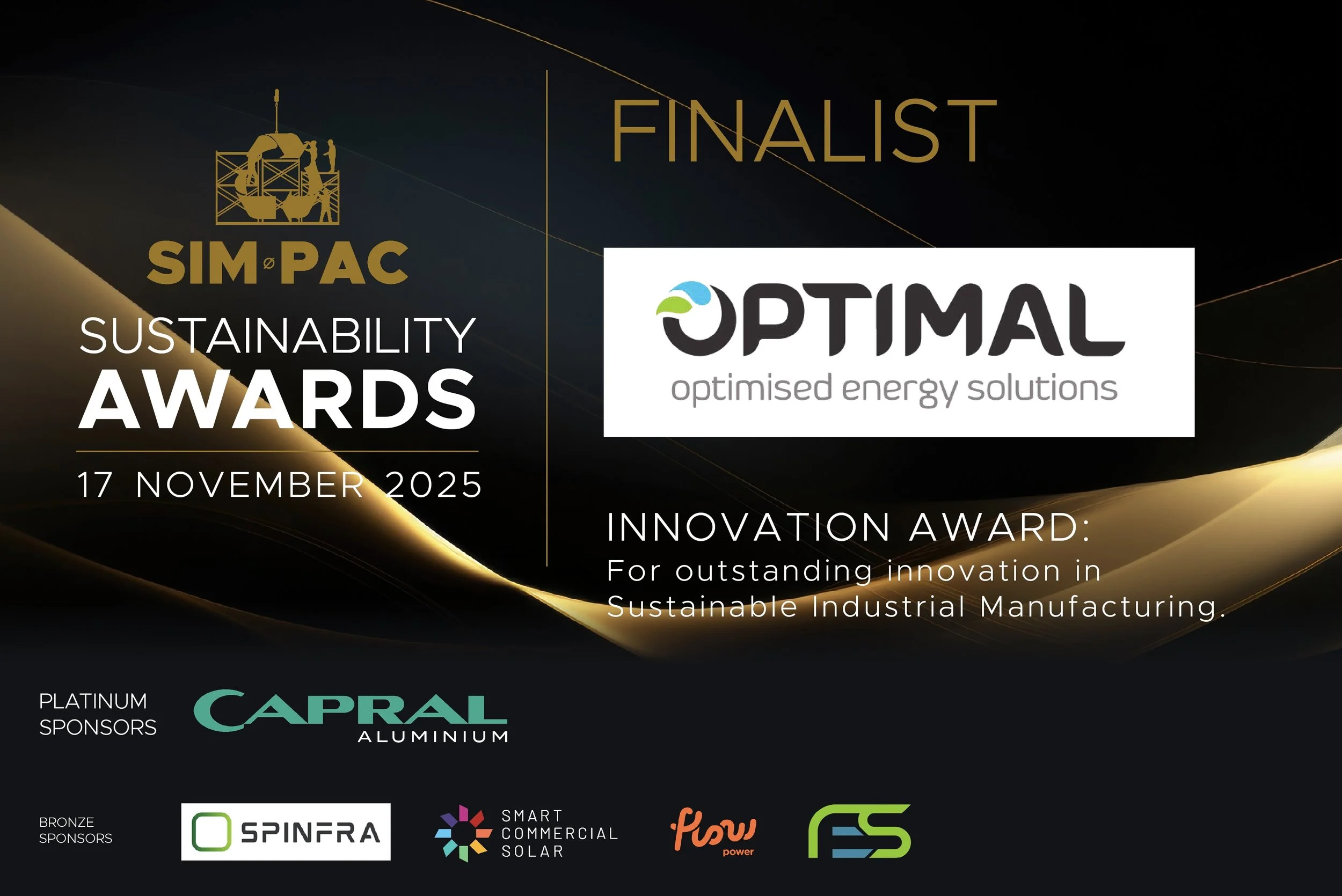
Optimal Group is redefining industrial innovation by integrating renewable gas, microturbines, biochar/pyrolysis systems, and CO₂ reuse into turnkey, high-performance energy solutions. Their model combines EPC delivery, advanced generation technology, and circular carbon engineering to enable industry to decarbonise without sacrificing reliability or productivity — translating sustainable engineering into real projects on the ground.
At the heart of this recognition is Rivercyclon®, Rivertex’s mono-polymer, fully recyclable polypropylene fabric. Engineered for circularity, Rivercyclon® eliminates mixed materials and toxic additives, enabling recyclability across global polypropylene recovery streams. Beyond recyclability, Rivercyclon® delivers measurable environmental benefits, production reduces water use by up to 76%, energy use by ~67%, chemical inputs by ~90%, and CO₂ emissions by up to ~40%. Combined with durability, light weight, and high performance, Rivercyclon® represents a scalable solution for cutting textile waste and carbon emissions.
Vaulta is redefining what sustainable battery technology looks like—delivering innovations in design for disassembly, lifecycle traceability, and international scaling. Achievements in the past 12 months include the the Vaulta Dashboard, integrating AI and machine learning to track battery health, performance, and lifecycle—supporting diagnostics, second-life use, and recycling. With Circular Design and by combining advanced engineering with circular economy principles, Vaulta is helping accelerate the deployment of clean energy storage—vital for grid stability, renewable integration, and the global energy transition.
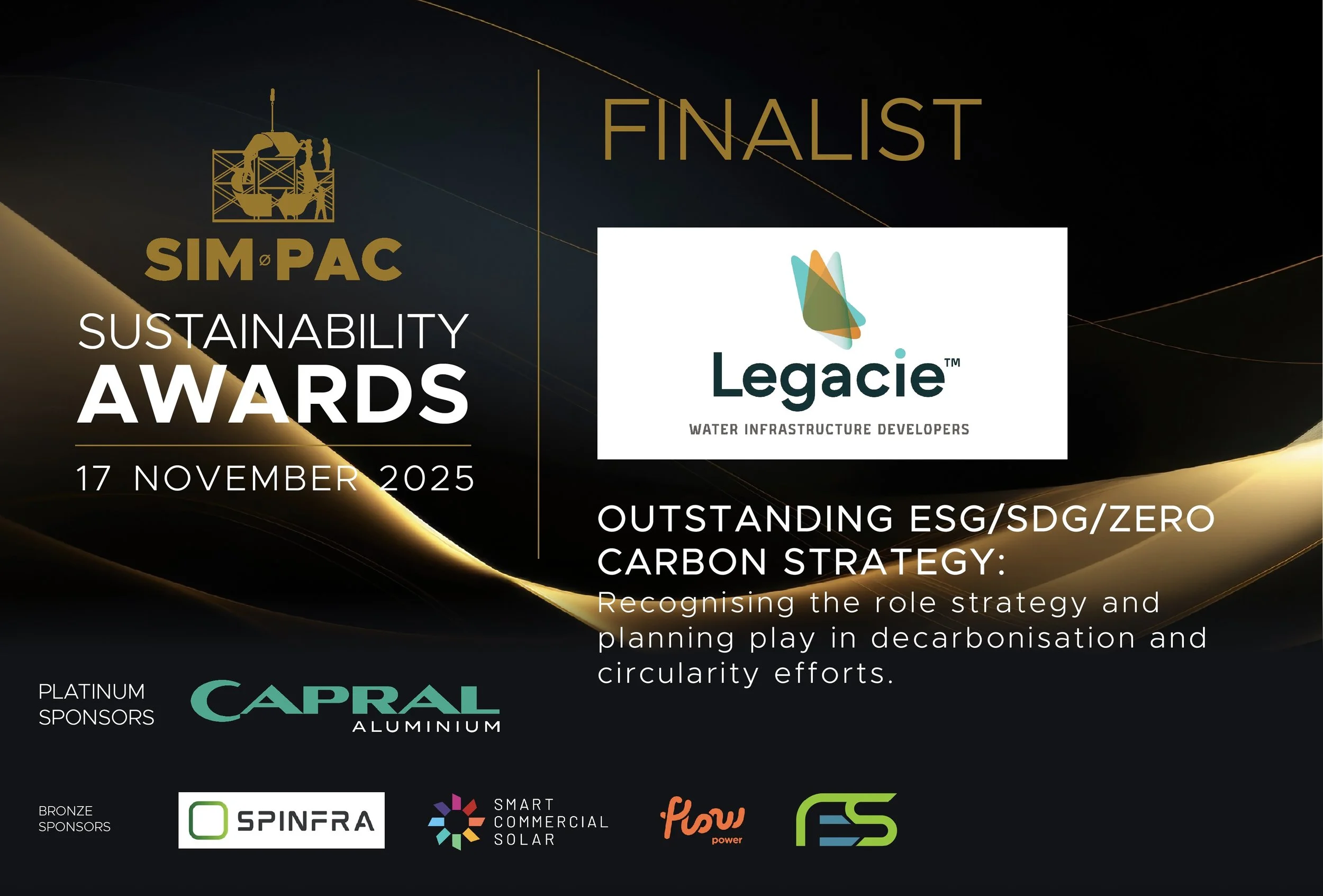
Legacie has developed the strategy, preliminary business case and order of magnitude study for the Ngarluma Water Desalination Project, Australia’s largest privately developed seawater desalination project. The project delivers significant environmental outcomes for the region by providing an alternative to precious groundwater resources, it will provide an option for delivery of clean potable water for communities and bulk water for industry, and importantly a critical source of supply for decarbonisation initiatives including green iron and green steel. This recognition highlights Legacie’s leadership in strategy and planning for sustainable, inclusive infrastructure, with strong engagement with key stakeholders including the First Nations communities, the State and Federal Government, the local community and industry.
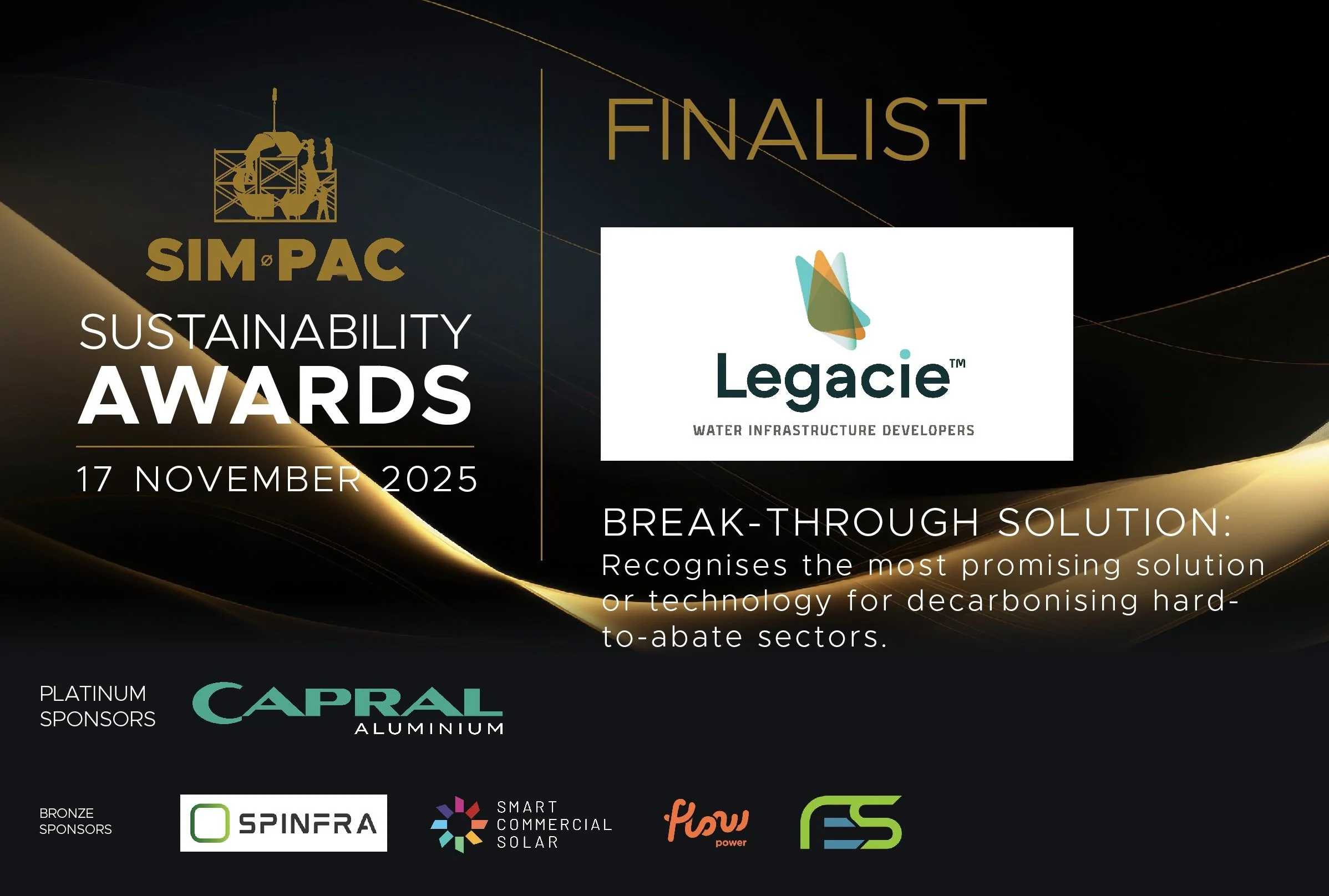
Legacie is reframing how Australia thinks about industrial water access — shifting from closed, proprietary models to scalable, common-user solutions that unlock regional growth, industry establishment and future decarbonisation pathways. In a country where water constraints directly define where industry can or cannot exist — Legacie represents a new enabling architecture for sustainable industrial development: open, shared, replicable, and designed to support a future net-zero economy.
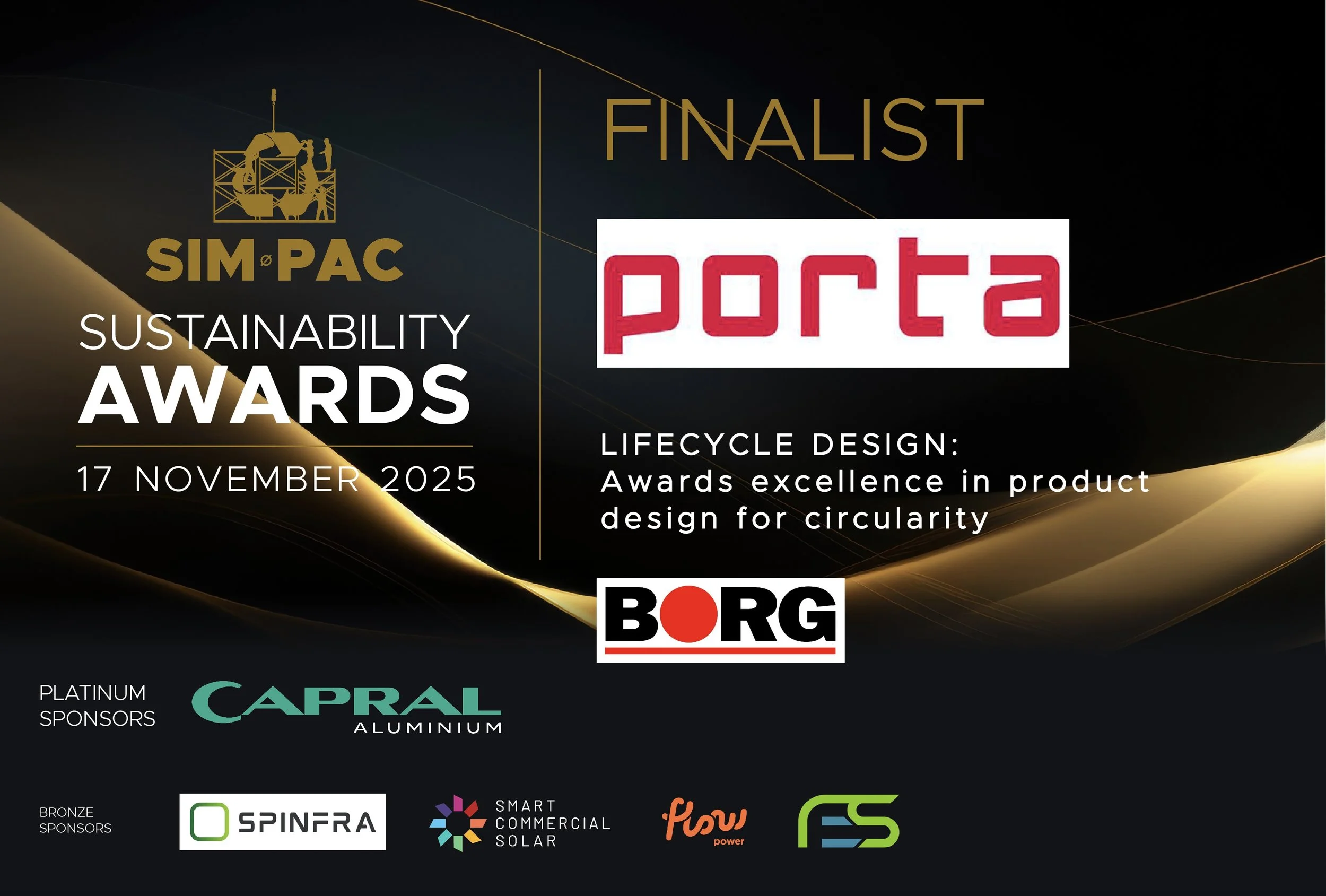
Porta is leading the way in circular product design—transforming urban wood residues such as particleboard, timber offcuts, pallets, and frame and truss timber into new high-quality particleboard. This circularity journey ensures valuable materials remain in use while meeting rigorous strength, quality, and traceability standards. Key highlights of Porta’s sustainability leadership include: Responsible sourcing: PEFC™, Responsible Wood, and FSC-certified timbers. Healthy buildings: Global GreenTag certified products ensuring safe indoor environments. Renewable energy: Biomass heat, more than 47,000 solar panels, and onsite batteries powering facilities. Water and waste efficiency: Advanced recycling systems reducing landfill impacts. Porta is redefining lifecycle design in building materials and helping deliver a low-carbon, circular economy.
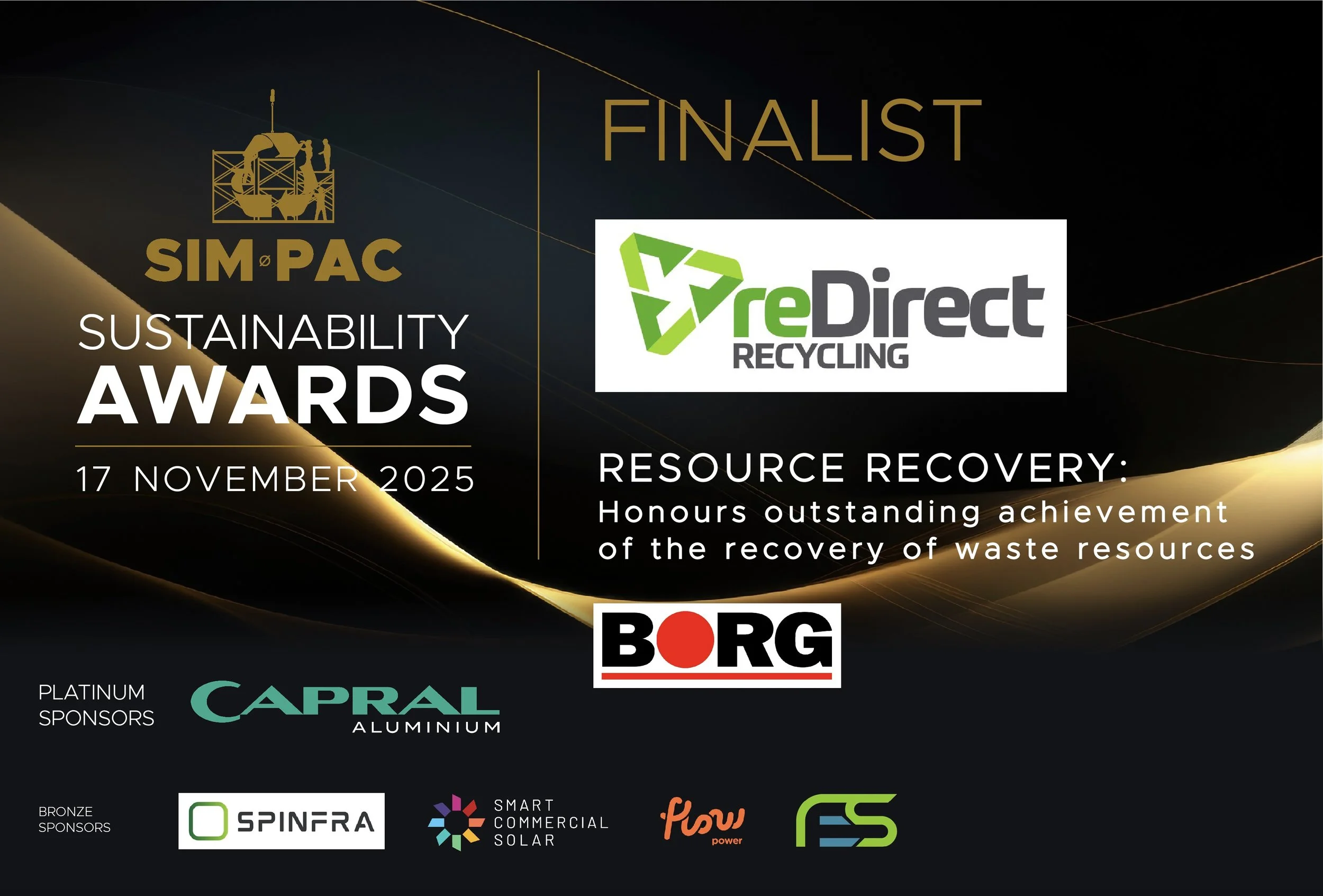
reDirect Recycling is helping reshape Australia’s resource recovery sector by diverting valuable waste streams from landfill—including timber, metals, drill mud, liquids, and industrial residuals—and creating new material cycles that directly support manufacturing and construction. Key highlights include: Over 1000 customers engaged in collection programs across NSW. Wood recovery for circularity: Supplying Porta with recovered timber for recycled-content particleboard. Drill mud processing: Converting slurries into engineered fill products, reducing reliance on virgin materials. Integrated logistics: Operating a large bin fleet and facilities that streamline recycling processes. By creating closed loops across diverse industries, reDirect Recycling is driving circularity, reducing landfill, and ensuring valuable resources are put back to work.
Carbon 8 is pioneering a regenerative model for Australian agriculture—helping farmers rebuild soil carbon, restore biodiversity, strengthen water cycles, and create resilient food systems. Their initiatives combine: Regenerative agriculture at scale, Soil carbon verification innovation, Indigenous partnerships and National awareness campaigns, like National Regenerative Agriculture Day. Carbon 8 demonstrates that agriculture can be not only sustainable, but regenerative—restoring ecosystems while building farmer resilience and contributing to Australia’s net-zero future.
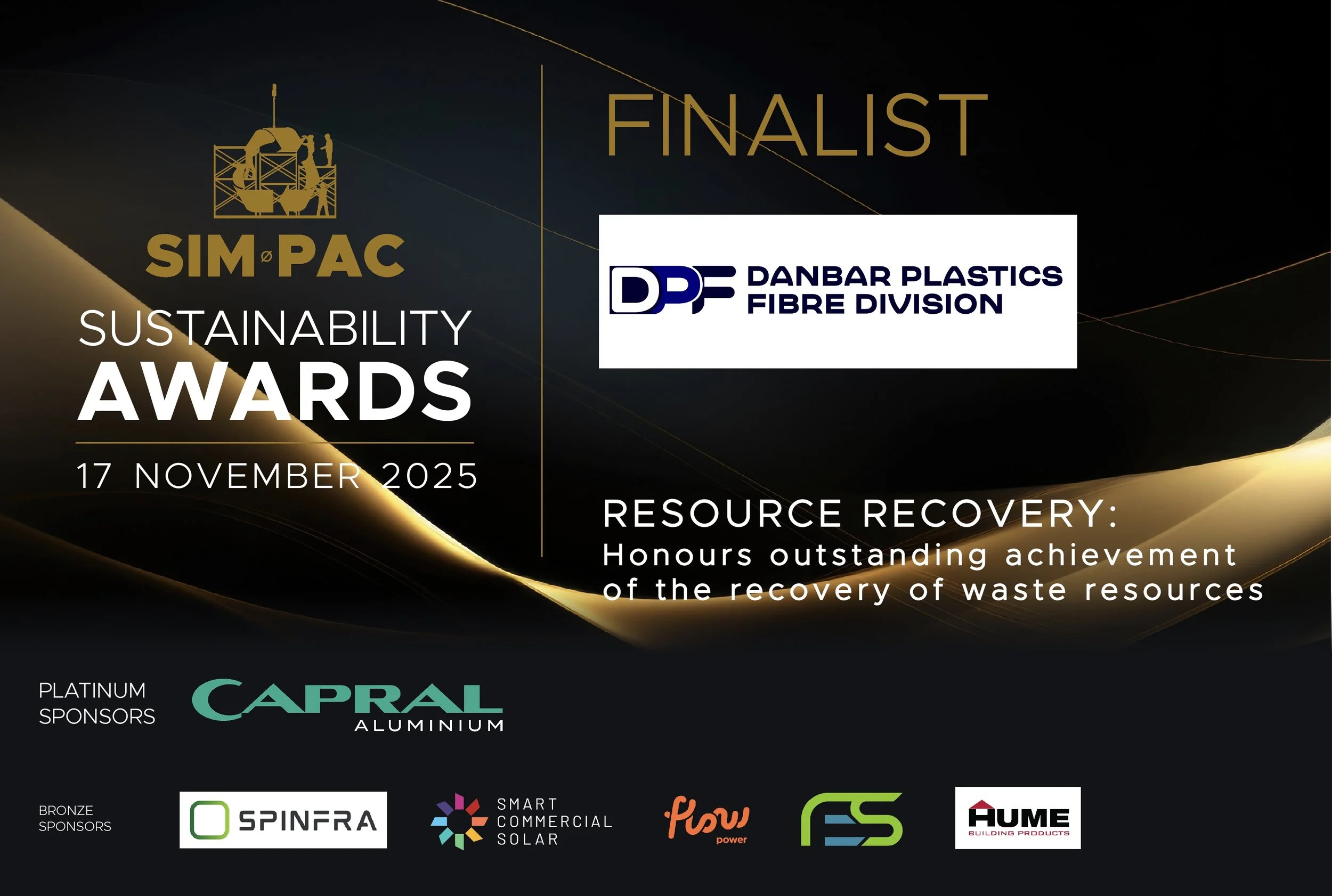
Danbar’s RePoly RF47 project demonstrates outstanding innovation and measurable impact in resource recovery and low-carbon infrastructure. By transforming post-consumer plastics into high-performance construction fibre, RePoly RF47 replaces steel mesh in non-structural concrete applications such as footpaths, bikeways, and carparks — reducing embodied carbon, improving installation safety, and creating meaningful social inclusion outcomes. Congratulations to @Tony Collister and the Danbar Plastics – Fibre Division team for their leadership in advancing sustainable construction materials and circular innovation.
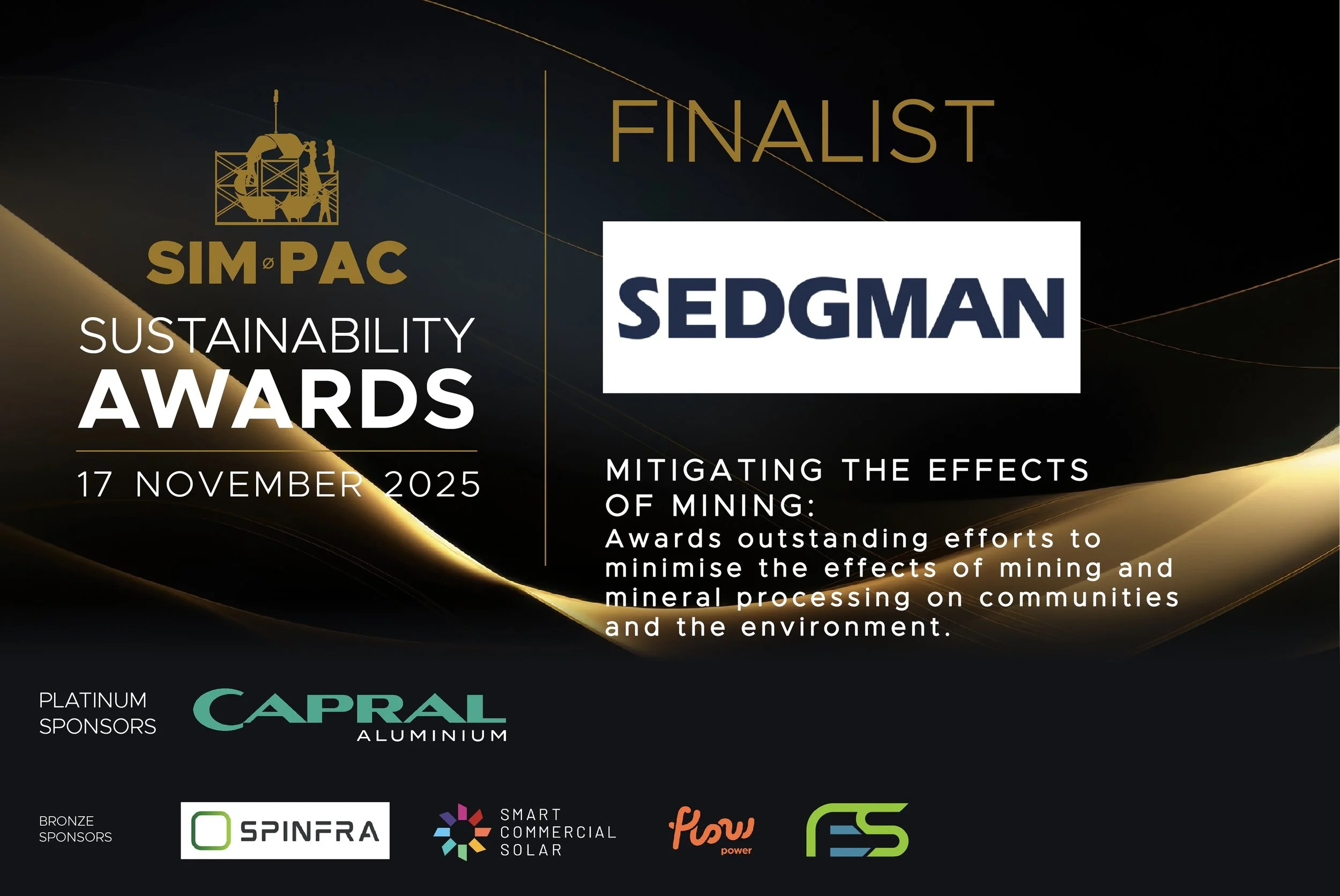
Sedgman’s work in innovative mineral processing design is helping redefine what sustainability means in mining — from boosting copper recovery and throughput efficiency to pioneering circular economy outcomes through tailings recovery projects. By integrating new process simulations and advanced engineering into study and design phases, Sedgman is reducing energy intensity and turning mining waste into value — helping to lower the carbon footprint of minerals critical to the energy transition.
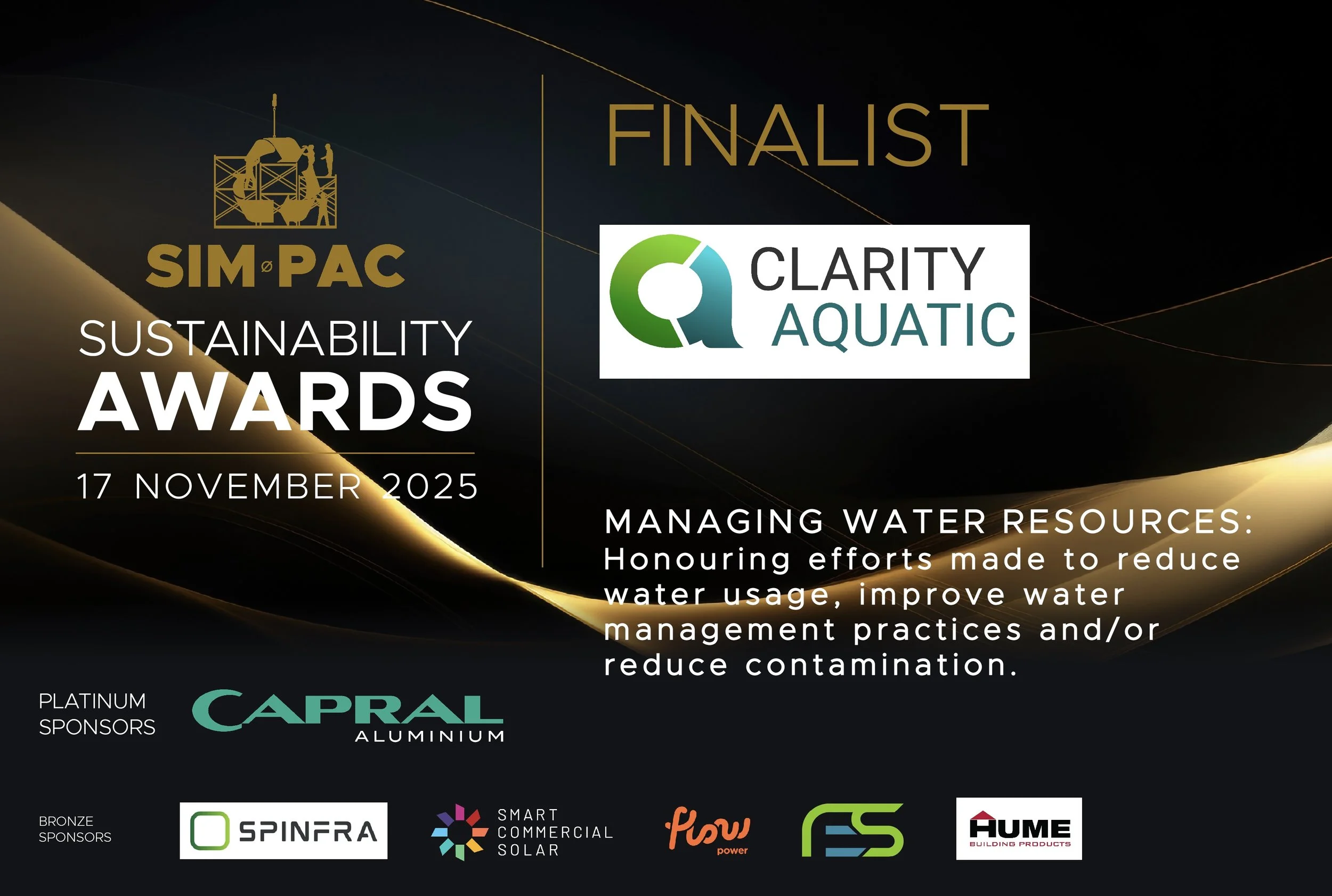
Clarity Aquatic’s Constructed Floating Wetlands (CFWs) harness the power of nature to restore and protect water ecosystems. These floating systems remove nutrients, stabilise sediments, and enhance biodiversity across dams, stormwater basins, wastewater lagoons, and open water bodies. By combining ecology with hydro-engineering, Clarity Aquatic delivers a low-energy, low-chemical alternative to conventional water treatment — reducing pollution while creating thriving aquatic habitats.
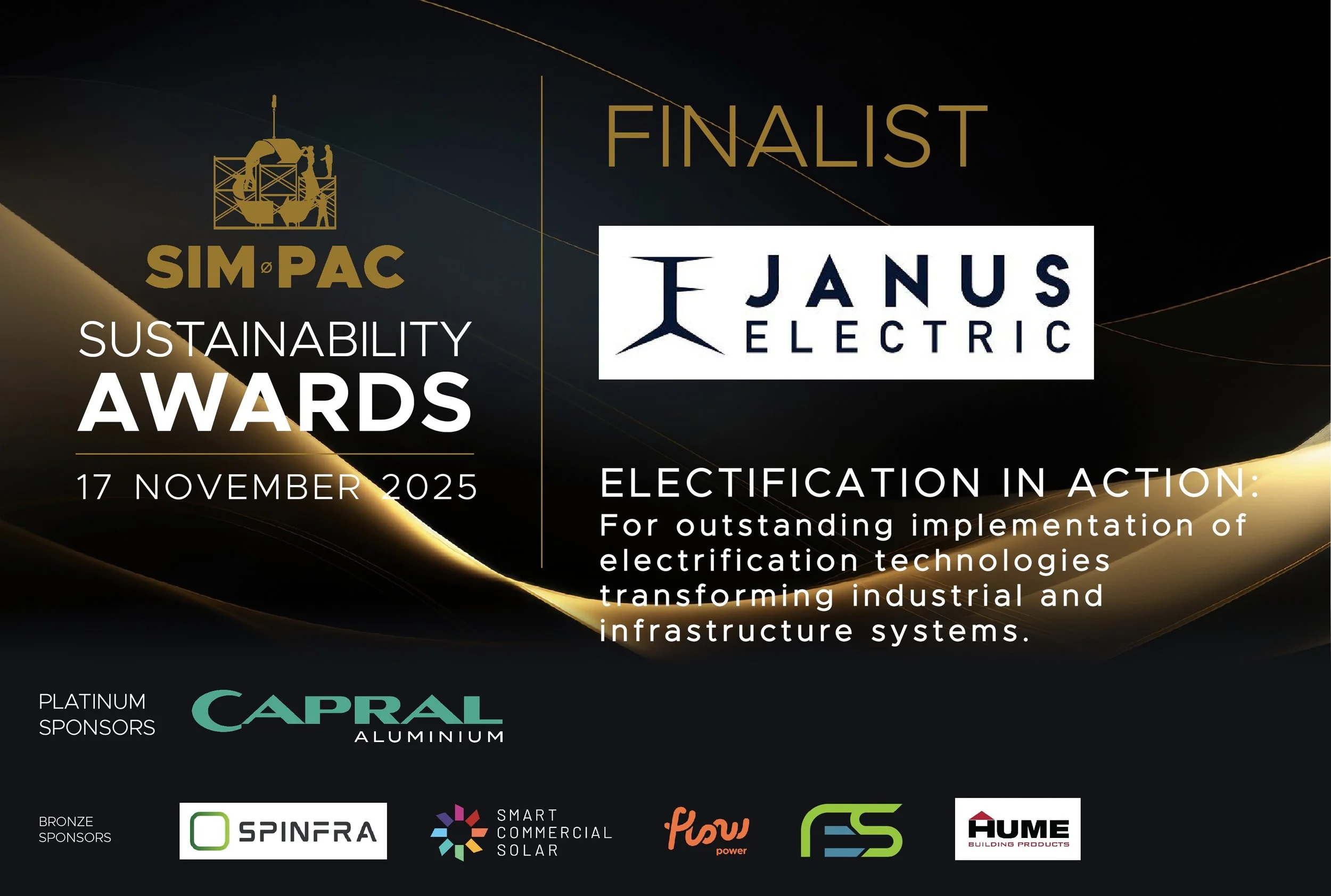
Janus Electric is redefining Australia’s transport and logistics landscape through its battery-swap electrification technology — converting heavy diesel fleets to zero-emission electric power. With its growing national battery-exchange network and scalable retrofit model, Janus is proving that large-scale decarbonisation in freight transport is not only possible — it’s already happening. Congratulations to the entire Janus Electric team for leading the charge toward a cleaner, smarter, and more sustainable transport future.
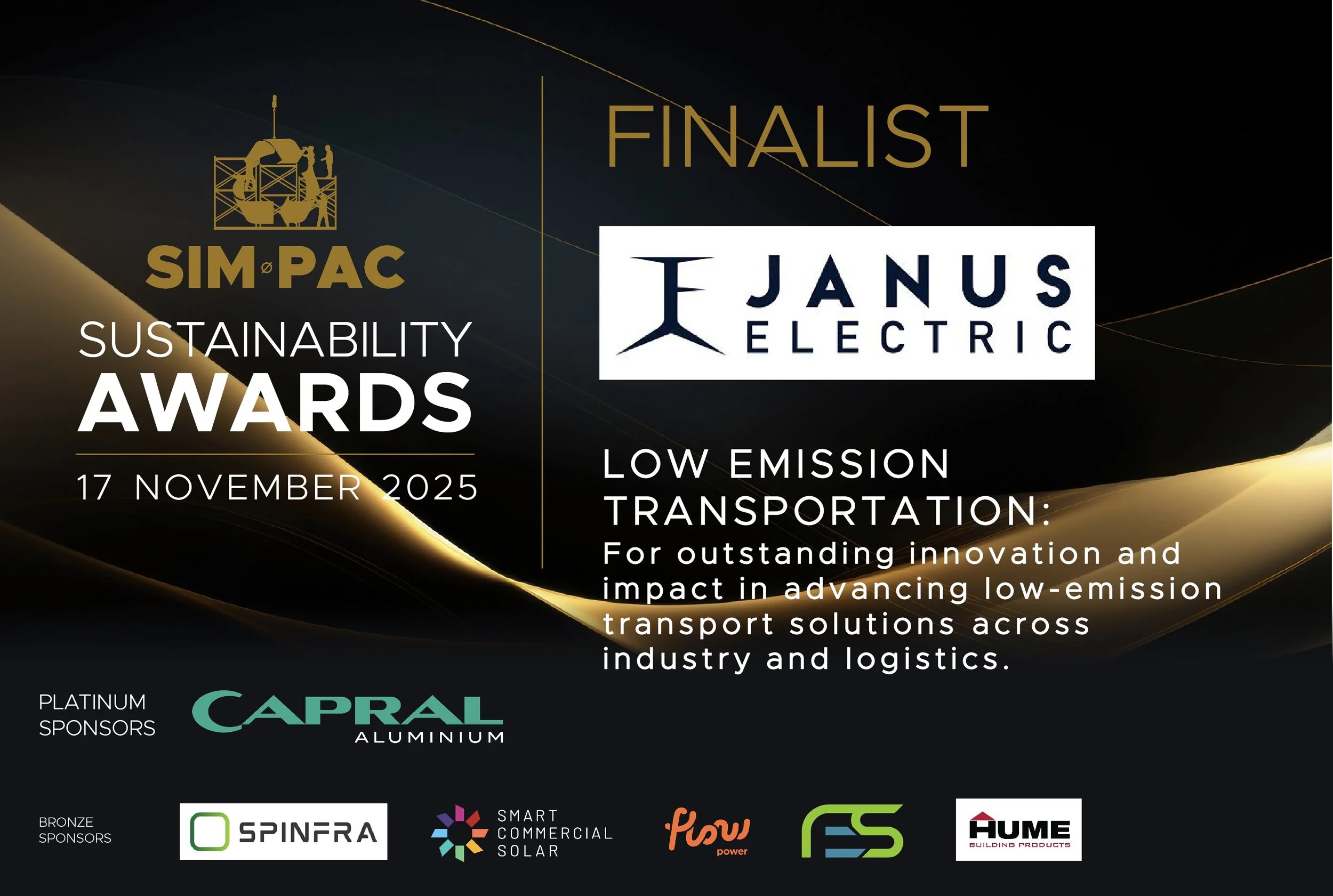
Janus Electric is redefining Australia’s transport and logistics landscape through its battery-swap electrification technology — converting heavy diesel fleets to zero-emission electric power. With its growing national battery-exchange network and scalable retrofit model, Janus is proving that large-scale decarbonisation in freight transport is not only possible — it’s already happening. Congratulations to the entire Janus Electric team for leading the charge toward a cleaner, smarter, and more sustainable transport future.
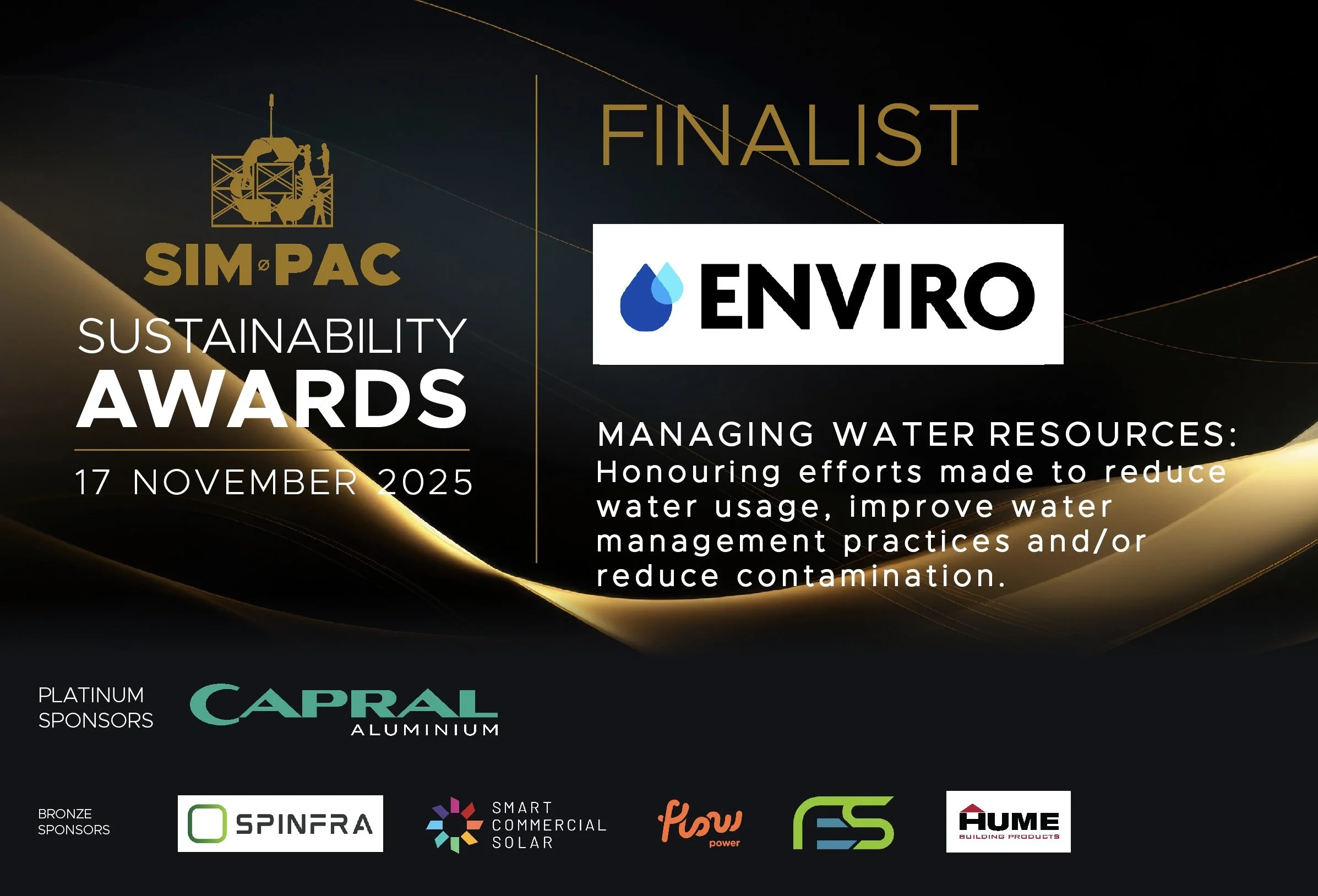
Enviro Australis is delivering innovative, data-driven water management and reuse solutions that help industries and communities optimise resources, improve water security, and reduce environmental impact. From precision monitoring systems to sustainable treatment and recovery technologies, Enviro Australis is demonstrating how Australian engineering can deliver smarter, cleaner, and more resilient water outcomes. Congratulations to Managing Director Leo Crasti and the Enviro Australis team for their leadership in sustainable water management and circular resource innovation. Learn more about Enviro Australis: www.enviroaustralis.com.au Learn more about the SIM-PAC Live Sustainability Awards: www.sim-pac.live/awards
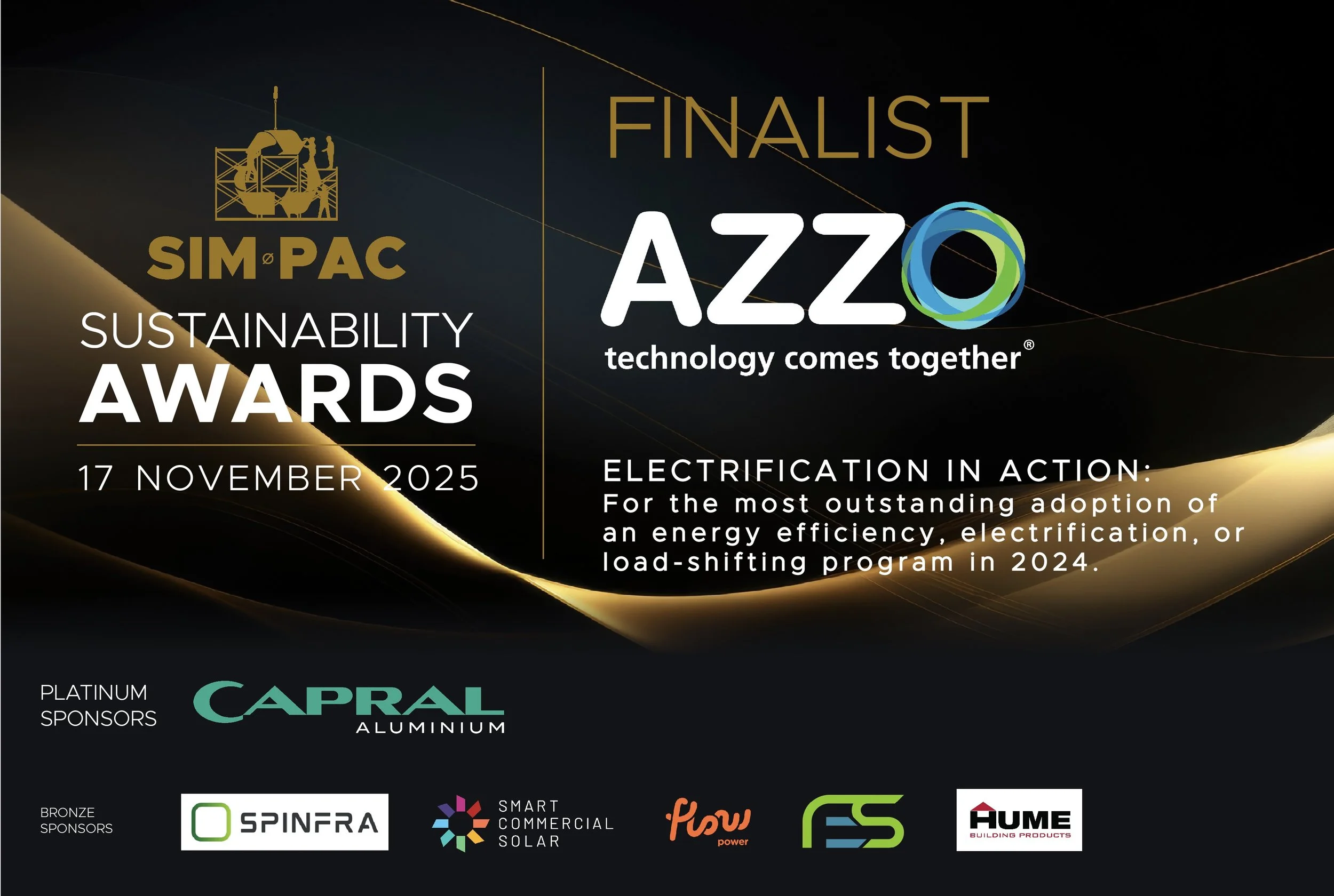
We are delighted to announce AZZO as a Finalist in the Electrification in Action Award at the 2025 SIM-PAC Live Sustainability Awards. Through its EnergyX® Platform, AZZO is redefining how industry, transport, and civic infrastructure are powered — connecting renewables, storage, microgrids, and EV charging systems into one intelligent energy ecosystem. From Australia to the United States, AZZO’s technology is delivering real-world electrification — managing public transport energy loads, integrating airport microgrids, and helping industrial facilities cut emissions and improve efficiency. Their work exemplifies electrification in action: practical, scalable, and transformative. For more information about AZZO, visit www.azzo.com For more about the SIM-PAC Live Sustainability Awards, click here #SIMPACLive #SustainabilityAwards #Electrification #EnergyTransition #Innovation #Decarbonisation #SmartEnergy
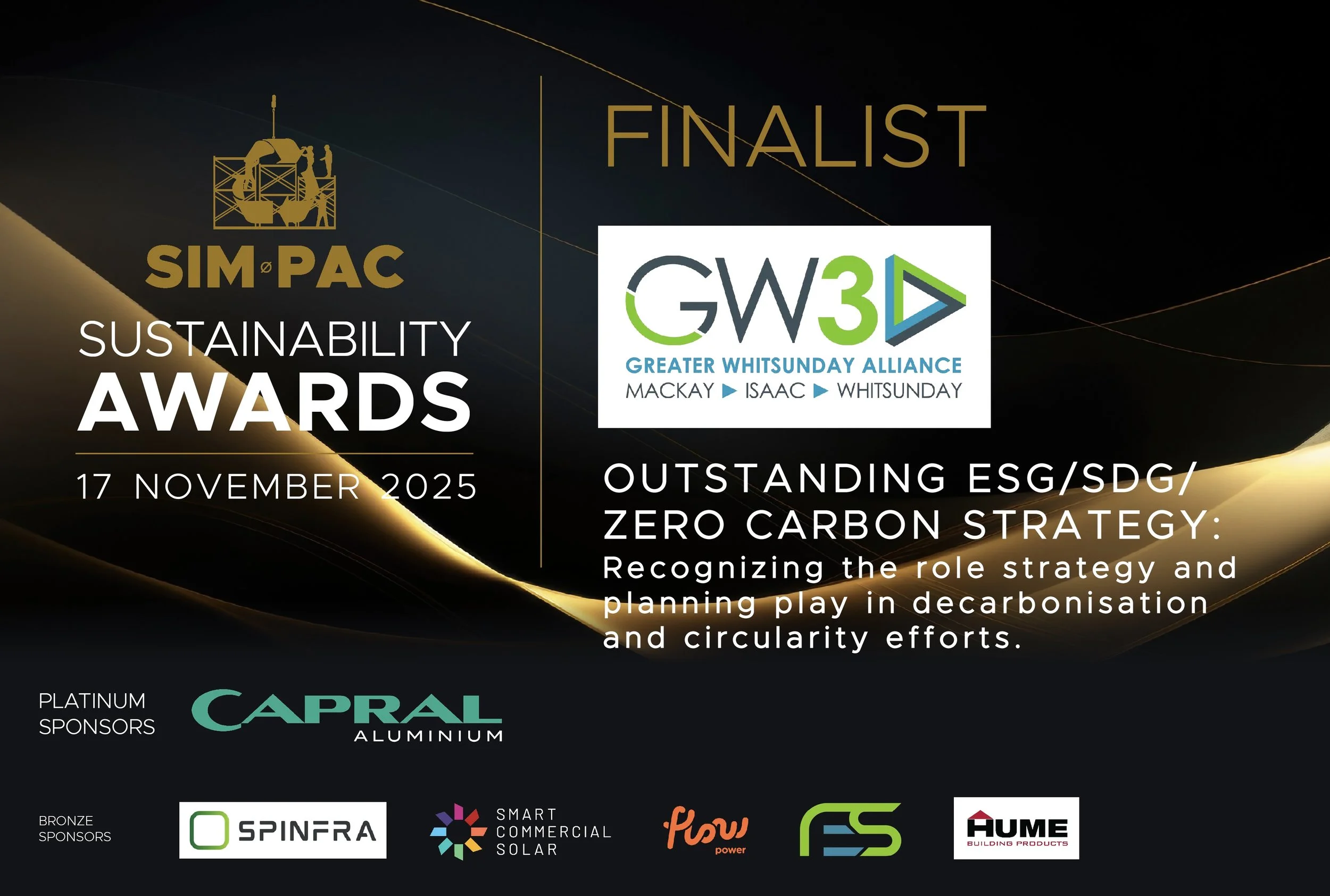
Through its flagship initiative, Decarbonisation Accelerated, GW3 has developed one of Australia’s most comprehensive regional sustainability strategies — uniting government, industry, education, and community partners across the Mackay, Isaac, and Whitsunday region. GW3’s work demonstrates the power of collaboration in action: aligning ESG, SDG, and decarbonisation principles to drive regional transformation, diversify industries, and build long-term resilience. Collaboration Award – for its regional partnership model accelerating the transition to a low-carbon economy. Outstanding ESG / SDG / Zero Carbon Strategy Award – for its integrated Decarbonisation Accelerated framework, workforce programs, and measurable emission-reduction outcomes. With 101 regional businesses now engaged and growing awareness of decarbonisation across all sectors, GW3 continues to set the national benchmark for regional sustainability leadership.

Through its flagship initiative, Decarbonisation Accelerated, GW3 has developed one of Australia’s most comprehensive regional sustainability strategies — uniting government, industry, education, and community partners across the Mackay, Isaac, and Whitsunday region. GW3’s work demonstrates the power of collaboration in action: aligning ESG, SDG, and decarbonisation principles to drive regional transformation, diversify industries, and build long-term resilience. Collaboration Award – for its regional partnership model accelerating the transition to a low-carbon economy. Outstanding ESG / SDG / Zero Carbon Strategy Award – for its integrated Decarbonisation Accelerated framework, workforce programs, and measurable emission-reduction outcomes. With 101 regional businesses now engaged and growing awareness of decarbonisation across all sectors, GW3 continues to set the national benchmark for regional sustainability leadership.
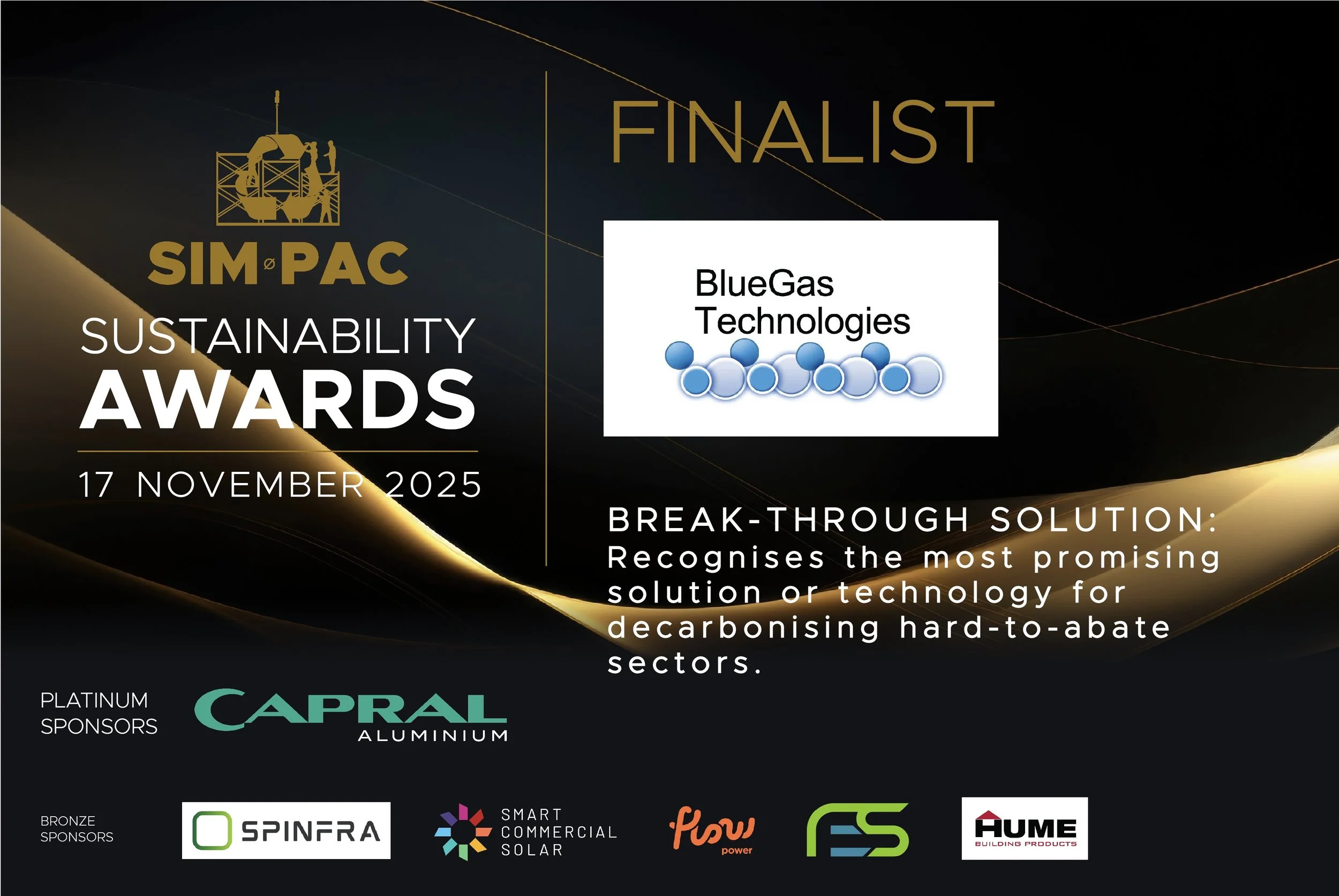
Their entry, Integrated Project Licensing Pathway for Scalable Hydrogen and Energy-from-Waste Deployment in Regional Australia, delivers a unified approach to waste transformation and renewable energy generation — unlocking circular, low-carbon opportunities for regional communities. Highlights of their sustainability leadership include: Patented non-combustion reforming technologies (CBR® and BlueFlux) that convert diverse waste streams into clean hydrogen, syngas, heat, and biochar EU-certified, carbon-negative systems with negligible residual waste and near-zero emissions Proven performance and validation by global experts including Lockheed Martin, Fichtner, and Mott McDonald Founding partnership in the Mallee Hydrogen Production Consortium, advancing hydrogen-powered freight across regional Australia This recognition reflects BlueGas Technologies’ commitment to scalable, circular energy systems that bridge waste management, clean fuel production, and industrial decarbonisation.
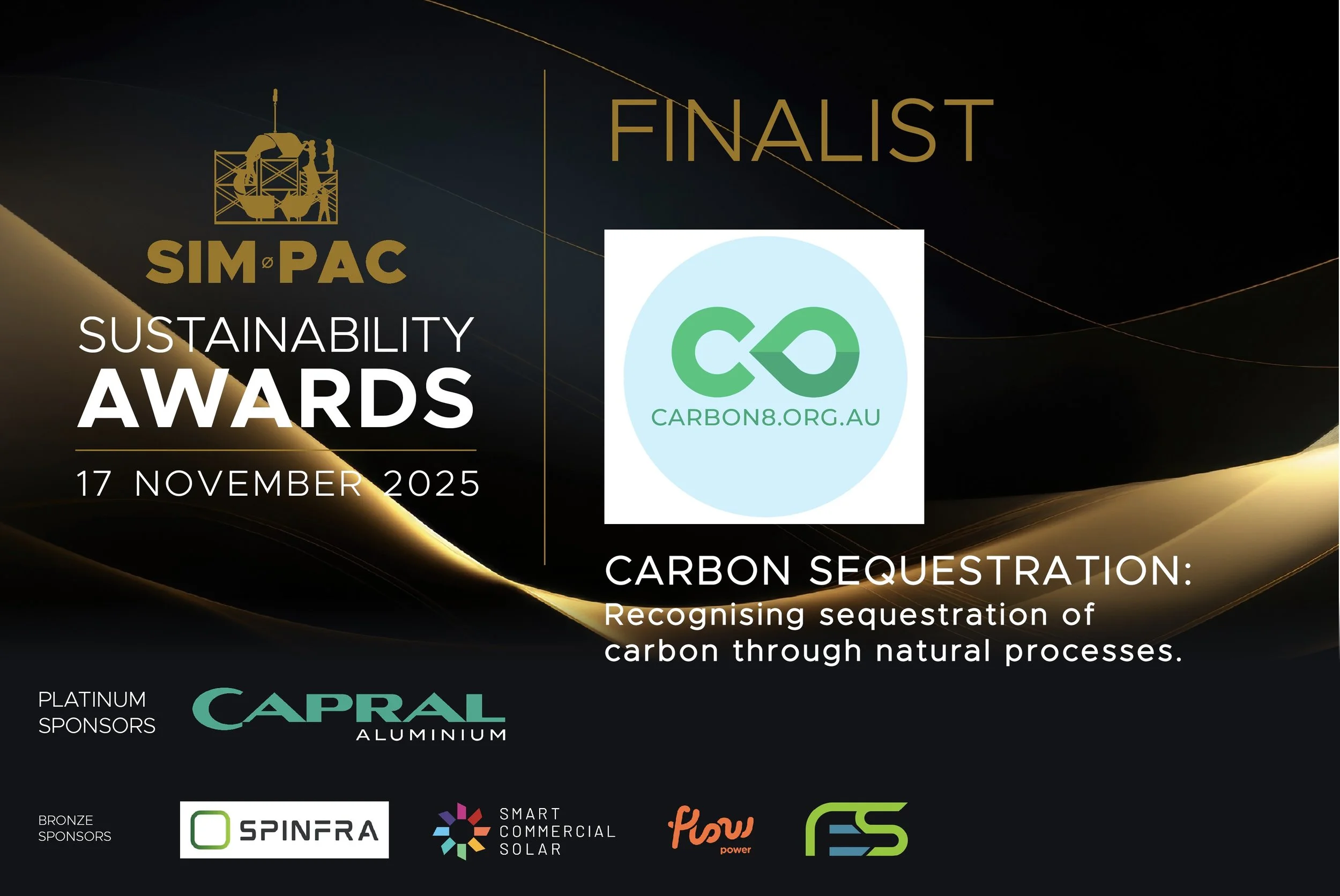
Their entry showcased a groundbreaking dual approach to carbon removal — combining regenerative agriculture with industrial carbon capture to deliver measurable, verifiable sequestration outcomes across both natural and engineered systems. Highlights of their sustainability leadership include: Enabling Australian farms to increase soil organic carbon, restoring productivity and biodiversity The RegenGrown Verification System, ensuring transparency and traceability in soil carbon measurement A validated carbon capture and utilisation (CCU) process that converts industrial residues into carbon-negative construction materials Independent verification by DNV to global standards (ISO 14064-2) This recognition reflects Carbon8’s commitment to scalable, science-based solutions that regenerate land, decarbonise industry, and accelerate Australia’s journey to net zero.
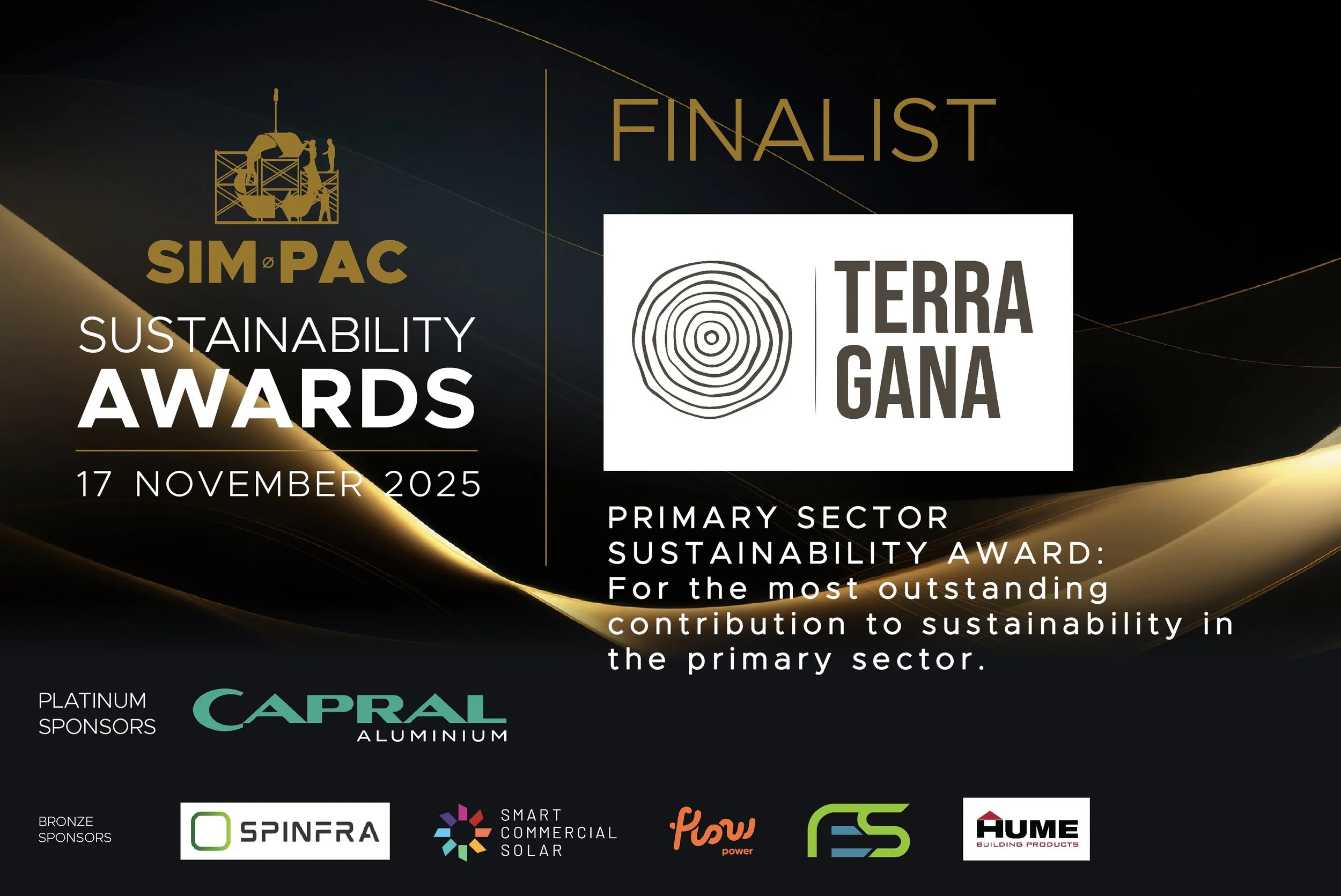
Terra Gana’s recognition reflects its exceptional work delivering complex, multi-stakeholder projects that balance environmental outcomes, operational feasibility, and community benefit. In one project, Terra Gana worked alongside local councils, contractors, and environmental regulators to deliver a major regional infrastructure initiative with minimal ecological impact. In another, the team collaborated with pastoral and conservation stakeholders across an extensive landscape to restore degraded environments, reduce grazing pressures, and demonstrate how sustainable land management and production can coexist. These achievements exemplify Terra Gana’s approach to practical sustainability, trust-based collaboration, and evidence-led decision-making — setting new benchmarks for integrated environmental consulting .
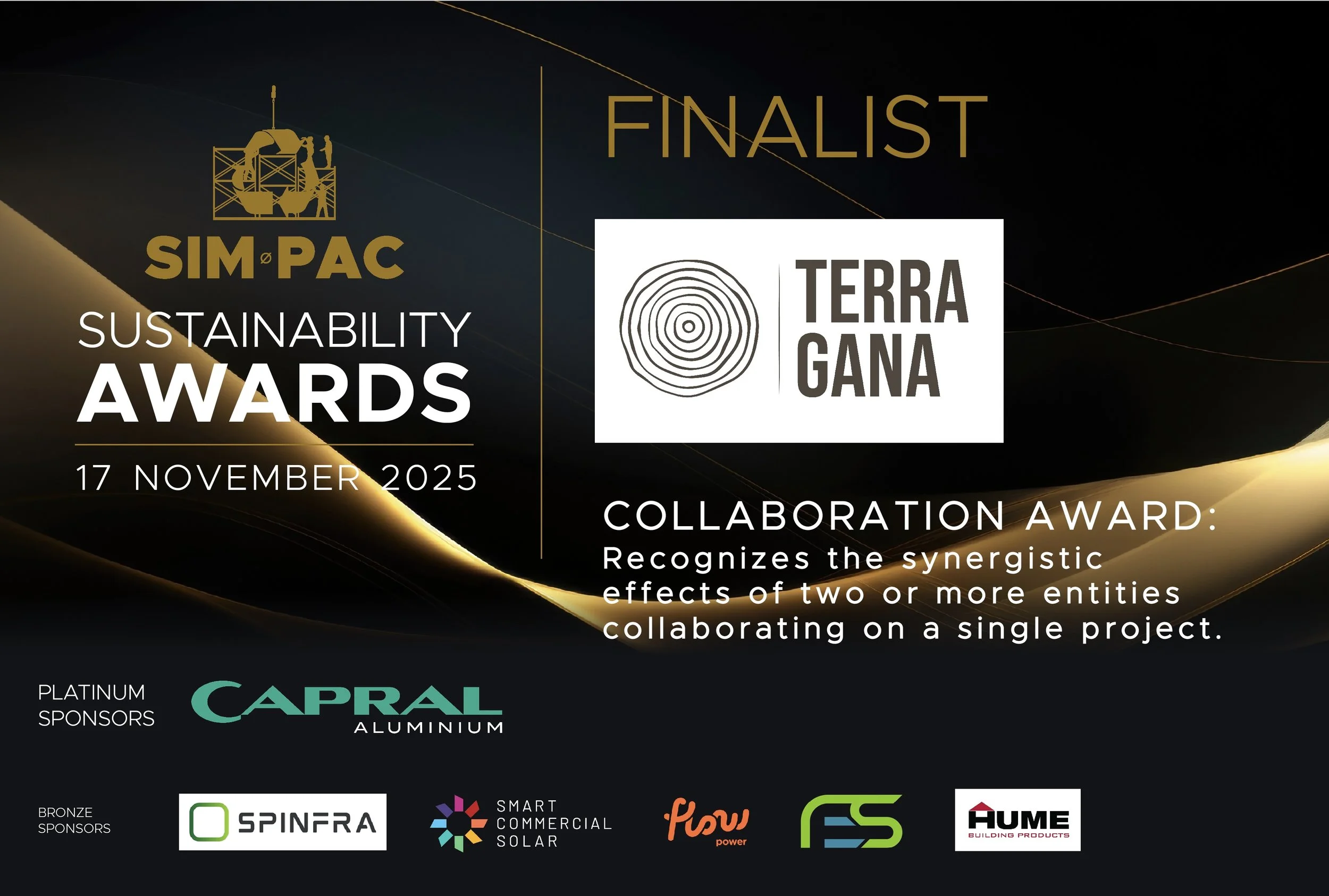
Terra Gana’s recognition reflects its exceptional work delivering complex, multi-stakeholder projects that balance environmental outcomes, operational feasibility, and community benefit. In one project, Terra Gana worked alongside local councils, contractors, and environmental regulators to deliver a major regional infrastructure initiative with minimal ecological impact. In another, the team collaborated with pastoral and conservation stakeholders across an extensive landscape to restore degraded environments, reduce grazing pressures, and demonstrate how sustainable land management and production can coexist. These achievements exemplify Terra Gana’s approach to practical sustainability, trust-based collaboration, and evidence-led decision-making — setting new benchmarks for integrated environmental consulting
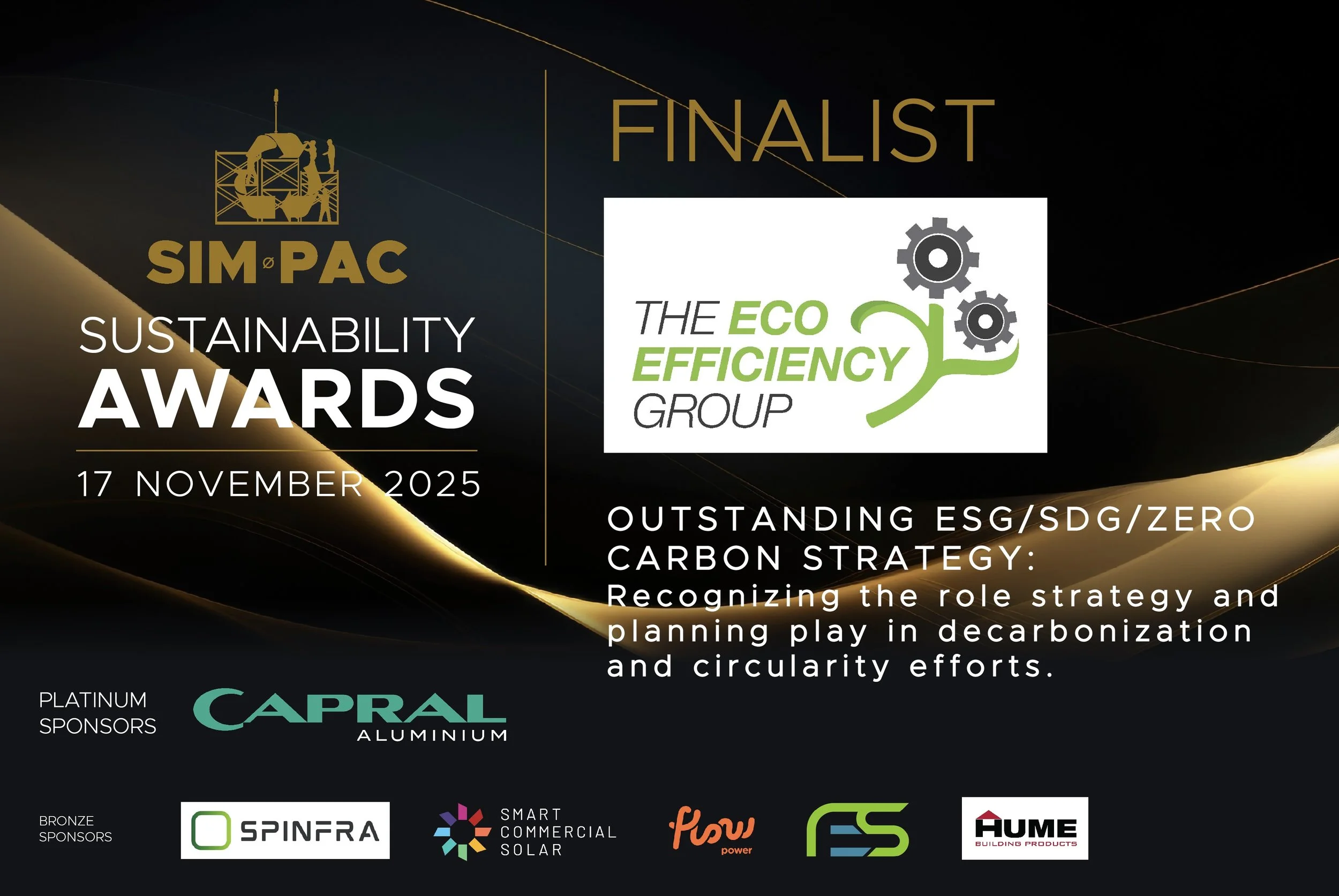
Their entry, the Queensland Manufacturers Sustainability Benchmarking Program, represents a landmark achievement in data-driven sustainability leadership — establishing Queensland’s first coordinated benchmark for environmental performance across the manufacturing sector. Highlights of their sustainability leadership include: Delivered one of Australia’s largest sustainability datasets for manufacturing, with over 60 businesses benchmarked Developed a structured, data-led framework integrating the UN SDGs and Queensland’s Zero Emissions targets Enabled measurable reductions in electricity, fuel, water, and waste across participating manufacturers Empowered businesses with tailored sustainability action plans and readiness for net-zero transition pathways This recognition reflects The Ecoefficiency Group’s commitment to measurable ESG outcomes, sector-wide collaboration, and the creation of scalable tools to drive Australia’s sustainable manufacturing transformation.

MasterCarb A is a world-first pavement innovation combining cold in-situ recycling with a carbon-sequestering binder to deliver asphalt-grade performance with carbon-negative results. Real-world projects have achieved significant and impressive negative CO₂ outcomes for completed roads, turning traditional construction into a model for circular, low-carbon infrastructure and setting a new benchmark for hard-to-abate sectors.
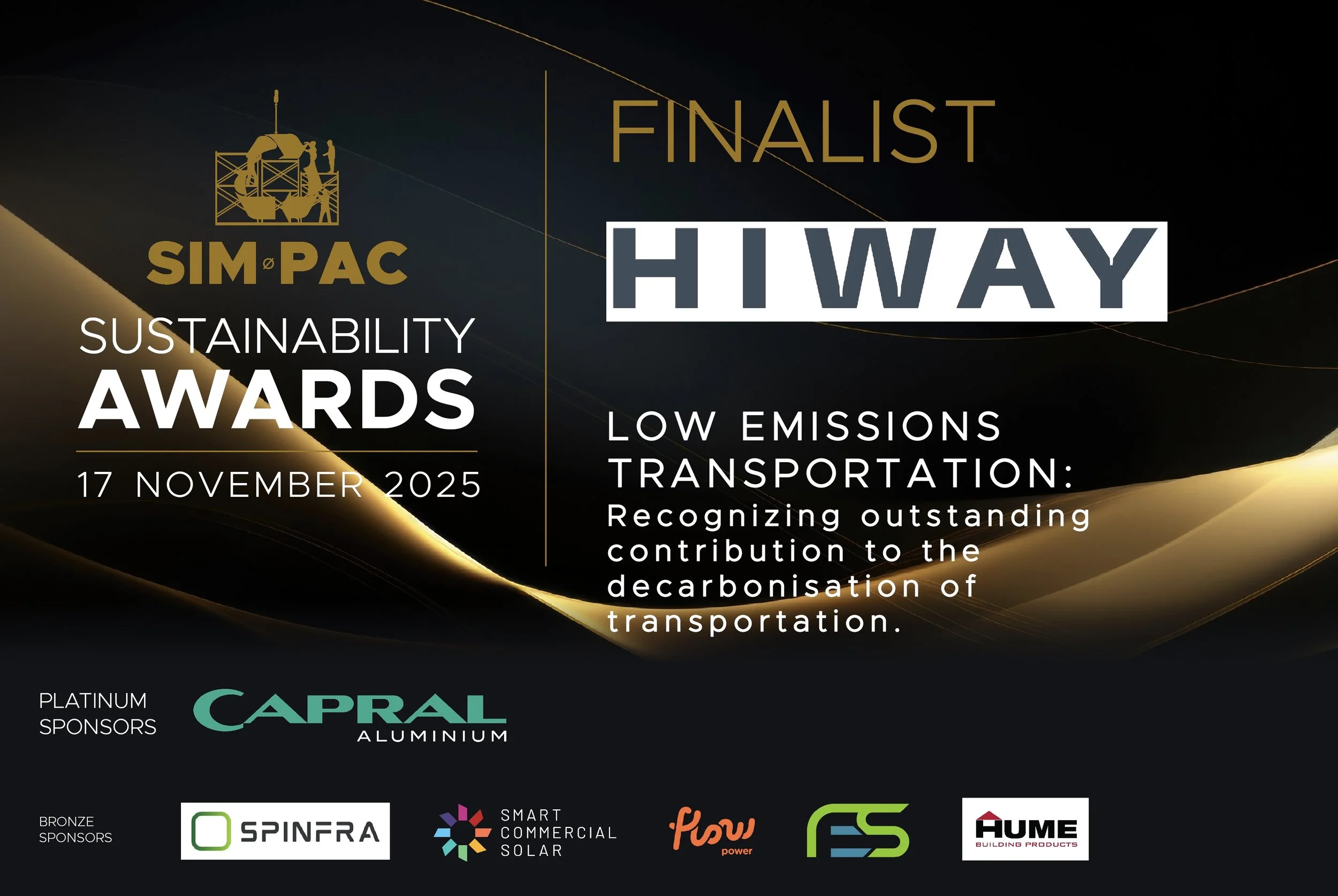
MasterScrim redefines sustainable road maintenance. By restoring surface texture without new bitumen or asphalt, it achieves modelling results indicating an 88–97% reduction in CO₂ emissions compared to current treatment practices. MasterScrim provides public transport authorities with a valuable, scalable emissions reduction strategy for maintaining road networks sustainably while improving safety and reducing waste.
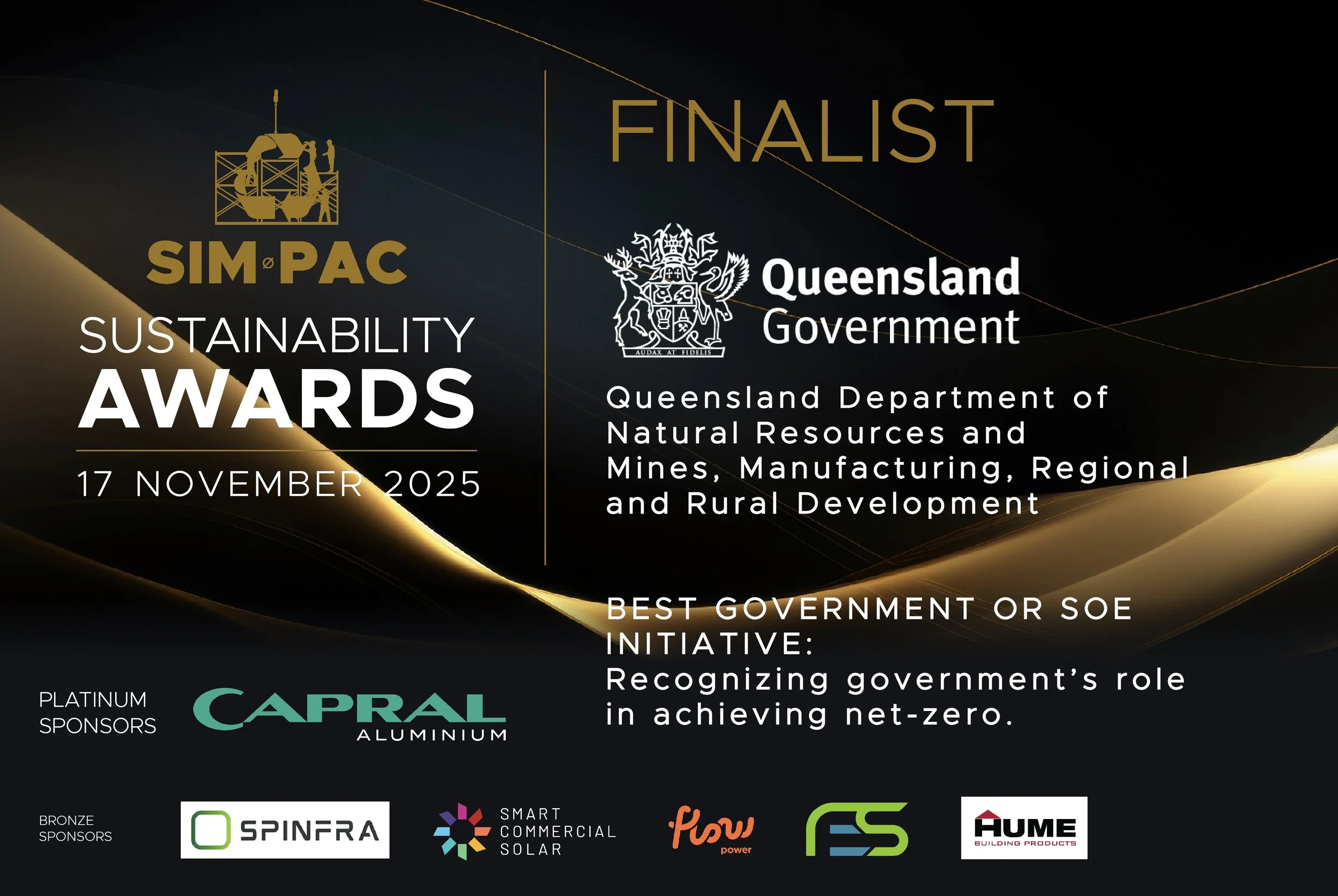
Their Queensland Manufacturers Sustainability Benchmarking Program — delivered in partnership with The Ecoefficiency Group (TEG) — has set a new standard for sustainability leadership in manufacturing. Through this first-of-its-kind, state-wide initiative, the Department and TEG have enabled Queensland manufacturers to measure, benchmark, and improve sustainability performance across energy, water, waste, and emissions. The program has already helped over 60 manufacturers identify cost-saving, decarbonisation, and ESG-readiness opportunities — creating Queensland’s first coordinated sustainability baseline for manufacturing. This pioneering collaboration demonstrates how data-driven policy, public–private partnerships, and local innovation can accelerate the transition to a sustainable, low-carbon manufacturing sector. Congratulations to everyone involved in this impactful project — and to the team at The Ecoefficiency Group for their outstanding delivery and commitment to sustainable industry transformation.
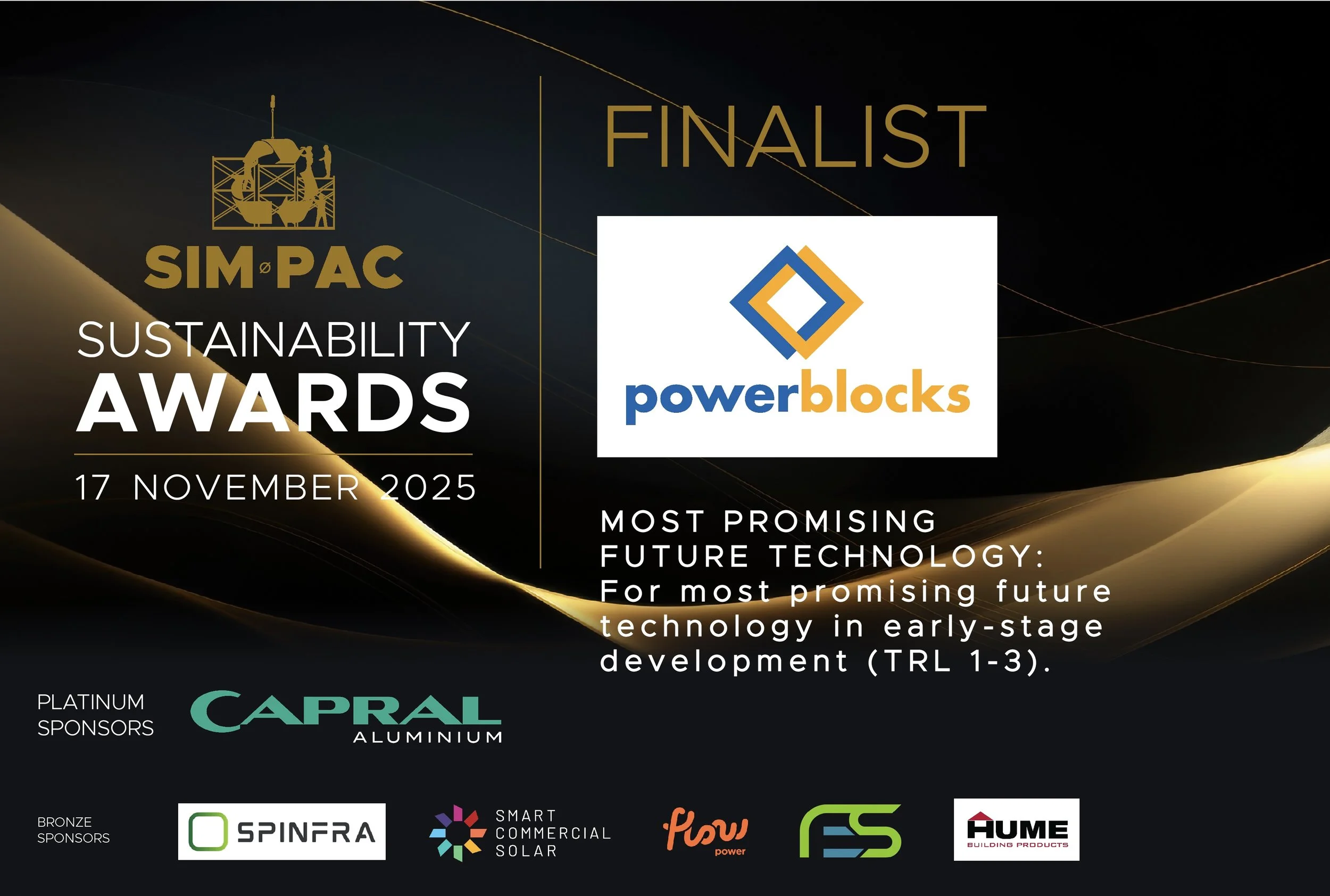
Their entry showcased the Modular Community Energy Storage System (Powerblocks) — an innovative, battery technology-agnostic platform redefining how energy is stored, shared, and managed across communities. Designed to accelerate the clean energy transition, Powerblocks enables distributed, near-point-of-use storage to reduce grid congestion, enhance resilience, and empower smart cities and remote regions alike. Highlights of their sustainability leadership include: A modular, scalable design that adapts to community energy demand Integration with distributed solar and microgrids to enhance renewable energy utilisation Battery-agnostic platform compatible with multiple chemistries and technologies Strengthens resilience in urban, regional, and natural environments through place-based storage Introduces a new alternative to the traditional Virtual Power Plant (VPP) model, supporting the future of Digital Grid Futures This recognition reflects Powerblocks’ commitment to advancing low-impact, resilient energy infrastructure that supports the circular, decentralised energy systems of tomorrow.
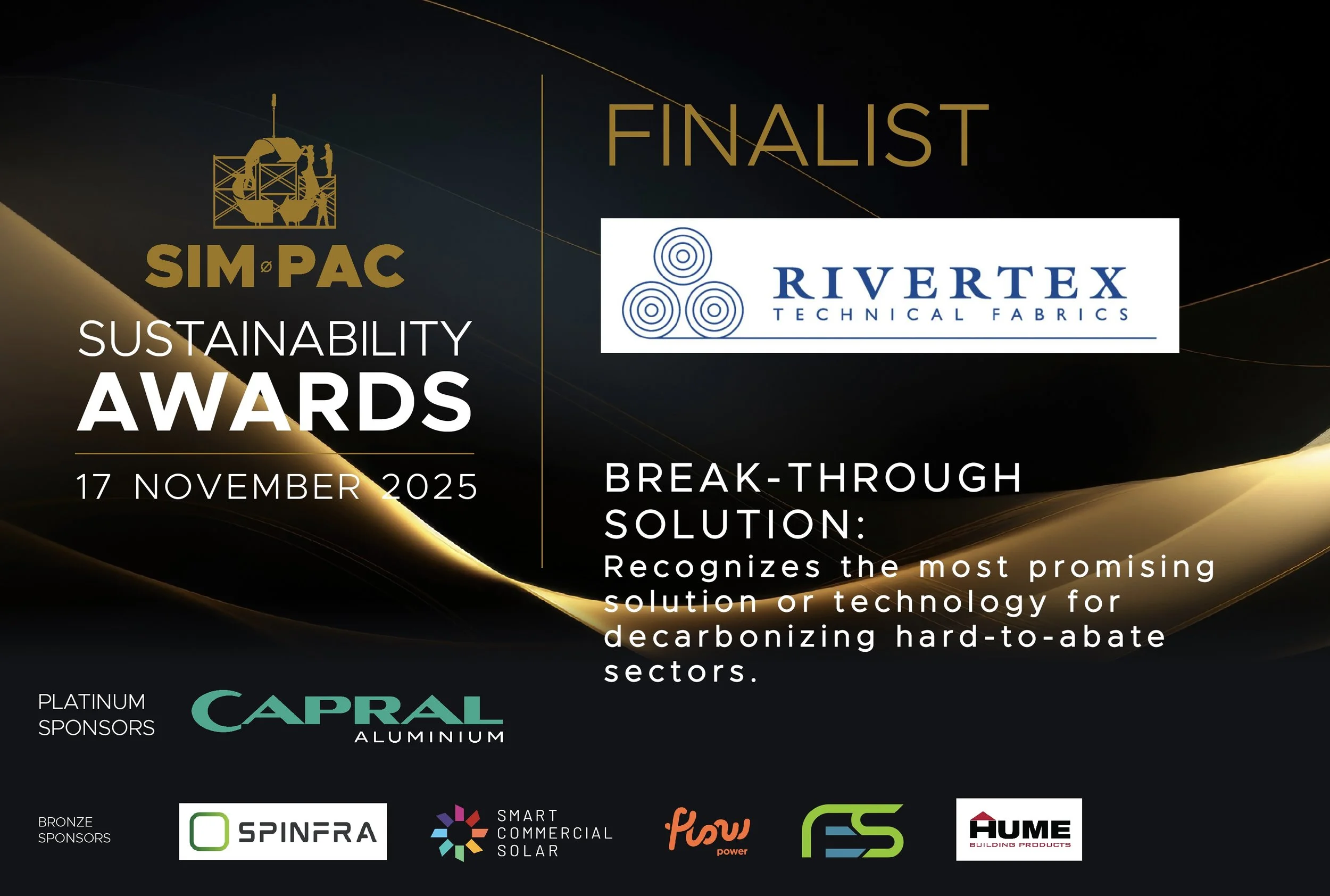
With Rivercyclon® 450 FR, Rivertex® has achieved a world-first: a flame-retardant yet fully recyclable fabric that combines safety, durability, and circularity in one innovation. This breakthrough eliminates halogens and heavy metals, achieves leading fire-safety certifications (ISO 13501-B S1 D0, NFPA 701), and remains compatible with existing polypropylene recycling systems. By solving the long-standing challenge of pairing flame-retardant performance with recyclability, Rivertex® sets a new international standard for sustainable material innovation in manufacturing.
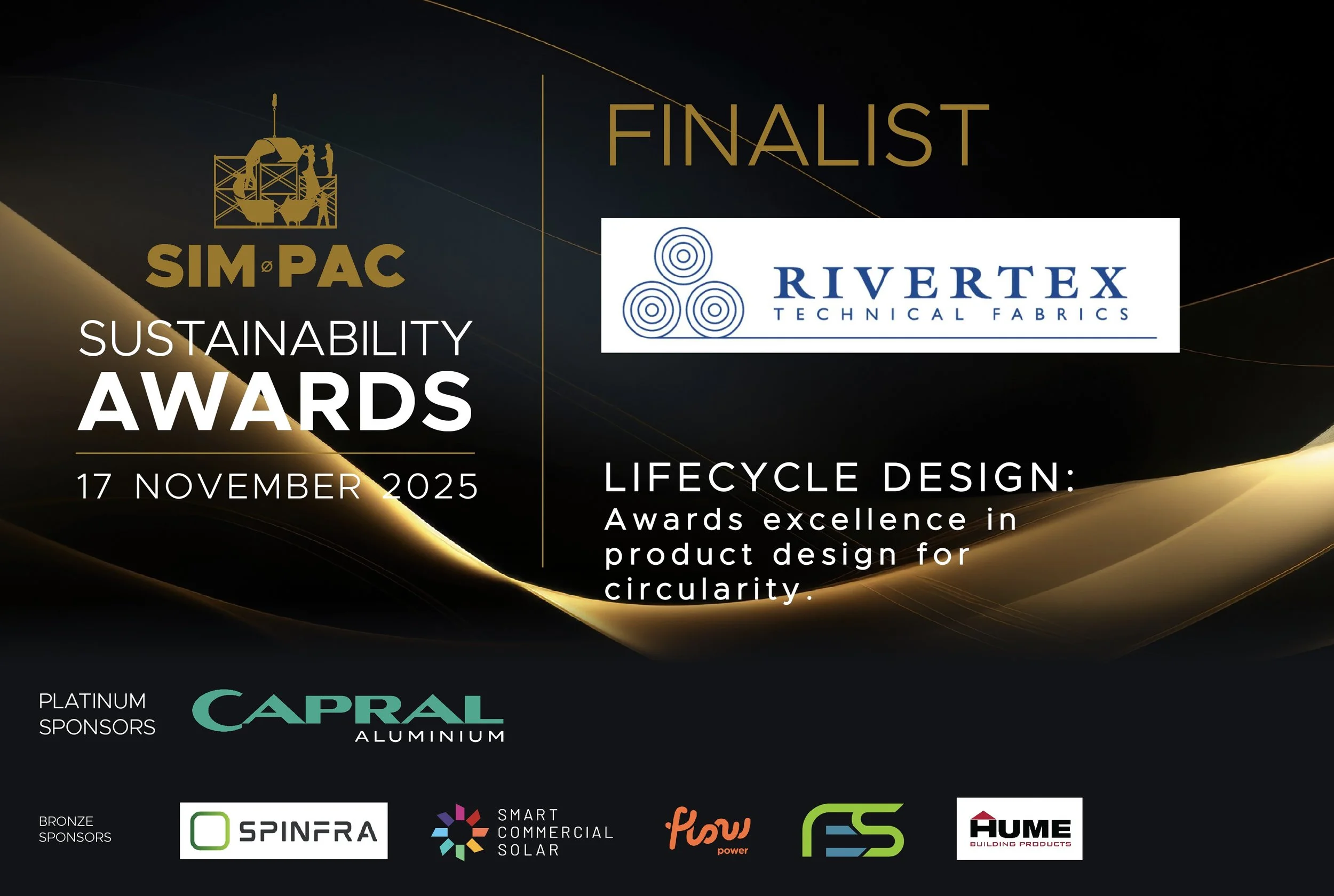
Rivertex® has redefined sustainable product design with its Rivercyclon® range — a mono-material polypropylene fabric engineered for complete recyclability, durability, and low environmental impact. By eliminating mixed materials, toxic additives, and non-recyclable composites, Rivertex® demonstrates how circular design can achieve both technical performance and measurable lifecycle improvements. Through reduced water, energy, and chemical use, and a carbon footprint more than 50% lower than PVC fabrics, Rivertex® is proving that circular design is not just possible — it’s commercially scalable and globally relevant.
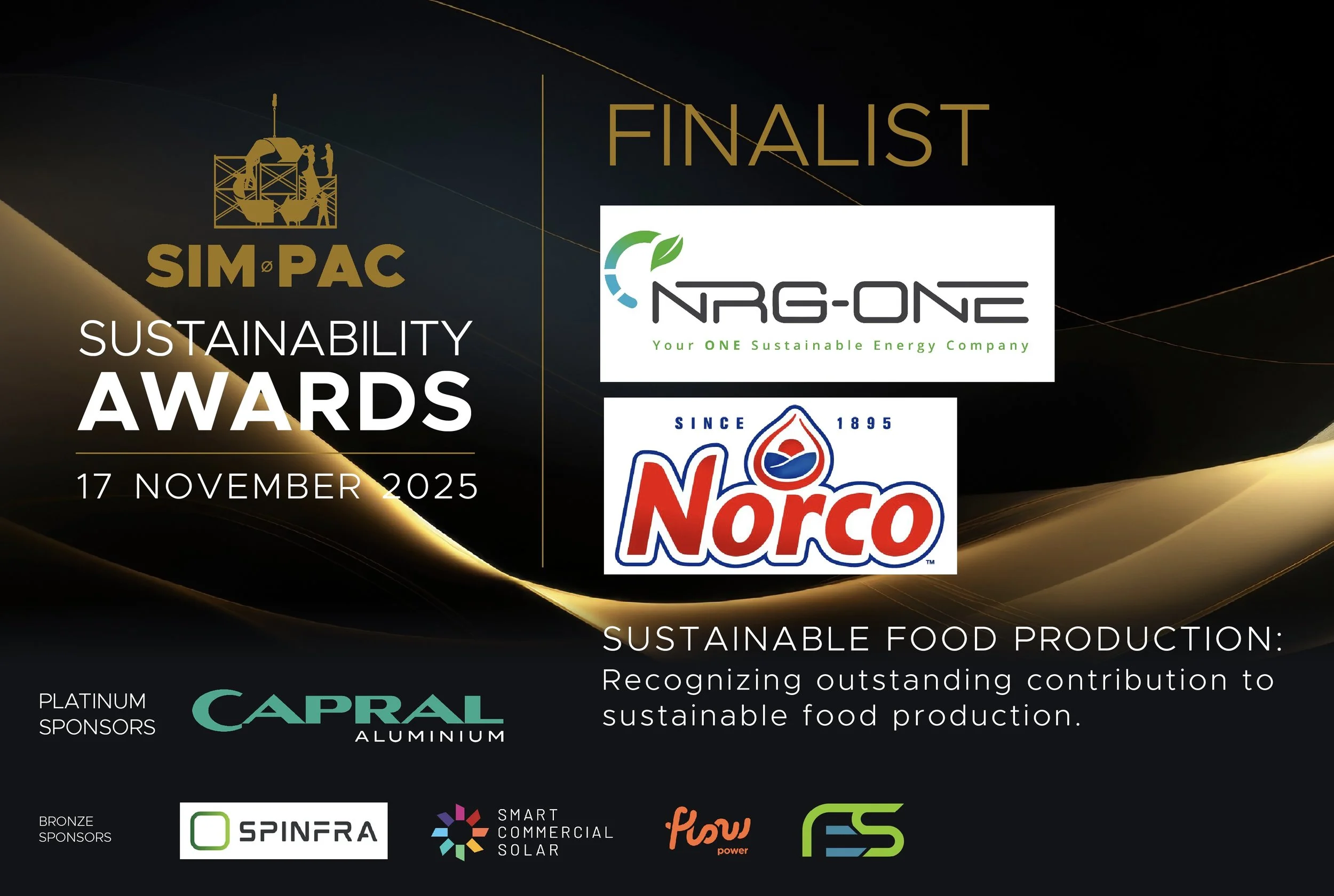
Australia’s longest-standing, 100 % farmer-owned dairy co-operative, Norco continues to lead the way in sustainable food manufacturing. Together with NRG-ONE, Norco has delivered a high-impact thermal-efficiency and carbon-reduction project at its Labrador dairy processing facility in Queensland — producing around 145 million litres of milk each year. The partnership achieved a 12 % reduction in LPG consumption, annual savings of 3,529 GJ, and greenhouse-gas abatement of 214 t CO₂-e, all while maintaining full production continuity. This collaboration demonstrates how process innovation and partnership can deliver measurable decarbonisation in food manufacturing — supporting a more sustainable future for Australia’s dairy sector. Learn more about NRG-ONE: https://nrgone.com.au/ Learn more about Norco: https://www.norco.com.au/ See the full list of 2025 Finalists: https://www.sim-pac.live/2025-awards Congratulations to the teams at Norco and NRG-ONE for their leadership in sustainable food production and their commitment to measurable decarbonisation across Australia’s dairy industry.
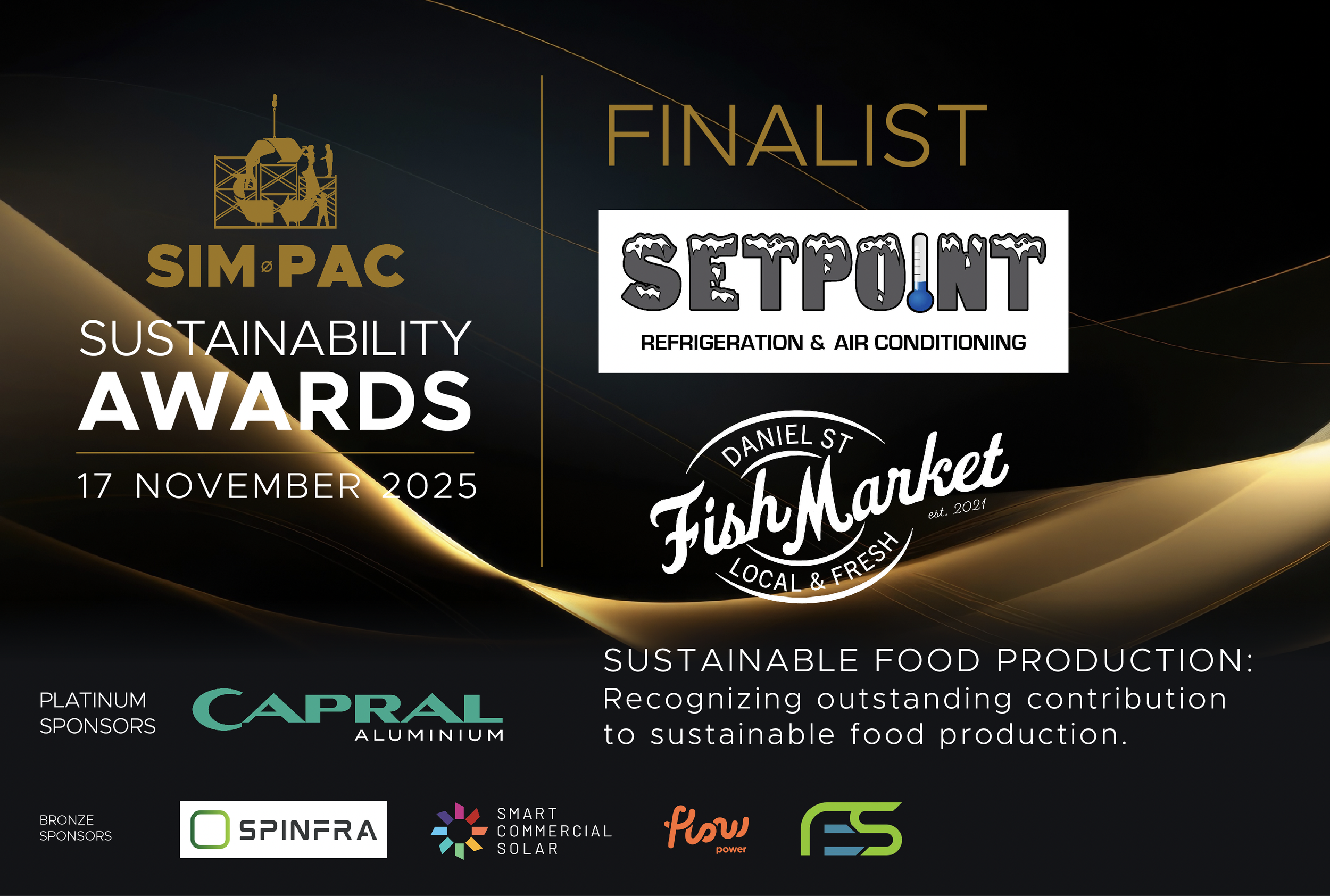
This innovative project showcases how circular-energy design and advanced refrigeration engineering can make fresh-food production more sustainable, efficient, and resilient. By capturing and reusing waste heat, integrating smart control systems, and achieving over 80 % reduction in peak-demand energy, the Fish Market demonstrates how sustainability and performance can go hand-in-hand in Australia’s seafood industry.

The Society’s work to mainstream structural and engineered bamboo in the built environment represents a system-level breakthrough — building the knowledge, standards, pathways and partnerships needed for bamboo to substitute or complement emissions-intensive materials in construction. By translating bamboo’s carbon potential into real-world adoption pathways, the Society unlocks a practical route to dramatically lower embodied emissions in buildings and infrastructure. Congratulations to Jennifer Snyders and the wider Bamboo Society network for leading industry education, standards engagement and national advocacy that enable this climate-positive material to scale.
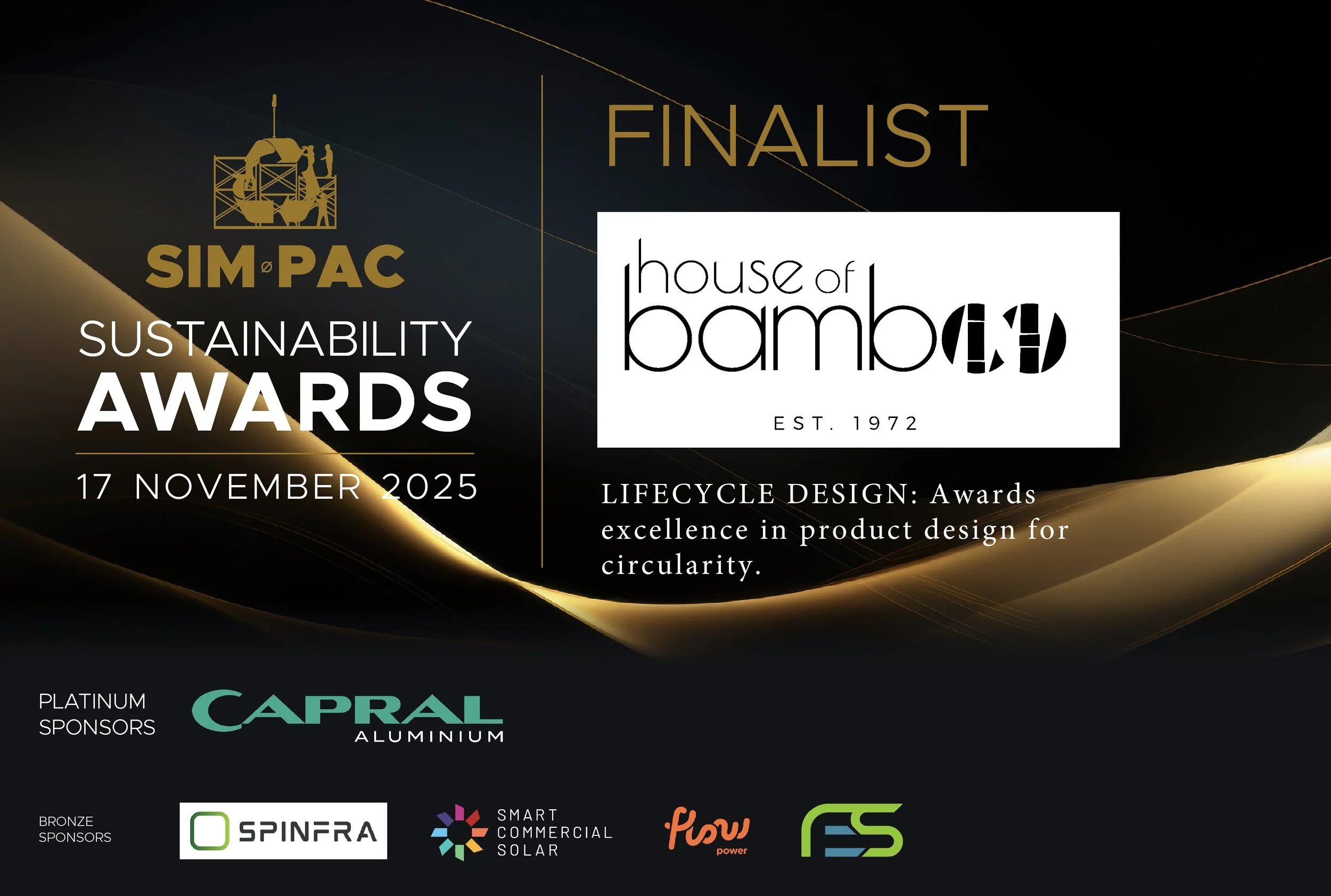
House of Bamboo embeds circularity across the full material lifecycle — from biogenic feedstock and low-impact manufacture through to stewardship and reuse pathways — enabling engineered bamboo to displace emissions-intensive materials in architecture, interiors and landscapes. Its stewardship policy, modular design and repairable/repurposable product systems deliver durable performance with recoverability at end-of-life, proving that renewable materials can meet high-spec design demands while closing the loop in practice .
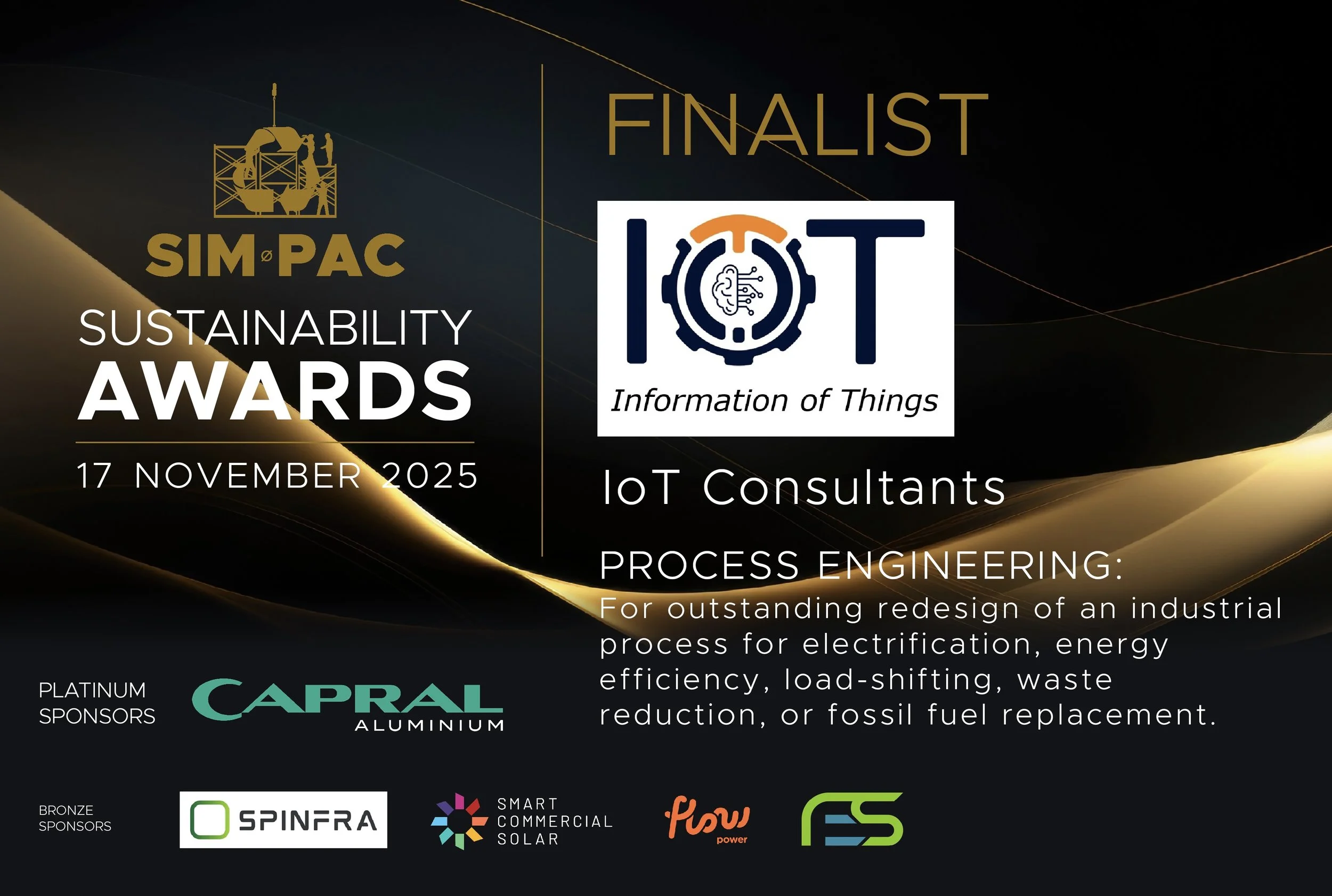
IoT Consultants’ Digital Twins for Wastewater Management project re-engineers wastewater operations from static and reactive to predictive, data-driven and energy-optimised. By integrating asset data, real-time sensors and predictive analytics into a digital twin platform, the project delivers replicable gains in load-shifting, energy efficiency, reliability and circular reuse of treated water — providing a modern blueprint for low-carbon utilities at municipal scale . Congratulations to the IoT Consultants team and partners for demonstrating how digital engineering can unlock practical, scalable decarbonisation for infrastructure and communities.

CCEP continues to demonstrate leadership in large-scale decarbonisation and circular economy transformation across the beverage value chain. Through its This is Forward sustainability strategy and Net Zero by 2040 commitment, the company is delivering measurable progress across packaging, manufacturing, energy, logistics, and supplier engagement. In Sustainable Food Production, CCEP is reducing emissions across Scopes 1, 2 and 3 through renewable electricity, electrification of thermal systems, ingredient and supplier decarbonisation, and value-chain collaboration — demonstrating that growth and climate action can occur together.
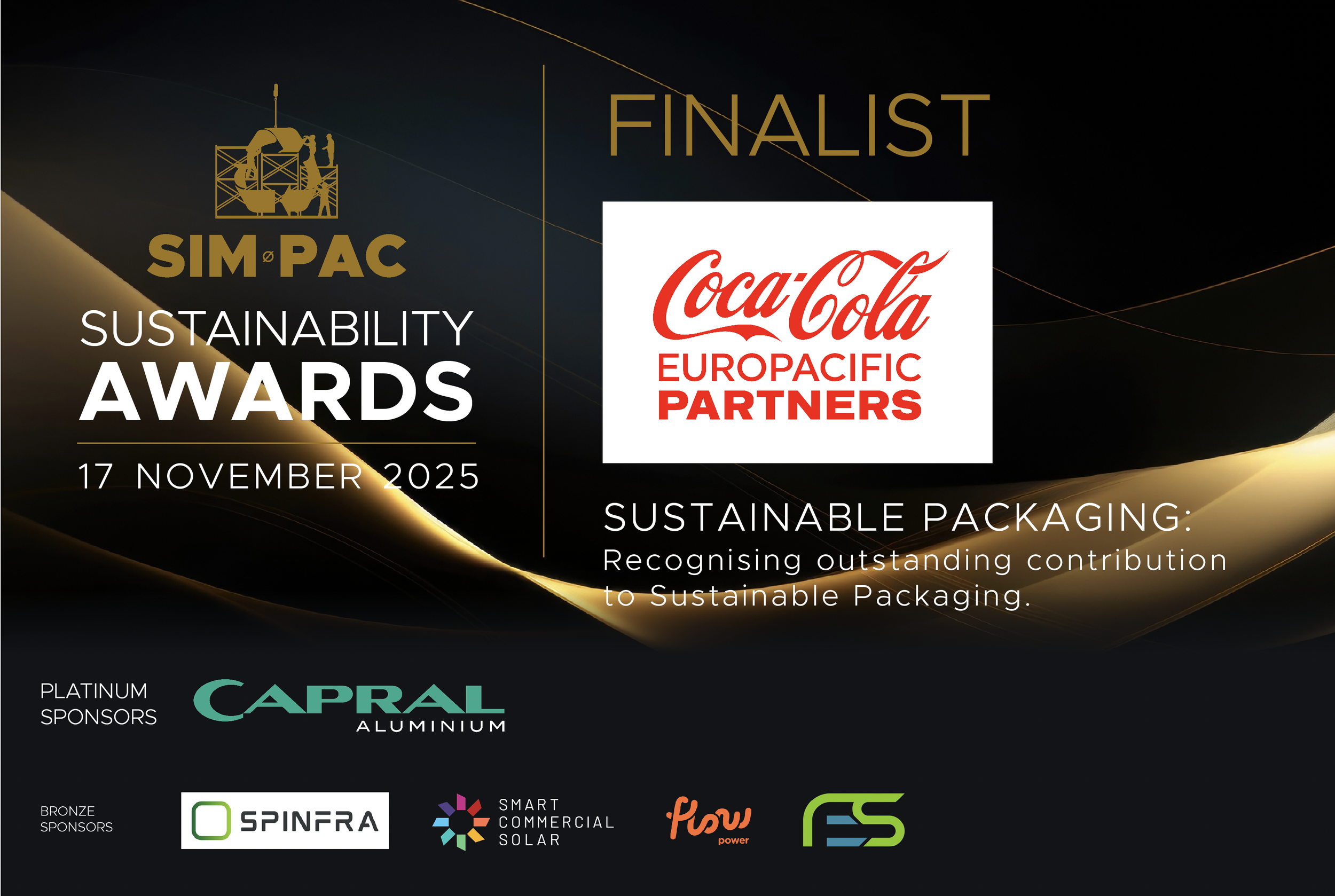
CCEP continues to demonstrate leadership in large-scale decarbonisation and circular economy transformation across the beverage value chain. Through its This is Forward sustainability strategy and Net Zero by 2040 commitment, the company is delivering measurable progress across packaging, manufacturing, energy, logistics, and supplier engagement. In Sustainable Packaging, CCEP is accelerating the transition to circular materials — redesigning packaging for recyclability, scaling recycled content in PET and aluminium, partnering to strengthen local collection systems, and working with industry to close the loop domestically.
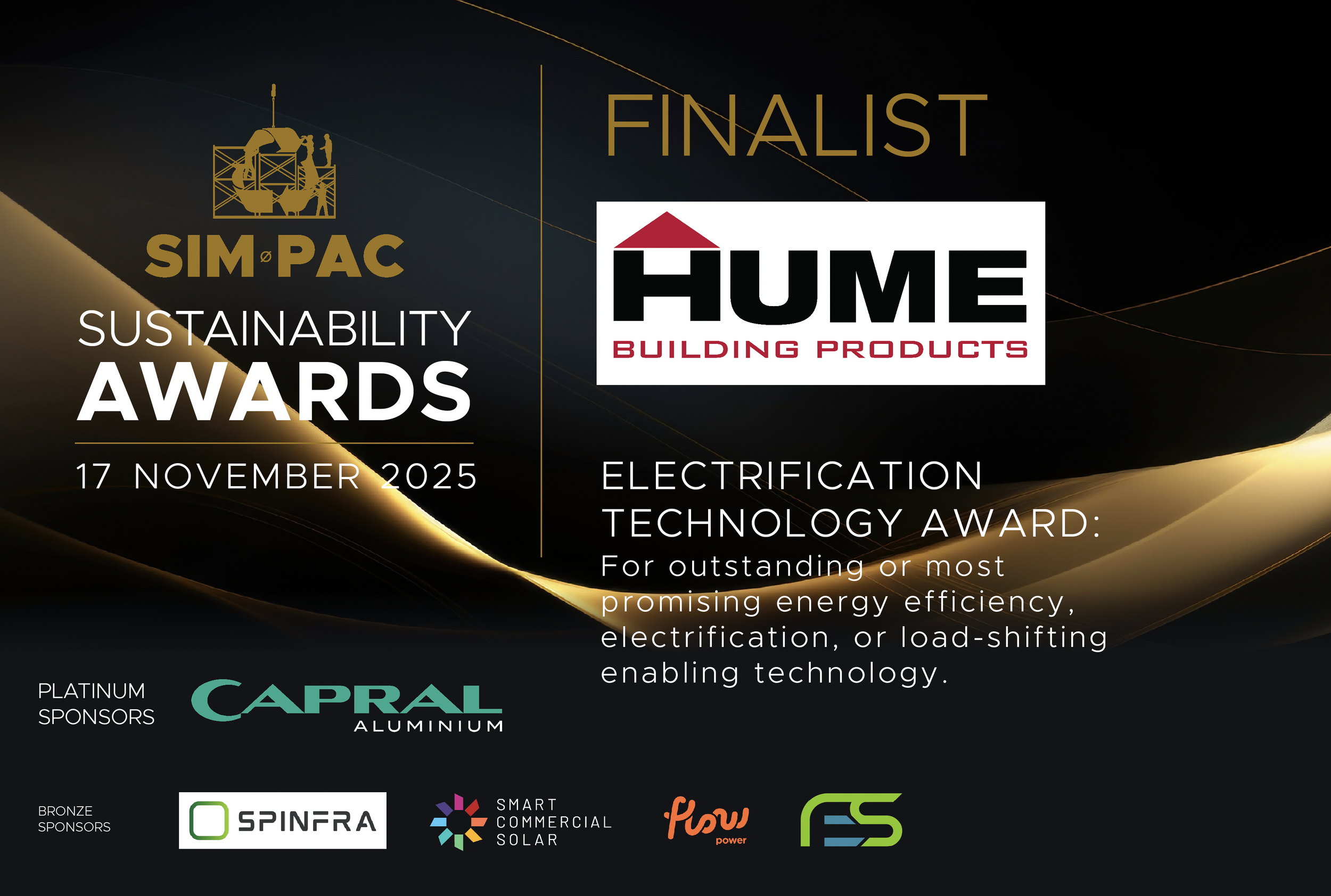
In the Lifecycle Design category, Hume is being recognised for its leadership in sustainable engineered timber systems — supplying circular, renewable, and low-carbon building materials that replace high-embodied-carbon alternatives in construction. Through precision manufacturing, renewable sourcing, design-for-disassembly, and end-of-life recyclability, Hume is demonstrating how material innovation can reduce embodied emissions and enable a more circular building industry. In the Electrification Technology category, Hume has been shortlisted for bringing Building-Integrated Photovoltaic (BIPV) solar glass to the Australian market — a next-generation façade technology that turns skylights, glass walls, and roofing into distributed clean-energy generators. By enabling energy production at the material level and proving real-world deployments with partners such as Smart Commercial Solar, Hume is accelerating electrification in the built environment.
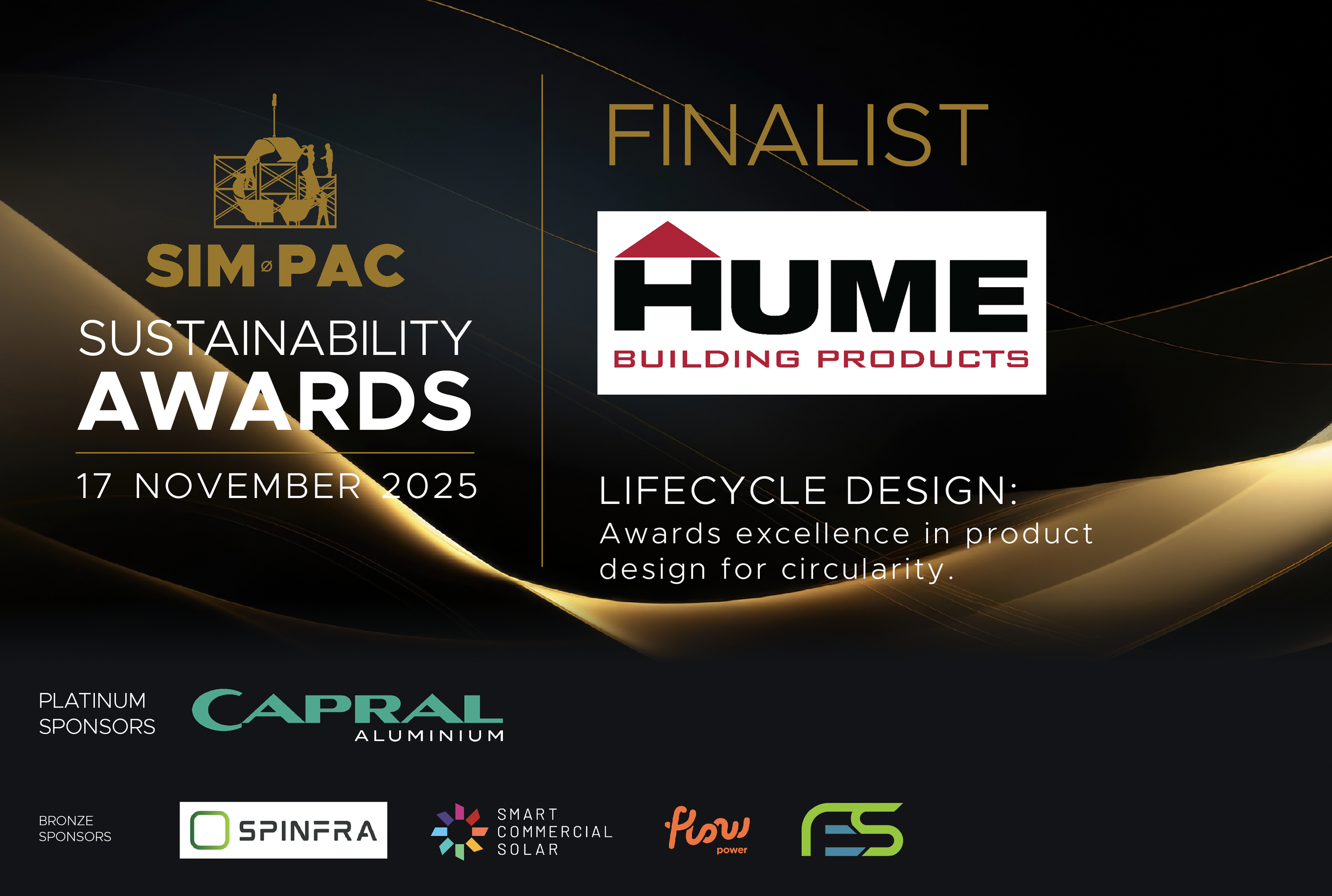
In the Lifecycle Design category, Hume is being recognised for its leadership in sustainable engineered timber systems — supplying circular, renewable, and low-carbon building materials that replace high-embodied-carbon alternatives in construction. Through precision manufacturing, renewable sourcing, design-for-disassembly, and end-of-life recyclability, Hume is demonstrating how material innovation can reduce embodied emissions and enable a more circular building industry. In the Electrification Technology category, Hume has been shortlisted for bringing Building-Integrated Photovoltaic (BIPV) solar glass to the Australian market — a next-generation façade technology that turns skylights, glass walls, and roofing into distributed clean-energy generators. By enabling energy production at the material level and proving real-world deployments with partners such as Smart Commercial Solar, Hume is accelerating electrification in the built environment.
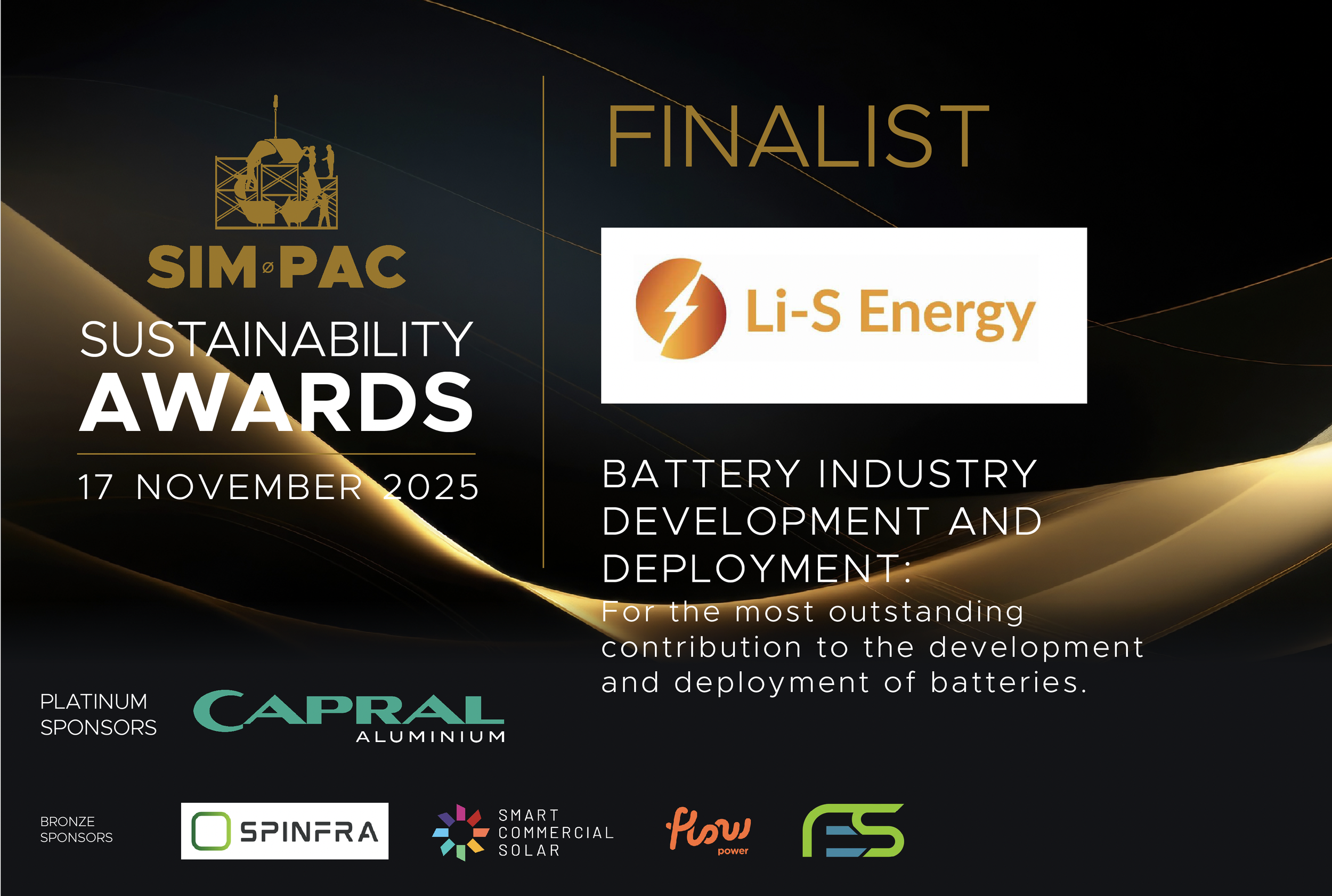
Li-S Energy is advancing Australia’s role in the global battery sector by developing next-generation lithium-sulfur and lithium-metal battery technologies for high-performance applications such as aerospace, UAVs, high-altitude platforms, defence systems, and advanced mobility. By combining novel chemistries with proprietary nanomaterials and progressing real-world integration projects from within Australia, Li-S Energy is not just participating in the battery transition — it is helping to develop the frontier of the industry for global markets.
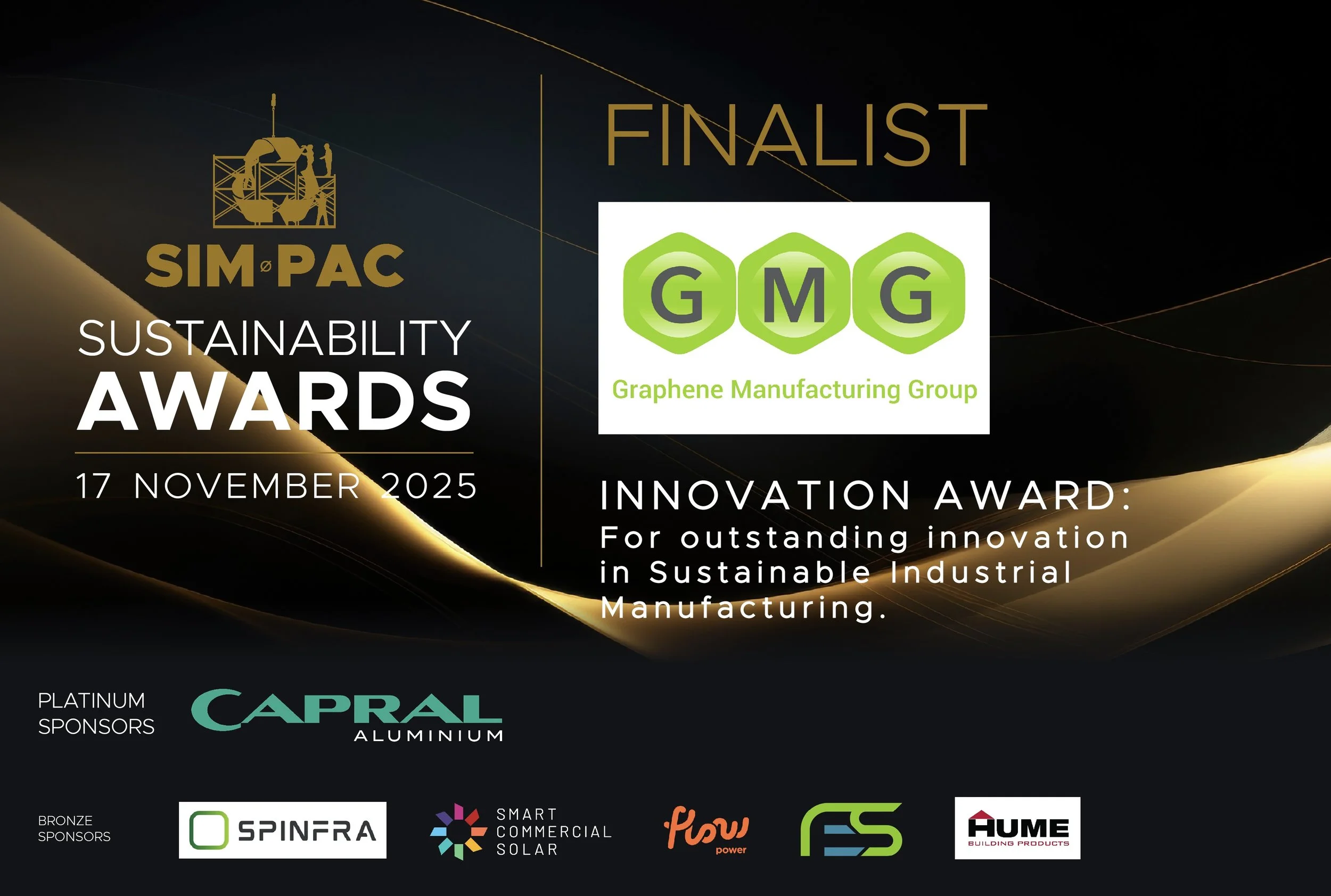
Through its integration of graphene and hydrogen production technologies, GMG is redefining what’s possible for sustainable manufacturing. Its proprietary plasma-based systems deliver measurable reductions in environmental impact while advancing the commercialisation of clean materials production at scale. This achievement highlights how industrial innovation can drive decarbonisation and strengthen Australia’s advanced manufacturing sector.
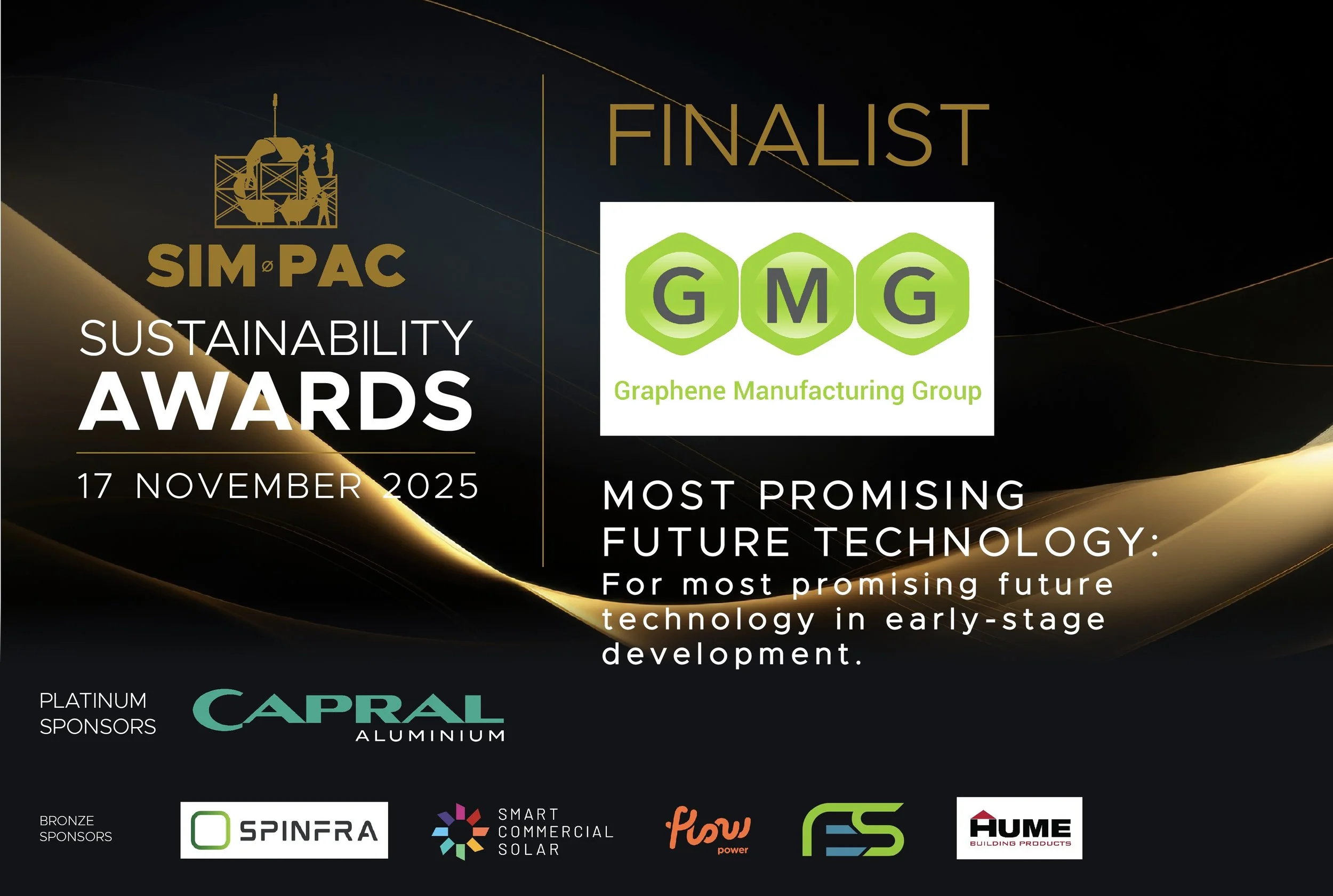
GMG’s Graphene Aluminium-Ion Battery (G+AI Battery) is being recognised for its transformative potential in the global energy storage industry. Delivering ultra-fast charging, high energy density, and enhanced safety through a clean, low-emission manufacturing process, this breakthrough represents a major step forward in sustainable energy technology.
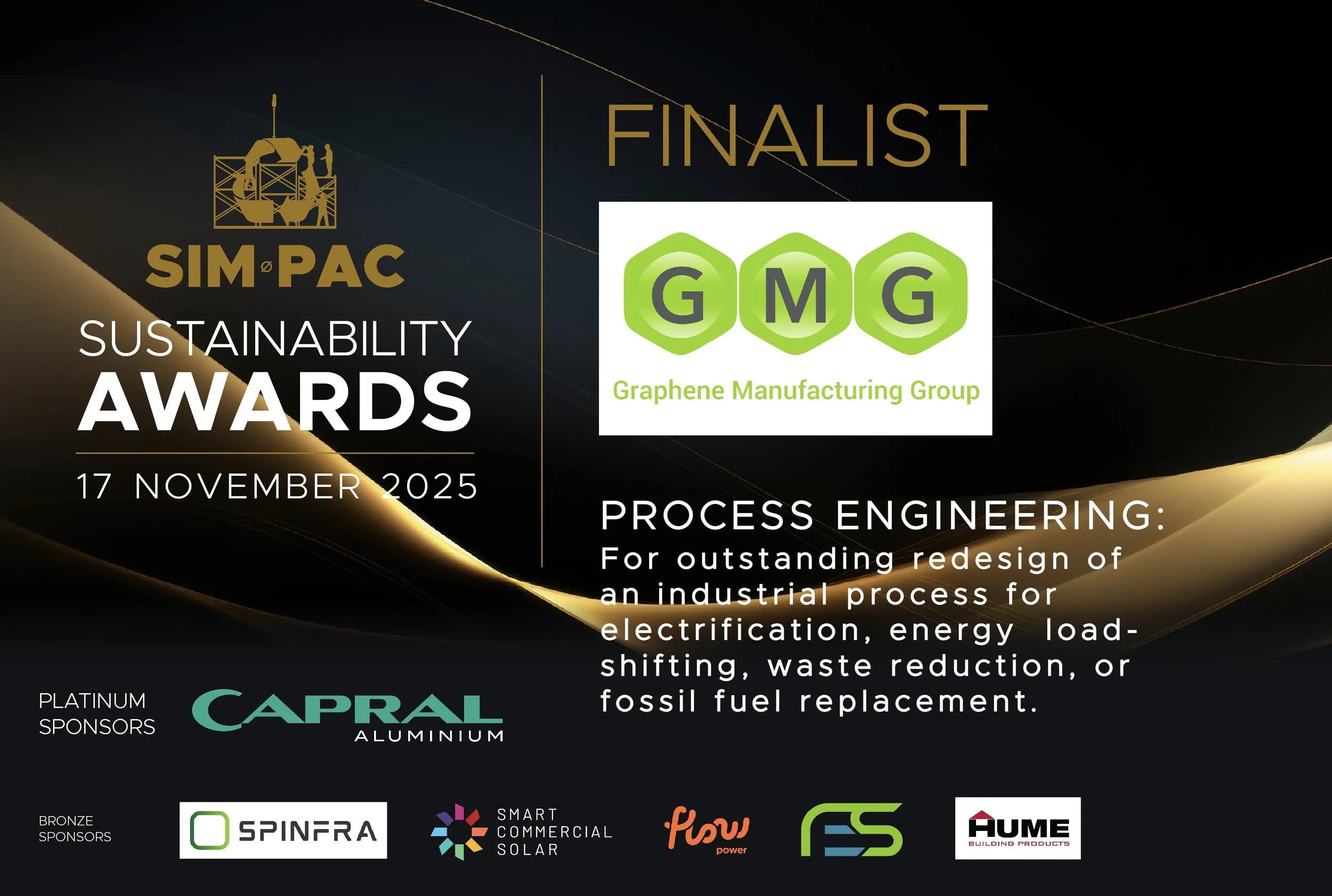
GMG’s innovative plasma-based graphene production process demonstrates a breakthrough in sustainable materials engineering — creating high-quality graphene from natural gas through a clean, low-emission process that eliminates the need for mined graphite. This world-first approach showcases how advanced process design can deliver technological innovation and measurable environmental performance.

We’re delighted to share that The Superpower Institute has been named a finalist in the Global Impact category at the 2025 SIM-PAC Live Sustainability Awards — recognising outstanding achievement in globally reducing emissions, waste or pollutants. Through a combination of open, auditable data platforms, evidence-based industrial strategy, and globally referenced policy thought-leadership, the Institute is shaping how nations plan, measure and execute decarbonisation. From Open Methane and Open Electricity, to export-scale pathways such as Green Iron, to submissions and analysis that influence both Australian and international climate decision-making, the Institute turns ideas, data and strategy into globally replicable emissions reduction systems. Congratulations to the Superpower Institute team and contributors for raising the standard of transparency, integrity and strategic ambition in climate action — not only in Australia, but globally.
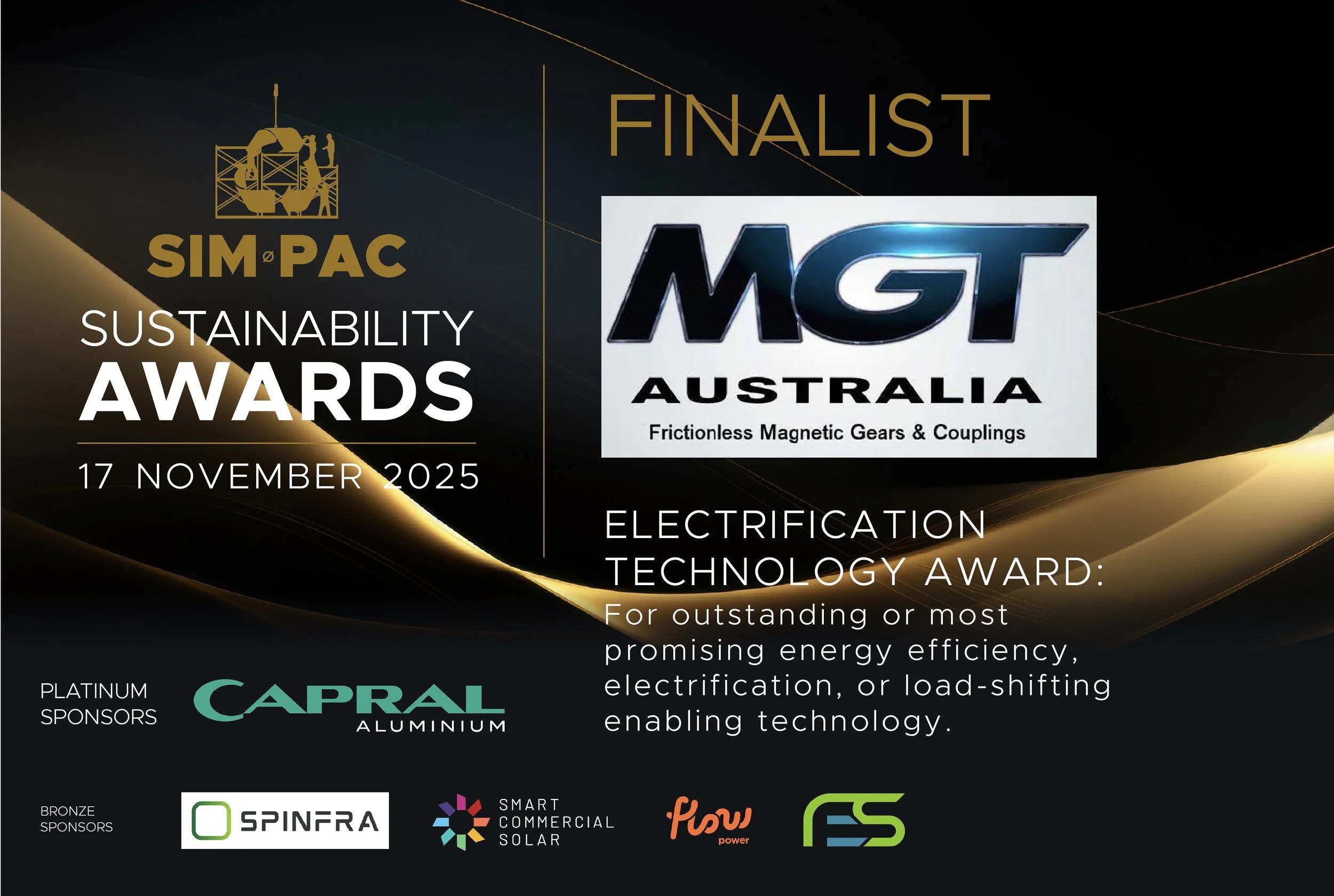
MGT’s frictionless magnetic transmissions eliminate mechanical contact, oil, wear and vibration — delivering near-lossless efficiency (~99.9%) even in multi-drive configurations and more than 22% improvement over conventional belt systems. With built-in slip protection, misalignment tolerance and zero maintenance requirements, the technology unlocks cleaner, longer-life electrified systems across sectors including pumping, manufacturing, remote assets and sterile environments.
APR Composites diverts post-consumer and post-industrial plastics from landfill and re-engineers them into durable products that replace timber, concrete and steel in infrastructure projects nationwide. Through its integrated model — spanning waste recovery, materials science and local manufacturing — APR demonstrates that recycled polymers can be a high-performance industrial feedstock. With deployments across Australia in civic, transport, industrial and environmental infrastructure, APR Composites is proving circular manufacturing at scale while delivering measurable carbon, waste and durability benefits in the real world.
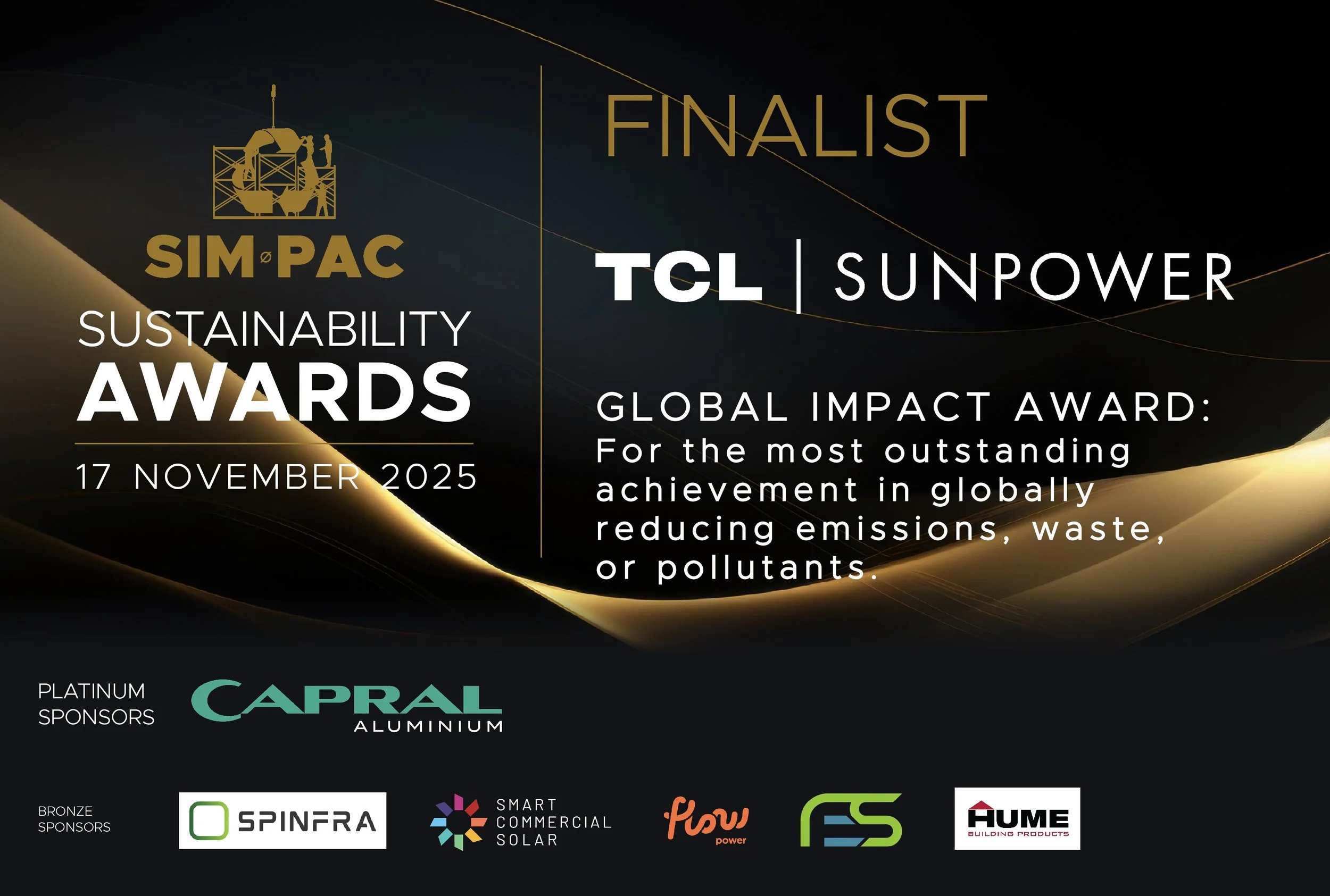
With more than five decades of combined R&D heritage and deployment across 120+ countries, TCL SunPower is accelerating the clean-energy transition through ultra-high-efficiency solar technology, circular-design principles, and responsible manufacturing. In 2024 alone, their self-owned solar power plants generated 696,388.90 MWh of renewable electricity — avoiding 5.037 million tonnes of CO₂, equivalent to planting 460 million trees globally. Through sustainable procurement (ISO 20400), water reuse, supply-chain decarbonisation, Cradle-to-Cradle module certification and 125.8 GW of global shipments, TCL SunPower is delivering measurable emissions reduction at planetary scale.

Although not a battery, SiBox® fills the long-duration gap in the storage landscape — complementing batteries rather than competing with them. By delivering industrial-grade heat where batteries cannot, SiBox® frees electrochemical storage for grid-balancing roles and increases renewable penetration in hard-to-abate sectors.
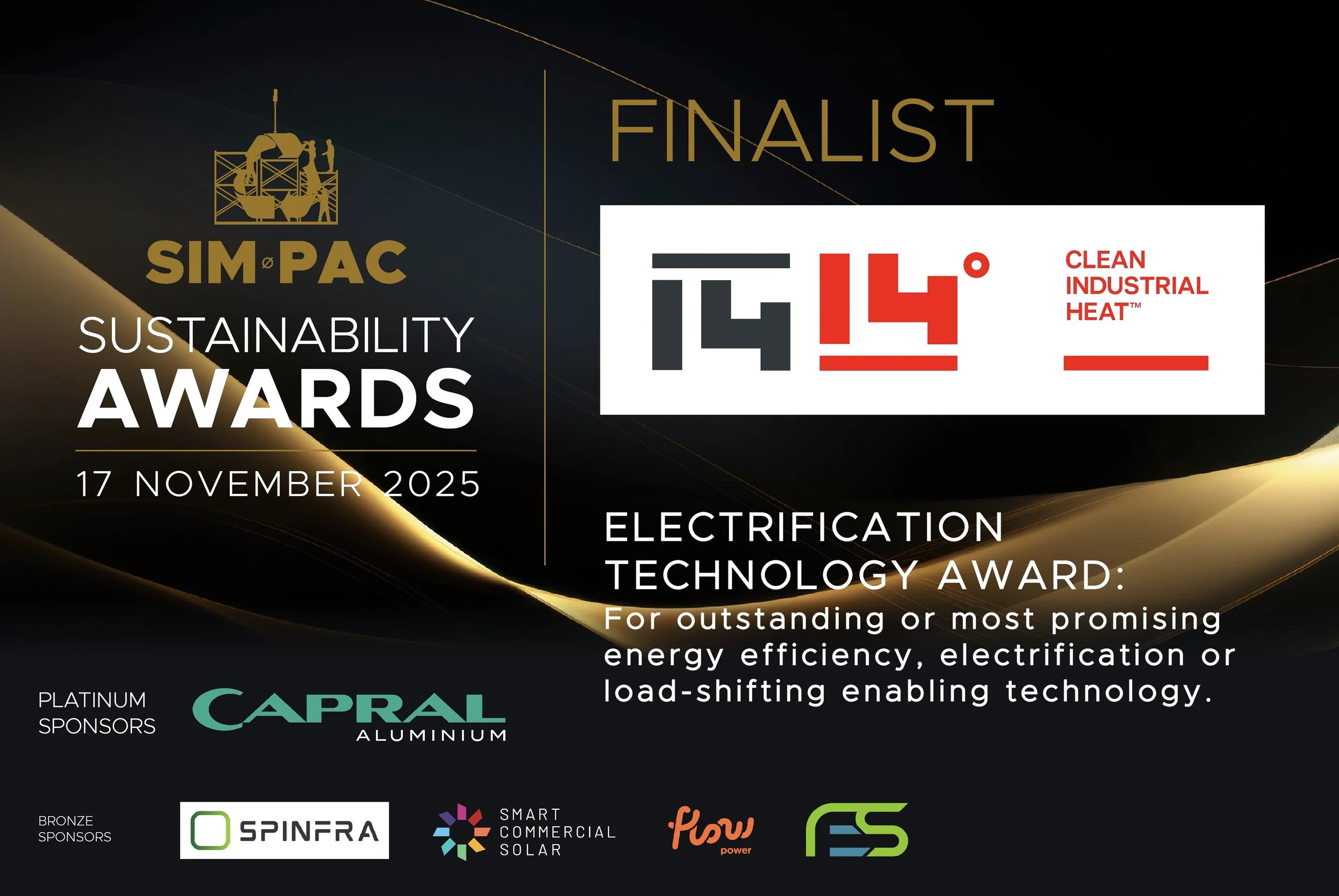
SiBox® enables the electrification of industrial heat — one of the largest remaining sources of global emissions. By capturing surplus renewable power and delivering controlled, on-demand clean heat, SiBox® allows existing facilities to replace gas and coal without major infrastructure change.
1414 Degrees is an Australian clean-tech company pioneering silicon-based thermal energy storage that turns surplus renewable electricity into reliable, high-temperature process heat—helping decarbonise hard-to-abate industries with flexible, dispatchable energy. SiBox® is a breakthrough in long-duration energy storage, designed to decarbonise heavy industry. Using our patented SiBrick™ modules, renewable electricity is stored internally at temperatures well above 1000 °C and dispatched as clean heat between 200 °C and 1000°C. Its modular, high-temperature design provides compact, scalable storage that can directly replace fossil fuels in industries such as cement, steel, food and chemicals. SiBox® delivers hours to days of reliable, low-cost heat at industrial scale.
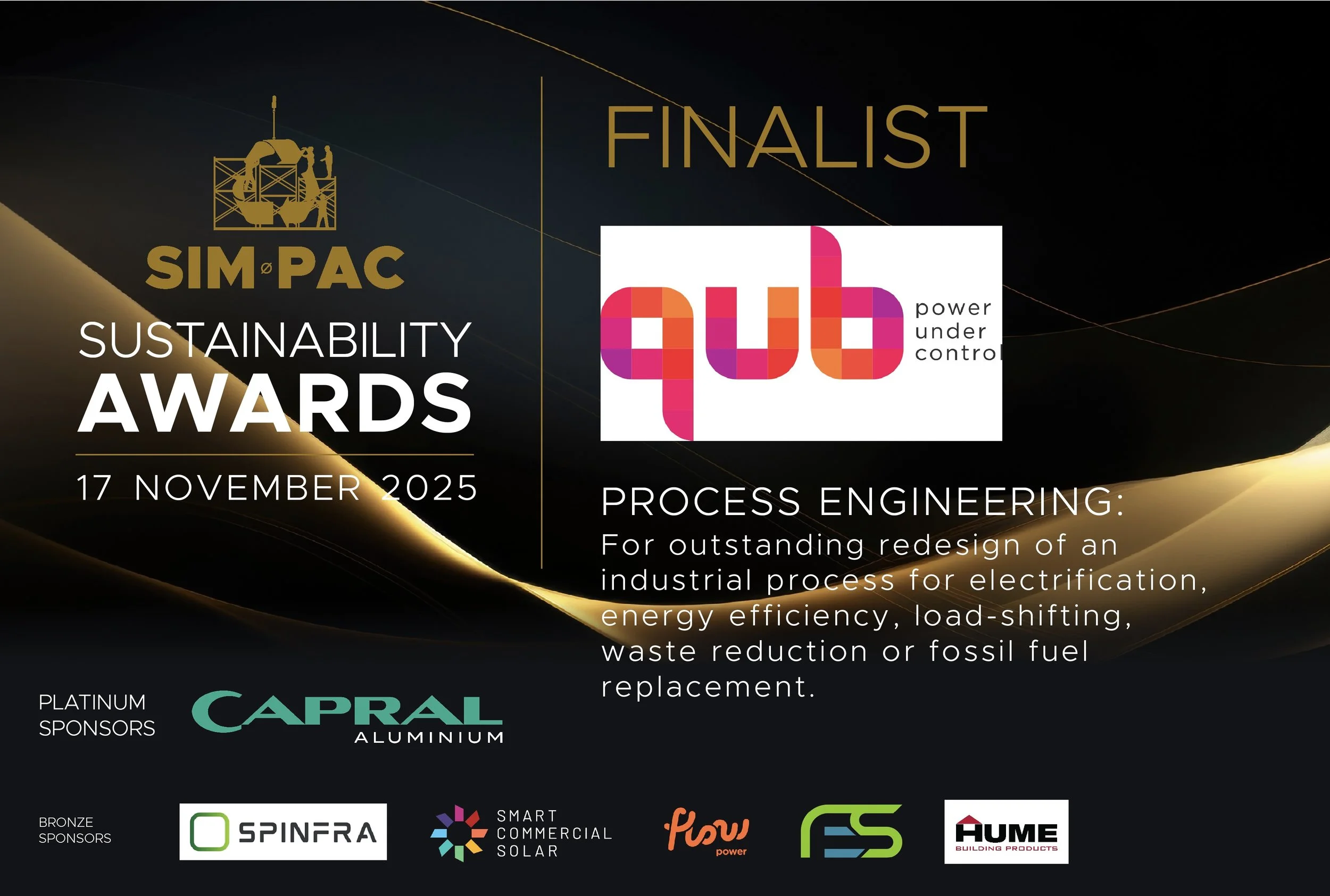
We are pleased to share that Qub Pty Ltd has been named a finalist in the Process Engineering category at the 2025 SIM-PAC Live Sustainability Awards — recognising excellence in redesigning industrial and municipal systems for energy efficiency and reliability. Qub delivers advanced process engineering solutions that reduce energy consumption, improve operational resilience, and enable load-shifting across critical infrastructure. From wastewater systems to municipal water assets and industrial metering projects, Qub embeds intelligent controls and electrification-ready design into the core of operations — delivering measurable sustainability gains for councils and businesses. Their work — including upgrades for Ceduna Council pumping systems, advanced CWMS automation for Tanunda, and innovative energy metering for TARAC — demonstrates that smart engineering can cut emissions, lower costs and extend asset life without compromising service performance.

We are pleased to share that LGI has been named a finalist in the Bioeconomy category at the 2025 SIM-PAC Live Sustainability Awards, recognising leadership in turning biological emissions into productive, investable low-carbon infrastructure. LGI develops and operates bioenergy assets that capture methane from landfills and convert it into renewable electricity and ACCUs — integrating biogenic energy into the National Electricity Market and the carbon market simultaneously. By transforming an unavoidable emission stream into dispatchable clean power and tradable carbon value, LGI is building national capability in the bioeconomy, not just participating in it. Their model reduces methane intensity, firms renewable supply, unlocks new revenue for councils and creates a replicable infrastructure pathway for biogenic carbon to displace fossil fuels at scale. Congratulations to the LGI team for demonstrating how bioenergy can function as real infrastructure and as a permanent component of Australia’s low-carbon economy.
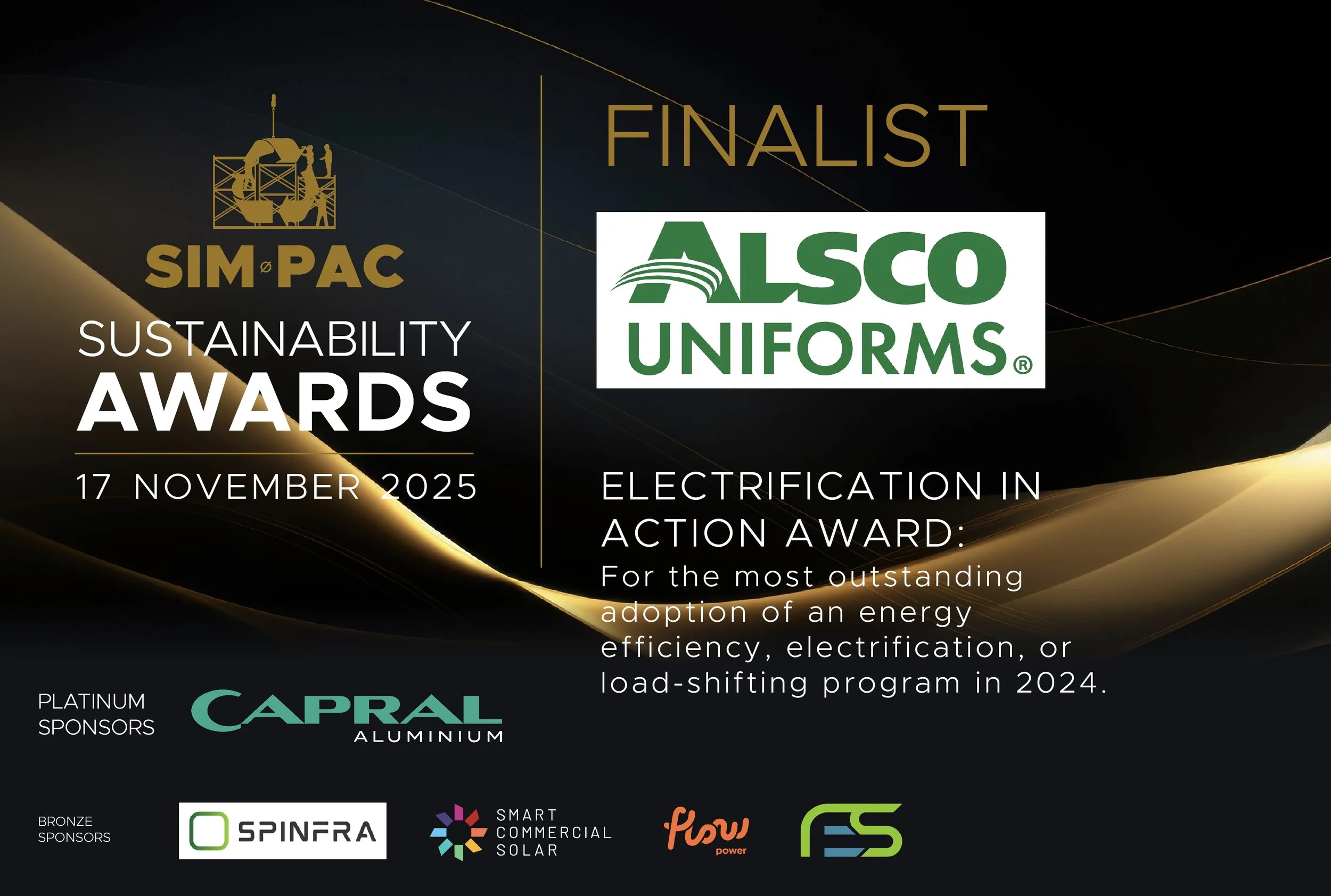
Through its Nationwide Energy Transition Program, Alsco is systematically phasing out fossil-fuel systems across its laundry network and replacing them with electrified, high-efficiency technologies — including industrial heat pumps, solar generation, and intelligent energy controls. The Salisbury (SA) facility now serves as an internal proof-of-concept site for this transition — demonstrating how electrification, heat recovery and smart demand management can decarbonise high-temperature industrial processes without compromising throughput or reliability.

We are pleased to announce that Hot Water Savings has been named a finalist in the Electrification in Action category at the 2025 SIM-PAC Live Sustainability Awards — recognising practical, real-world deployment of electrification solutions. Hot Water Savings enables small and medium enterprises to electrify one of their most significant energy loads — hot water — using data, benchmarking and transparent economics. By turning heat-pump upgrades into a measurable financial decision rather than a technical gamble, HWS removes the confidence barrier that has slowed one of the easiest decarbonisation steps for SMEs. Through its HydroSmart monitoring and analytics platform, HWS verifies performance after installation, shifts up to 80% of load away from peak periods, and gives small operators the same quality of energy intelligence normally reserved for large corporates — turning policy ambition into everyday practice for the businesses that make up the backbone of Australian industry. Congratulations to the Hot Water Savings team for enabling SME-scale electrification with the same data-rigour and confidence normally reserved for large industrial actors.
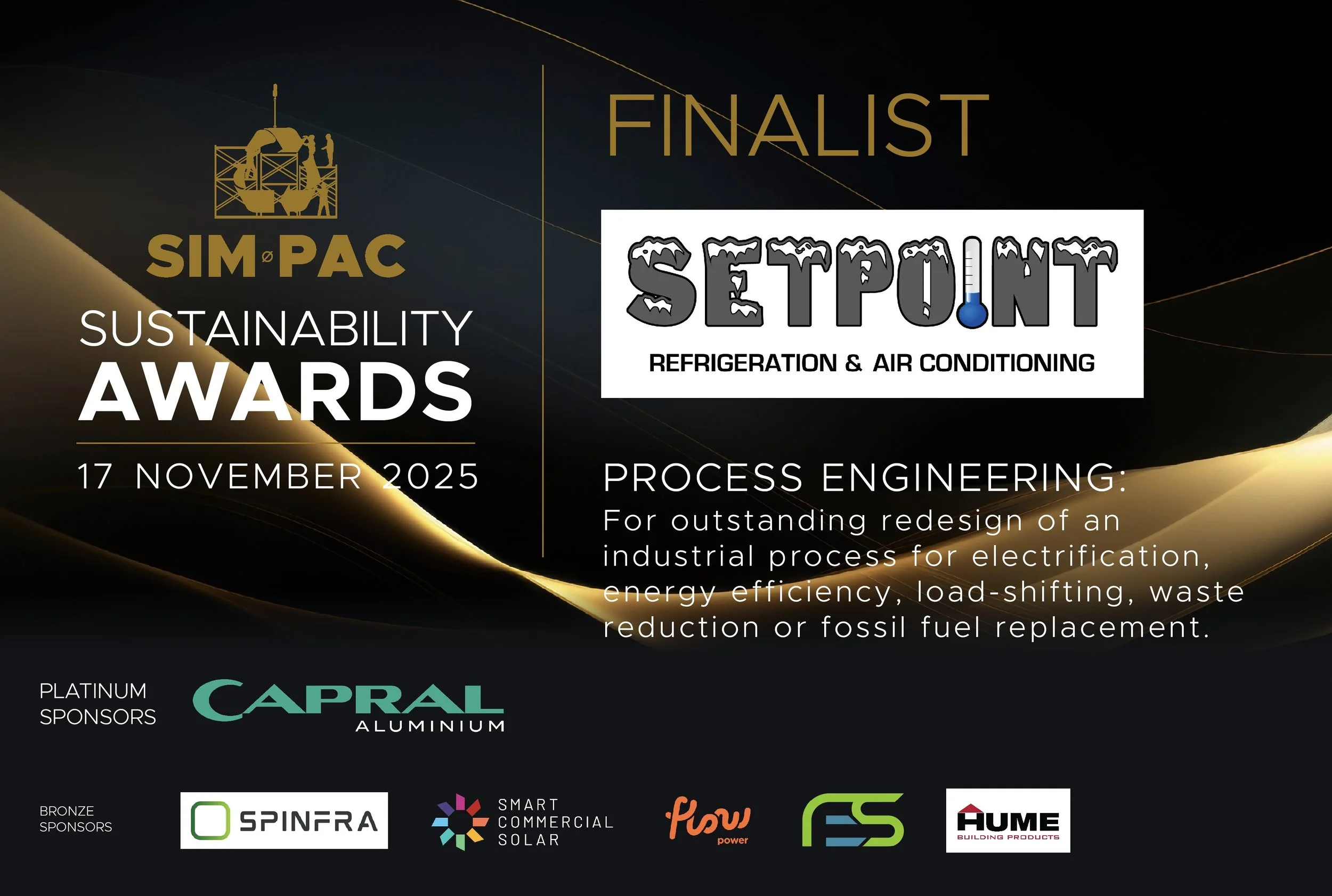
SetPoint is transforming refrigeration and HVAC in the food and beverage sector by embedding intelligent controls, waste-heat recovery, low-GWP refrigerants and circular-energy logic into existing facilities. At sites such as the Daniel Street Fish Market, SetPoint has demonstrated 20–40% energy savings, ~80% reduction in compressor peak demand and the elimination of separate water-heating systems through engineered heat reuse — proving that decarbonisation can enhance performance, not compromise it.
SIM-PAC Live awards information
Award Categories
SUPREME WINNER: For outstanding contribution to Sustainable Industrial Manufacturing for 2025.
GLOBAL IMPACT AWARD: For the most outstanding achievement in globally reducing emissions, waste, or pollutants.
COLLABORATION AWARD: Recognizes the synergistic effects of two or more entities collaborating on a single project.
BREAK-THROUGH SOLUTION: Recognizes the most promising solution or technology for decarbonizing hard-to-abate sectors.
INNOVATION AWARD: For outstanding innovation in Sustainable Industrial Manufacturing.
MOST PROMISING FUTURE TECHNOLOGY: For most promising future technology in early-stage development (TRL 1-3).
LIFECYCLE DESIGN: Awards excellence in product design for circularity.
PROCESS ENGINEERING: For outstanding redesign of an industrial process for electrification, energy efficiency, load-shifting, waste reduction, or fossil fuel replacement.
ELECTRIFICATION TECHNOLOGY AWARD: For outstanding or most promising energy efficiency, electrification, or load-shifting enabling technology.
ELECTRIFICATION IN ACTION AWARD: For the most outstanding adoption of an energy efficiency, electrification, or load-shifting program in 2024.
MANAGING WATER RESOURCES: Honoring efforts to reduce water usage, improve water management practices, and/or reduce contamination.
BIOECONOMY: Recognizing outstanding efforts in the advancement of the bioeconomy sector.
RESOURCE RECOVERY: Honors outstanding achievement in the recovery of waste resources.
CARBON SEQUESTRATION: Recognizing sequestration of carbon through natural processes.
MITIGATING THE EFFECTS OF MINING: Recognizing outstanding efforts to minimize the effects of mining and mineral processing on communities and the environment.
PRIMARY SECTOR SUSTAINABILITY AWARD: For the most outstanding contribution to sustainability in the primary sector.
BATTERY INDUSTRY DEVELOPMENT AND DEPLOYMENT: For the most outstanding contribution to the development and deployment of batteries.
RENEWABLE ENERGY DEVELOPMENT AND DEPLOYMENT: For the most outstanding contribution to the development and deployment of renewable energy.
BEST GOVERNMENT OR SOE INITIATIVE: Recognizing government’s role in achieving net-zero.
OUTSTANDING ESG/SDG/ZERO CARBON STRATEGY: Recognizing the role strategy and planning play in decarbonization and circularity efforts.
LOW EMISSIONS TRANSPORTATION: Recognizing outstanding contribution to the decarbonization of transportation.
SUSTAINABLE FOOD PRODUCTION: Recognizing outstanding contribution to sustainable food production.
SUSTAINABLE PACKAGING: Recognizing outstanding contribution to Sustainable Packaging.
Entry Details
Entries Close: 15 October 2025
Eligibility: Open to all individuals, companies, and organizations headquartered or operating in the Asia Pacific region.
Submission Format: One-page A4 or a maximum of four presentation slides, emailed to geoff@sim-pac.com.
Cost:
SIM-PAC Live Members: Free
Non-members: $750 plus GST
Awards Ceremony: 17 November 2025, 6:00 PM, Cellos Grand Room, Castlereagh Boutique Hotel, Sydney, Australia.
Tickets: $150 plus GST ($100 for SIM-PAC Live members).
Judging Panel
Joanna Kay: Program Director - International Strategy, Partnerships and Engagement, The Superpower Institute.
Dr. Mayuri Wijayasundara: CEO, Avanvarta.
Geoff Matthews: Founder, SIM-PAC Live Sustainability Awards.
Judges’ decisions are final. Additional information may be requested, and entries may be reassigned to other categories at the judges’ discretion.

